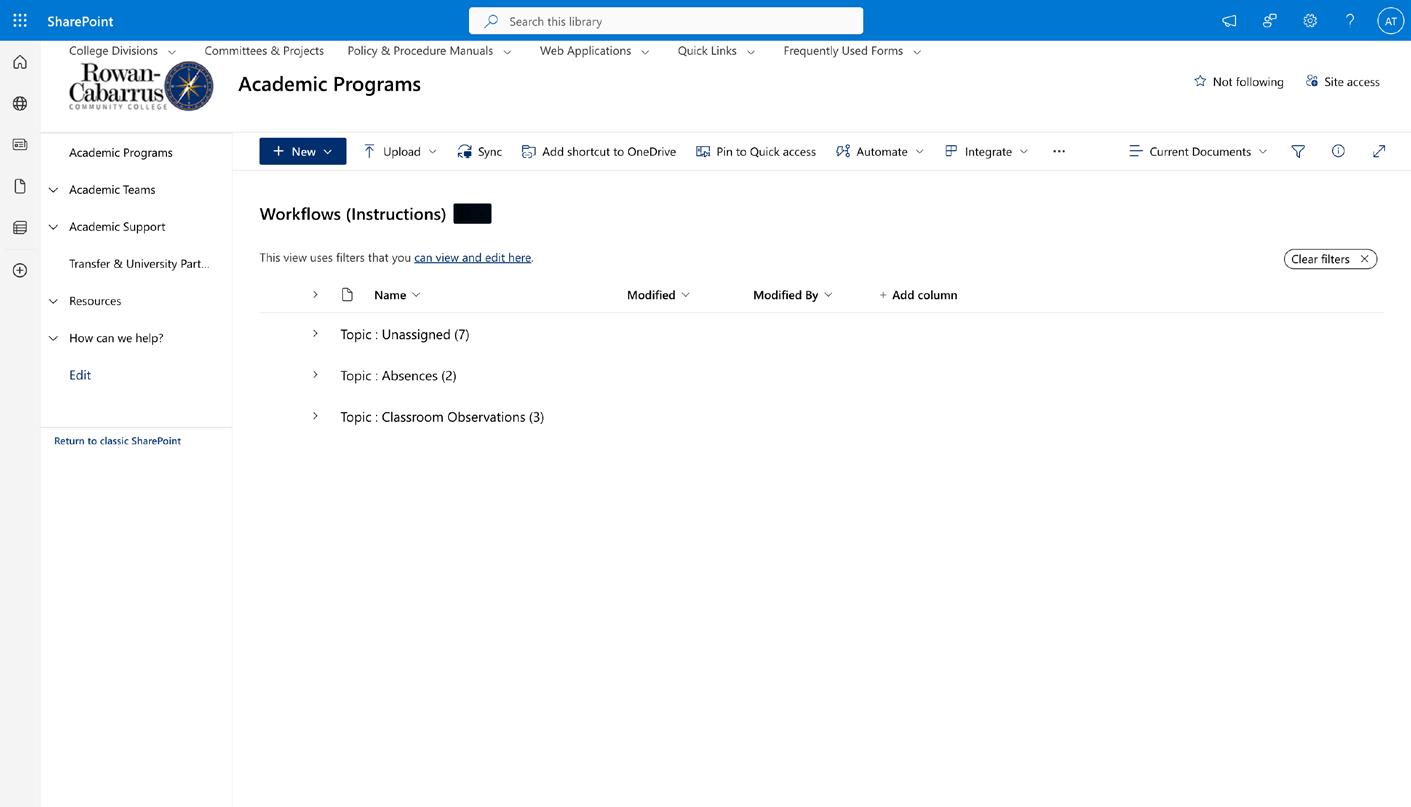2024-2025
Faculty Handbook
Welcome
We are glad you are part of the Rowan-Cabarrus team and welcome your voice, enthusiasm and willingness to educate our students . This Faculty Handbook is a comprehensive resource detailing policies, procedures, services and processes throughout the College . Its purpose is to assist faculty in fulfilling their roles and responsibilities at Rowan-Cabarrus.
Since 1963, Rowan-Cabarrus has provided the citizens of Rowan, Cabarrus and the surrounding counties with the education and training necessary to obtain employment in local industry and establishments Rowan-Cabarrus offers students fully accredited associate degree programs in more than 50 areas of study and provides students with a two-year college transfer pathway option to a four-year university, with many programs available entirely online In addition to degrees, Rowan-Cabarrus provides the community with a variety of accredited diploma and certificate programs, which focus on career and technical training, as well as continuing corporate education and adult basic education opportunities. The College also offers Career and College Promise (CCP) tracks for high school students as well as three Early College (EC) locations (North, South and CBTC campuses) .
Rowan-Cabarrus Community College is comprised of five campuses.
• Cabarrus Business and Technology Center (CBTC)
660 Concord Parkway North, Concord, NC 28027
• College Station
489 N Cannon Boulevard, Kannapolis, NC 28081
• North Campus
1333 Jake Alexander Boulevard South, Salisbury, NC 28144
• North Carolina Research Campus (NCRC)
399 Biotechnology Lane, Kannapolis, NC 28081
• South Campus
1531 Trinity Church Road, Concord, NC 28027
Rowan-Cabarrus Community College is tobacco-free The use of tobacco on campus property is prohibited by students, staff, faculty and visitors. The sale or free distribution of tobacco products, including merchandise, on campus or at College-sponsored events is prohibited . (All content links access information on the Rowan-Cabarrus website. This document features an appendix with referenced links, websites, documents and forms.)
Important Dates and Deadlines
All faculty should be aware of various essential dates and deadlines Below are links to events and activities on the College calendar . Please note that past events may not be displayed . However, you can adjust the settings to view both past and future dates .
• Academic Calendar (see Appendix A)
Note: The calendar includes general census dates (always refer to your Web Attendance roster for your class census date 0% point), faculty and student break days, faculty workdays, grade deadlines, holidays, term dates for courses, and graduation .
• Records and Registration (see Appendix B)
The Records and Registration site provides registration and drop/add dates for each term . It also provides the various withdrawal dates for each course term .
Academic Programs Structure
At Rowan-Cabarrus Community College, the Academic Programs division is led by the Vice President of Academic Programs This position oversees the entire academic operations, ensuring the highest standards of educational quality and institutional effectiveness.
Vice President of Academic Programs
• Role: The Vice President of Academic Programs is the chief academic officer responsible for setting academic policies, ensuring curriculum quality and leading strategic initiatives that promote academic excellence .
• Responsibilities: Oversee all academic departments and programs . Implement and assess academic policies and procedures . Ensure compliance with accreditation standards Facilitate faculty development and support .
Associate Academic Vice Presidents
• Role: Associate Academic Vice Presidents assist the Vice President of Academic Programs in overseeing specific academic areas or initiatives. They ensure the smooth implementation of academic policies and programs .
• Responsibilities:
Coordinate cross-departmental academic projects and initiatives
Support curriculum development and assessment . Assist in strategic planning and policy implementation Provid leadership in specialized academic areas such as research, accreditation or academic affairs.
Executive Director of Transfer Success & Higher Education Partnerships
• Role: Executive Director of Transfer Success & Higher Education Partnerships reports to the Academic Vice President and leads a variety of initiatives through the Academic Programs division and in partnership with other divisions of the College
• Responsibilities:
Oversee and manage the Faculty Mentor program . Establish and maintain collaborative relationships with higher education institutions for seamless student transfers and articulation agreements . Promote awareness and understanding of transfer policies, procedures and best practices among faculty, staff and administrators .
Engage with educational stakeholders to enhance transfer student support and success .
Academic Deans
• Role: Deans are responsible for managing their respective programs within the College . They report directly to the Vice President of Academic Programs and play a crucial role in maintaining academic standards and supporting faculty and student success .
• Responsibilities:
Lead academic planning and development within their programs
Oversee faculty recruitment, development and evaluation . Manage budgets and resources for their programs
Ensure academic programs meet institutional goals and standards
Dean’s Assistants
• Role: The Dean’s Assistants provide essential administrative support to the Dean and report directly to them They serve as a primary point of contact for students and faculty, handling inquiries, offering information, and facilitating communication between the Dean’s office and other departments .
• Responsibilities:
Provide support to the Dean with scheduling, correspondence, meeting preparation and daily office management.
Maintain and organize essential records, files and databases.
Assist in preparing reports, presentations and part-time faculty contracts
Aid in organizing and coordinating College events, workshops and meetings, ensuring logistical arrangements and necessary resources are managed effectively.
Program Chairs
• Role: Program Chairs oversee specific academic programs or disciplines within their departments . They report to the Deans and ensure the quality and relevance of their programs .
• Responsibilities:
Manage the day-to-day operations of their programs
Lead curriculum development and revision .
Supervise and evaluating program faculty
Ensure program alignment with institutional goals and accreditation standards
Program Leads
• Role: Program Leads support Program Chairs by handling specific tasks or areas within a program . They help ensure smooth program operations and quality instruction .
• Responsibilities:
Assist with curriculum development and assessment
Coordinate program activities and events .
Support faculty and student needs within the program .
Provide input on program improvements and innovations
Full-Time Faculty
• Role: Faculty are the core educators responsible for instructing, mentoring and engaging students They are the foundation of the academic experience for students .
• Responsibilities:
Develop and delivering high-quality instruction . Engage in current practice, trends and professional development . Support student mentoring, advising, registration and recruitment efforts as appropriate or required. Contribute to curriculum development and program assessment
Part-Time Faculty
• Role: Part-time faculty members are responsible for teaching and facilitating learning within their assigned academic disciplines . They play a critical role in delivering quality education and supporting the academic success of students
• Responsibilities: Deliver course content effectively and engage students in the learning process . Evaluate and grade student performance through assignments, exams and projects, providing timely and constructive feedback . Maintain high standards and adhere to College policies
This structured hierarchy ensures a collaborative approach to academic leadership, with clear communication channels and shared responsibilities aimed at fostering a dynamic and high-quality educational environment . Additional information about the organizational structure of the College and detailed descriptions of key academic personnel roles in the Academic Programs Division can be found in the Key Position Descriptions – Academic Programs document (see Appendix C) in the College’s Procedure Manual on SharePoint.
Employment Information
Benefits
In addition to competitive salaries, Rowan-Cabarrus offers Benefits (see Appendix D) such as a generous leave package and comprehensive and affordable insurance.
Employee ID
All employees are encouraged to wear their College-issued photo ID badge while on campus. The Human Resources (HR) office will issue a badge to all new full-time employees on their first day of employment. HR can issue badges during regular business hours, Monday through Friday, from 8 a .m . to 5 p.m. For part-time employees or those on campus after 5 p.m., photo services are available at the Navigation Station on either the North or South Campus .
Academic Freedom
Academic freedom is essential to the mission of Higher Education, which is to allow and promote free inquiry into questions and issues arising out of the Higher Education environment, including the past, the present and the future Rowan-Cabarrus believes in freedom of inquiry, freedom to teach, freedom to share and freedom to learn from others . The Board of Trustees encourages and protects academic freedom in the College . No faculty member shall be prohibited from nor disciplined as a result of the free exercise of academic freedom as defined below. The College will support all faculty against attempts to censor or diminish their academic freedoms .
Academic freedom is defined as follows: Faculty are entitled to freedom in the classroom to discuss their specific subject matter but they should not introduce into their teaching controversial matter which has no relation to their subject . Rowan-Cabarrus faculty are citizens of their county, state, and country, are members of an academic profession, and are employees of an educational institution When faculty speak or write as citizens, they should be free from institutional censorship or discipline . However, their special position in the community gives them special obligations . Faculty should remember that any verbal or written statement by them may be judged by the public as a reflection on the College and upon their profession as a whole . Faculty should at all times be accurate, should practice restraint and should show respect for the opinions of others . In particular, when speaking or writing as a citizen, faculty must make every effort to indicate that they are not speaking or acting on behalf of the College Whether in
the classroom, as an employee of the College or in the community as a private citizen, communications regarding the College, its policies and its employees should be professional in tone and content .
Complaint and Grievance Procedures
A complaint, as defined by the College is a written, formal expression of displeasure or dissatisfaction with some aspect of the College, an action taken by the College, employee/employer relations, conflicts with other employees, a perceived breach of College policy, etc Rowan-Cabarrus seeks to determine solutions to problems that may occur in the workplace and resolve Complaints in a prompt, fair and effective manner. Employees who are dissatisfied may bring issues and perceived problems forward following the procedures described in the Employee Due Process (see Appendix E)
A grievance, as defined, is unresolved complaints pertaining to the loss of compensation (summer contract reduction or elimination or loss of a position and compensation resulting from restructuring, reorganization or other organizational changes directly approved by Cabinet, are not applicable), Americans Disabilities Act, Sexual Harassment, and Civil or First Amendment Rights
For grievance complaints, any party named in the incident may request a hearing before the grievance committee if they are not satisfied with the result obtained. Requests for hearings must be filed with the College President using the grievance hearing request form available from Human Resources. The President will have five business days from their receipt of this request form to attempt to resolve the grievance and/or schedule a hearing before the grievance committee if this attempt proves unsuccessful Employees should reference the Employee Due Process procedure (see Appendix E) for further details .
Checklist for Newly Hired Faculty Members
This checklist is designed to provide newly hired faculty members with essential information, resources and support, facilitating a seamless integration into their new role and enabling them to contribute effectively to the College community . Although there is no required order for its completion, it is important to be aware that fulfilling these tasks can lead to an efficient and effective onboarding.
• Meet with Human Resources:
Receive a College-issued photo ID badge
Complete necessary employment paperwork (tax forms, benefits enrollment, etc )
• Meet with Program Chair:
Discuss teaching assignments, schedule, office hours and classroom location
Review Faculty Resource Center in Blackboard
Receive faculty handbook and departmental policies
Review academic policies, professional development requirements, OIC requirements, grading guidelines and student conduct policies .
Discuss procedures for EVA attendance and grading
Obtain textbooks or course materials .
Review curriculum and course materials
Discuss upcoming training sessions or workshops
Clarify performance expectations and goals for the semester .
Review Emergency Protocol
Meet fellow faculty members and administrative staff.
Tour campus facilities, including classrooms, offices and support services .
Locate office or cubicle.
Obtain office key where applicable.
Learn about campus amenities, such as the Library, Cafeteria, Beacon’s Nest and Navigation Station
Identify the location of the Adjunct Space where applicable .
• Information Services (IS) Technology Setup:
Receive login credentials for Internet access (email, phone, twofactor authentication, WebAdvisor, Blackboard, Navigate, SelfService, Employee Portal, etc .) from IS . IS sets up office computers and laptops and access online resources .
Class Records Management and Instructional Responsibilities
Enrollment Verification Assignment
All Rowan-Cabarrus classes will use the Enrollment Verification Assignment (EVA) to determine class membership . The EVA must be completed before the course’s census date for the student to remain enrolled in the course and be counted for FTE
Census Date / 10% Reporting
Census (also known as 10%) reporting is required by the North Carolina Community College System and is the foundation on which the College is funded for our annual budget . It is mandatory that all faculty accurately report attendance for all enrolled students For 10% Reporting, faculty must record each student’s Entry Date or record the student as a “No Show ” Instructions for Census-related reporting can be found in the “Instructions” section of the Faculty Resource Center site in Blackboard (see Appendix F) .
Important Reminders:
• All students in all classes must complete the EVA .
• Record EVA completion daily for all classes .
• Students who do not complete the EVA by the 10% (Census Date) are not allowed to remain in the class .
• Students not listed on the Self-Service Attendance or WebAdvisor roster are not allowed to remain in the class, as they are not registered .
• Log in to WebAdvisor to obtain the most current roster and to view the Census Date for the course Student registration impacts class rosters Therefore, it is crucial to check Self-Service regularly .
• Compare the Self-Service Attendance roster to the Blackboard roster Do not grant Blackboard access to a student until registration has been confirmed.
Submit a Jitbit ticket to IS Helpdesk for roster discrepancies, providing the course ID, section number and a description of the issue. Provide specific student details such as the student name, student ID (from the Self-Service roster) and/or Blackboard ID .
Faculty Absence Reporting
As instructed in the Faculty Absence Reporting document (see Appendix G), faculty absences that occur before the 10% point of the class must be covered by a substitute, while faculty absences that occur after the 10% point may be covered by an assignment posted on Blackboard if a substitute is not available . Please review the document for detailed instructions on contacting the College, the use of substitutes and outside assignments
For information on payment for substitute faculty, please refer to the Process for Substitute Pay document (see Appendix H)
Syllabi
All class syllabi are available online and can be printed from the computer as necessary Each class is provided with a Blackboard shell that includes a link to the syllabus . Faculty must update their syllabi before the class begins or as directed by the Chair . Detailed instructions for syllabus updates are available in the “Instructions” section of the Faculty Resource Center on Blackboard
Regular and Substantive Interaction (RSI)
Given the potential benefits of Regular and Substantive Interaction (RSI) on student engagement and persistence and that all Rowan-Cabarrus classes are offered in an eLearning format (Blended, Hybrid, HyFlex or Internet), all curriculum classes are expected to incorporate RSI standards into instructional practice The RSI Overview and Example Activities are available in the “Instructions” section of the Faculty Resource Center in Blackboard (see Appendix F) .
Class Meetings and Attendance
Faculty members are responsible for informing students of attendance requirements as stated in the course syllabus at the beginning of the academic term Faculty should submit accurate attendance records and utilize available communication and support tools to alert students and appropriate College staff of attendance and academic performance concerns .
All classes must meet during their scheduled time for the entire semester and should not be dismissed early. However, if students finish early on specific days like test days, they may leave but faculty must remain or provide notice of their location Cooperation with this ensures the College’s adherence to regulations and avoids citations in potential audits .
If a class is not meeting in the designated room, the faculty member is responsible for posting an announcement on Blackboard indicating the location change . The faculty member must also post a sign on the door indicating where the class is meeting .
Faculty Tardiness
If a faculty member is late for class, the class may be canceled if the faculty member does not arrive within a specified timeframe. Faculty should inform students of this at the start of the semester: a class may be canceled if the faculty member does not arrive within 15 minutes for every 50 minutes of the scheduled class .
Inclement Weather
Faculty are encouraged to verify and update their contact information in WebAdvisor to ensure they receive any weather-related communications from the College Faculty can stay informed about weather conditions through local media outlets and prepare accordingly . In case of inclement weather, the College will provide updates on operations through Campus Connect messages on the website at www rccc edu and on social media platforms Review the procedure for canceling classes due to inclement weather on the Faculty Resource Center in Blackboard .
Field Trips
Faculty will follow the Field Trip Procedure (see Appendix I) and complete the Field Trip Request form (see Appendix J) . Faculty are to provide announcements informing students of the location of the field trip. Classes containing EC and CCP students may require additional permissions Discuss field trips with the Program Chair before planning.
Withdrawals
Students are responsible for withdrawing from any class . Students may withdraw from a course until the 75% point of the term . The Vice President of Student Success Services will administratively withdraw students for purposes related to Student Conduct and Title IX Withdrawal requests are processed by staff within the Records Office. Faculty and students will be notified that a withdrawal has been processed. If a student withdraws from a course before the course start date or during the schedule adjustment period, neither the course registration nor withdrawal is recorded on the student’s transcript . If a student withdraws from a course after the census date of the course but before the withdrawal
deadline has concluded, the student will receive a grade of “W,” which will appear on the transcript This will not be considered as hours attempted in the student’s accumulated Grade-Point Average (GPA). Withdrawals after the withdrawal deadline are not permitted. The final grade earned based on coursework completed will be awarded and recorded on the student’s transcript See the Attendance and Withdrawal Procedure for Curriculum Courses (see Appendix K) in the Procedure Manual on SharePoint .
Final Exams
All classes will meet as usual for the entire term . There is no alternate schedule for finals. Finals will be given, at the faculty’s discretion, on one of the regular scheduled meeting days during the last week of the term If a faculty wishes to give a final exam that takes up more than one class meeting, the faculty may divide the final exam into parts during the regularly scheduled meeting days during the last week of the term . It is important to note that no matter when the final exam is given, all classes must meet as scheduled during the final week of the term.
Extra Credit
The use of extra credit is at the discretion of the faculty
Mid-Term Grades
Instructors are responsible for evaluating student performance and assigning mid-term course grades . All students listed on the class Grade Roster must receive a mid-term grade earned (see Grading Scale below) . Faculty are encouraged to inform students that mid-term grades are not a guarantee of passing or failing the class
Final Grades
The instructor is responsible for evaluating student performance and assigning end-of-course grades . All students listed on the class Grade Roster must receive a final grade earned (see Grading Scale below). When assigning a grade of “F,” “R” or “P,” the Last Day of Attendance must also be recorded within the Self-Service Attendance roster When recording an “L” on the class Self-Service Attendance Roster, the date will transfer to the Grade Roster . All Self-Service Attendance Rosters must be finalized at the end of the term. For instructions, please refer to the “Instructions” section of the Faculty Resource site in Blackboard (see Appendix F)
Grading Scale
Rowan-Cabarrus uses a 10-point grading scale, which is as follows:
• A = 90-100
• B = 80-89
• C = 70-79
• D = 60-69
• F = Less than 60
• R = Repeat (English/Reading and Math developmental courses only)
• P = Pass (English/Reading and Math developmental courses only)
• I = Incomplete
• W = Withdrawn
• CE = Credit by Examination
• AU = Audit (No Credit Earned)
Note: Some programs use a different grading scale due to licensing standards
Changing Grades
Faculty who have entered grades in Self-Service can initiate grade changes by submitting the Request for Change of Grade form to the Registrar’s office. (see Appendix L) .
Incomplete
A grade of Incomplete (Grade of I) should only be assigned to students who need extra time to complete the objectives of a course because of unusual circumstances (such as extended illness or hospitalization)
Overview of Incomplete Process
Faculty should discuss and review the Incomplete Policy with the Program Chair before initiating. After meeting with the Program Chair, the student and the instructor must agree via a contract before the end of the term, with all work to be completed no later than the contracted date or the end of the next academic term . The “I” is computed in the Grade Point Average as “0” quality points . However, when a student completes the provisions necessary for the removal of an “I,” the “I” will be removed from the student’s record and replaced by the grade earned. The affected GPA will then be recomputed using the grade earned . Failure to meet the provisions for removing the “I” will result in an “F” at the end of the next academic term . When a grade of Incomplete is assigned to a student, the Incomplete Grade Agreement Form (see Appendix M) must be completed and submitted to the
student, the appropriate program chair and Institutional Effectiveness. This form is necessary to comply with College policy and is available on the Office of the Registrar SharePoint site under Faculty Forms . Additional information can be found in the Rowan-Cabarrus catalog and Records & Registration (see Appendix B)
Course Delivery and Section Information
Instructional Delivery Methods
Rowan-Cabarrus supports a variety of instructional delivery methods . The methods utilized by Rowan-Cabarrus, the delivery method code for each and the definition (as established by the North Carolina Community College System and State Board Code 1B SBCCC 100.1 Definitions) are listed below.
Blended
A Blended course is one in which less than or equal to 50% of instruction is delivered online . Blended class sections primarily meet face-to-face on specified days and have a required online component, which requires students to have Internet access as part of the course Blended courses are designated in WebAdvisor by:
• a B at the end of the section identifier – Example: ART-111-100B .
• and a dual campus location, including both a Virtual Campus and an on-campus location .
Hybrid
A Hybrid course is one in which more than 50% but less than 100% of instruction is delivered online Hybrid class sections combine online learning with face-to-face instruction . All Hybrid courses will meet on campus on specified days. The remaining instruction and course content will be delivered as an Internet course . Hybrid courses are designated in WebAdvisor by:
• an H at the end of the section identifier – Example: ART-111-01H .
• and a dual campus location, including both a Virtual Campus and an on-campus location .
HyFlex
A HyFlex course is one in which 100% of the instruction is delivered faceto-face with the faculty member in a physical classroom while the course is also delivered online synchronously and/or asynchronously . Students may choose to attend online or in person, depending on what best meets their needs. Faculty should see the Department Chair for Program specifics. HyFlex courses are designated in WebAdvisor by:
• an F at the end of the section identifier – Example: ART-111-01F .
• and a dual campus location, including both a Virtual Campus and an on-campus location
Internet
An Internet course is one in which 100% of the instruction is delivered online Course communication, instruction, materials and assignments are completed online Internet students complete their courses without on-campus meetings . Internet courses are designated in WebAdvisor by:
• an N at the end of the section identifier – Example: ART-111-220N
• and a location of the Virtual Campus .
Course Offerings
The College offers a diverse range of courses throughout the academic year, enhancing scheduling flexibility and providing numerous options that accommodate diverse learning styles and scheduling preferences In Fall and Spring semesters, students can select from 16-week, 14-week and 8-week courses . Summer semesters include 8-week and 4-week courses . Classes are generally scheduled:
• Monday-Thursday: 7 a .m . to 11 p .m .
• Friday-Saturday: 8 a .m . to 5 p .m .
For more information, visit the Schedule of Courses (see Appendix N)
Course Section Numbers
Course Section numbers at Rowan-Cabarrus serve as unique identifiers for class sections, the delivery method, campus location and class schedule . For more information, visit Understanding Course Section Numbers (see Appendix O)
Faculty Expectations
Accommodating Students with Disabilities
The Office of Accessibility (see Appendix P) at Rowan-Cabarrus assists students with disabilities in achieving their educational and vocational goals. The Office of Accessibility has offices at North and South Campus, to make Rowan-Cabarrus accessible to all students Faculty should direct students to the Office of Accessibility’s web page for more information and to request accommodations .
Accommodations
Upon a student’s request for accommodation and a review of appropriate documentation, the student and an Office of Accessibility advisor will develop an accommodation plan in consultation with faculty as appropriate or necessary. The plan will outline specific accommodations or adjustments. These may include physical, testing, instructional, academic support and/or equipment accommodations .
• The accommodation plan must be reviewed and/or updated with each semester’s registration .
• Accommodations are not automatic and must be requested in advance
• Accommodations will not be granted retroactively .
• Accommodations must be reasonable; they cannot alter a fundamental standard or objective of a course .
• Rowan-Cabarrus does not provide services of a personal nature outside of the classroom . Arrangements for personal services are the student’s responsibility .
• All students are expected to comply with College policies and regulations as outlined in the Rowan-Cabarrus Catalog/Student Handbook .
Instructor Notification
Instructor notification is not automatic and must be initiated by the student every semester in a meeting with the Office of Accessibility. Following class registration, the student must request an accommodation notification through the Office of Accessibility. The accommodation notification will include all accommodations that the student has been approved for through the Office of Accessibility.
Faculty will be notified of the accommodation via email. Upon receiving the notification, faculty members will use the View Faculty Portal on the Office of Accessibility’s website (see Appendix P) to review and acknowledge
the accommodation. For more information, refer to the procedure Office of Accessibility – Services for Students (see Appendix Q) in the Procedure Manual in SharePoint .
Academic Advising
All full-time faculty are assigned advising responsibilities as Faculty Mentors . Advising will be provided to students through the student’s assigned Career and Academic Advisor and the assigned Faculty Mentor Faculty Mentors, under the direction of their Dean and/or Program Chair, provide insight to students on their program’s career outlook, mentor them on their future career goals, and provide insight into their program of study and the courses within their program . Faculty Mentors will provide employment information to students, including career growth, rate, salary expectations and career pathway options, as well as, where applicable, transfer information, including, but not limited to, information about fouryear institutions that offer degrees that align with the student’s academic and career goals, Transfer Guides that support the student’s transfer goals, and continual transfer mentoring throughout the student’s community college experience
All Faculty Mentors are responsible for maintaining knowledge of careers in their discipline area and the required training and credentials, as well as four-year transfer programs in their fields and knowledge of statewide transfer opportunities related to their programs . Note: For A .A . And A .S . faculty, this means working knowledge of the Comprehensive Articulation Agreement (CAA) and the UNC and NCICU institutions .
The Advisors and Mentors should be knowledgeable about the following: NCCCS Combined Course Library and Curriculum Standards; RowanCabarrus Community College Programs of Study; the NC Comprehensive Articulation Agreement (CAA), Uniform Articulation Agreement (UAA) and University Transfer Guides; and local Bilateral Articulation Agreements (BAA) on the Transfer Center website (see Appendix R) .
Advisors and Mentors are expected to continually work with their assigned students according to the guidance provided within the Career and Academic Advisor Handbook and the Faculty Mentor Guidebook .
Career and College Promise Students and Early College
Through Career & College Promise, qualified high school students in North Carolina have the opportunity to pursue dual enrollment options tuition-free, allowing them to get a jump start on career and college preparation . CCP includes three pathways:
• Career & Technical Education Pathway (CTE), which leads to a certificate or diploma aligned with a high school career cluster
• College Transfer Pathway (CTP), which requires the completion of at least 30 semester hours of transfer courses including English and mathematics
• Cooperative Innovative High School Programs (CIHSP)/Early College (EC) are located on North, South and CBTC campuses and provide opportunities for students to complete an associate degree program or earn up to two years of college credit within five years.
For more information, refer to the High School Programs (see Appendix S) website and consult your Program Chair .
Periodically faculty receive information from CCP and/or EC Liaisons regarding student progress in courses . CCP and EC are covered by FERPA . Consult your Chair for additional questions .
Code of Conduct & Handling of Disruptive Students
Rowan-Cabarrus Community College is committed to acting upon its authority and exercising its responsibility to provide a safe and welcoming climate where student growth occurs Action will be taken, consistent with the College’s Campus Code of Conduct, when a student’s or patron’s behavior disrupts, interferes with or threatens the teaching, learning, student support, safety or inclusive goals of the College .
All employees are responsible for taking appropriate action when observing violations committed by students and community patrons . This includes reporting observed violations that do not cease upon request, or that could be disruptive or detrimental to the reputation of the College
The College prohibits intentional obstruction or interruption of teaching, research, administration, disciplinary proceedings or other College activities, including public service functions and other duly authorized activities on College premises or at College-sponsored activity sites .
Handling of Disruptive Students
Charges that a student has violated behavior standards will be investigated by the Executive Director of the Office of Civility (or designee) to determine whether the charges are significant or whether they may be dropped or informally resolved Charges that a student has violated an academic standard will be investigated by the appropriate Academic Dean to determine if the charges are significant, and whether the charges will be dropped or informally resolved .
Procedures For Disciplinary Actions
• Charges: Any member of the College community may file charges with the Executive Director of the Office of Civility (or Dean in the case of Academic Integrity) against any student for violation of the College regulations The individual(s) making the charge must complete a charge form stating:
The name(s) of the student(s) involved
The alleged provision of the Campus Code of Conduct, College regulation and state or federal law violated .
The date, time and location of the incident .
The names of students or staff directly involved or who witnessed the infractions .
The actions taken by the complainant related to the incident
The desired solution(s) .
The completed charge form (written or electronic) with the printed name and signature of the person filing the charge should be forwarded directly to the Executive Director of the Office of Civility (or Dean). Reporting and Request Forms can be found on the Office of Civility website (see Appendix T).
• Investigation and Decision: Within five (5) business days after the charge is filed, the Executive Director of the Office of Civility (or Dean) shall complete a preliminary investigation of the charge and then schedule a meeting with the student(s) alleged to be in violation. After meeting with the student(s) to review the alleged infraction(s), one of the following actions will be taken:
Drop the charge(s) .
Impose a sanction consistent with those listed below
Refer the student(s) to a College Office or community agency for services
• Notifications: The decision of the Executive Director of the Office of Civility (or Dean) shall be presented to the student in writing or mailed within five (5) business days. In instances where the student cannot be reached to schedule an appointment or where the student refuses to cooperate, the Executive Director of the Office of Civility (or Dean) shall send a certified letter to the student’s last known address providing the student with a list of charges, the decision and instructions governing the appeals process .
Immediate Interim Suspension is a procedure that can be invoked by any College Official for any student who has been involved in conduct that threatens the health or well-being of any member of the College community or disrupts the function or good order of the College or College premises The College Official must advise the student that failure to cease and desist will result in immediate interim suspension . If the student fails to cease and desist, the College Official may invoke the interim suspension until disciplinary proceedings are completed. College Officials may contact College security officers to have the student removed from campus.
Once the interim suspension has been invoked by a College Official, a written report must be filed with the Executive Director of the Office of Civility . The report must detail the individual(s) involved and the nature of the infraction with supporting information, including other students or employees who observed the incident. The report must be filed immediately, but not more than two (2) working days after the incident. Incidents in the classroom should be reported to the program head and dean of the division by the instructor involved .
The Executive Director of the Office of Civility will notify the student in writing of the interim suspension and the reasons for the suspension . The notice will include a description of disciplinary procedures, including the time, date and location of any subsequent hearing The College will follow the procedural timeline outlined in a subsequent section to resolve the pending matter .
Interim suspension may result in continued exclusion (beyond the incident date) from class and/or other privileges, including presence on College property or College-sponsored activities until a final decision has been made concerning the alleged conduct violation .
Examples of Disciplinary Sanctions
Verbal Warning (reprimand): A verbal communication given to the student/patron by a College agent to cease a behavior or action deemed inappropriate or possibly a violation of the Campus Code of Conduct . The issuing College official should document the issuing of a verbal warning, including the incident and the student/patron’s name
Written Warning (reprimand): A written communication that gives official notice to the student/patron regarding the offense noted and that any subsequent offense of the Campus Code of Conduct will carry heavier penalties because of the prior infraction .
Interim Suspension: Exclusion from class or other privileges or activities as outlined in the notice until a final decision has been made concerning the alleged violation .
Faculty can refer to the Office of Civility website (see Appendix T) for more information on the Rowan-Cabarrus Campus Code of Conduct .
Classroom Observation
Class observations serve to support the professional development of faculty members and enhance teaching effectiveness and student learning outcomes. They provide a platform for self-reflection and generate insights for enhancing classroom practices Faculty evaluations are conducted annually, involving discussions between the faculty member and the Program Chair . Links to relevant documents are available on the Academic Programs Workflows Instructions site.
• Classroom Observation Form (see Appendix U)
• Online Observation Form (see Appendix V)
• Faculty Classroom Observations – Process (see Appendix W)
Committee Work Expectations
Full-time faculty members are required to allocate at least 5 hours per week to College service. For details on faculty or program-specific committees, faculty members should seek guidance from their Program Chair or Dean .
Communication
All Rowan-Cabarrus faculty members are issued a Rowan-Cabarrus email account. Official communications, notifications and instructions are exclusively sent to this designated Rowan-Cabarrus email address Students utilize this email address to communicate with faculty Faculty members are strongly encouraged to check their Rowan-Cabarrus email account daily .
Departmental Meetings
Department Meetings will be scheduled by Deans or Chairs and communicated through Rowan-Cabarrus email
Faculty Locator Sheet
The Faculty Locator Sheet contains the name, office location and office phone number of full-time faculty throughout the College . Each semester, Academic Programs will request this information from full-time faculty . It provides the College with your location in the event of an emergency (you are asked to supply your office hours, office number, class locations, etc.)
Intellectual Property and Copyright
Rowan-Cabarrus requires all employees and students to comply with state and federal laws applicable to copyright . Applicable copyright laws and license agreement provisions shall be observed with respect to the acquisition, use, production and distribution of protected materials in any format or medium in all Rowan-Cabarrus facilities
Employees and students are prohibited from copying materials not specifically allowed by:
• The Copyright law (including Fair Use, Teach Act and Digital Millennium Copyright Act guidelines)
• licenses or contractual agreements
• other permission
More information can be found on the Intellectual Property & Copyright Statement (see Appendix X) and the official Rowan-Cabarrus Intellectual Property & Copyright policy (see Appendix Y)
Keys
Keys are maintained by your Dean’s Assistant Please contact your Dean’s Assistant if you need a key to a classroom, lab or office. Upon leaving employment at the College, all faculty must return classroom and lab keys to the Program Chair or the Dean’s Assistant If you need access to your classroom/office without your key, contact Security at extension 7600.
Mailboxes
All full-time faculty members have an on-campus mailbox at their primary campus, where their office is located. Faculty who prefer to have their mail forwarded to an alternate campus should coordinate with the Dean’s Assistant . Administrative mail will be delivered to faculty campus mailboxes .
Part-time faculty will receive mail via their Chair Faculty should coordinate with their Dean’s Assistant/Program Chair if additional arrangements are needed .
Office Hours
Full-time faculty members will schedule a minimum of five hours per week when they will be available in their offices. (These hours should be at times that are reasonable for access by students and for conducting College business.) Faculty members will post office hours in their syllabi. If a faculty member must be away through necessity from their office during scheduled office hours, a note should be posted in the Learning Management System (Blackboard). Other than office hours, full-time faculty members will spend five additional hours per week on campus to accommodate some of the other duties required of full-time faculty .
Part-time faculty are not required to hold office hours. However, part-time faculty should be available for students either on campus or virtually (for example, Microsoft Teams).
Office Space
Office space availability may vary annually, and designated offices are reserved for full-time faculty Program Chairs will update faculty on workspace options across campuses To maintain security, faculty should avoid leaving tests or confidential documents in classrooms, workrooms or open office areas like cubicles. When not at their computers, faculty should lock their screens During student meetings, ensure only relevant student information is visible to comply with FERPA guidelines Faculty with open cubicle offices can utilize empty conference rooms or classrooms for private student meetings .
Printer Usage
Rowan-Cabarrus promotes environmental responsibility by encouraging faculty to reduce printer and copier usage Faculty are encouraged to post review sheets, worksheets and handouts on Blackboard for download and printing convenience . Faculty can utilize their Employee ID badge or Employee Number at designated campus printers for copying and printing needs For any printing issues, faculty should submit a Jitbit ticket (see Appendix Z) .
Professional Development
Faculty are required to maintain currency in their field and profession. This includes completing 30 hours of professional development annually, with 10 hours directly related to instructional practices . Rowan-Cabarrus offers a variety of training sessions on classroom management, advising, instructional methods, learning technologies and organizational development . For details on mandatory professional development, please refer to HR’s SharePoint page .
Student Evaluation of Instruction
Each fall and spring semester, all curriculum classes are evaluated . Evaluations are deployed within the last ten days of each term and are available to all students via Blackboard . The goal for each course is to achieve 75% or higher student participation . Faculty should monitor response rates and encourage student participation in the evaluation process Student responses are anonymous
Completed evaluations are made available to the Academic Deans, Program Chairs and faculty for review following the end of the term . The evaluations should be reviewed and utilized as an effective tool for providing feedback to faculty and/or to help improve instruction . Faculty are encouraged to utilize feedback to make continual enhancements to instructional delivery as appropriate .
The student evaluation of instruction becomes a part of the individual faculty member’s documented performance evaluation . At the end of each semester, faculty are encouraged to download PDF copies of student evaluations for later inclusion in their performance evaluation documentation .
More information on Student Evaluation of Instructions (see Appendix AA) can be found in the College’s Procedure Manual on SharePoint
Supplies
A supply room is available on each campus for classroom supplies such as whiteboard markers, pens and folders For items not available in the supply room, please see your Program Chair .
Textbook
Chairs are responsible for obtaining the desk copy of the textbook for the class(es) you are teaching . If you would like to add supplemental readings, please contact your Program Chair for further instruction .
Academic Semester Checklist
Before Semester Begins
• Prepare syllabi for all courses Include contact information, course schedule, course policy, book information and RSI statement Send Syllabi to the Program Chair for review .
• Update course materials on Blackboard or other learning management systems . Use the Self-Review checklist to ensure that the course is ready for the first day of the semester.
• Set up office hours and communicate them to the Program Chair and Dean’s Assistant .
• Attend any required faculty orientation or meetings . Beginning of the Semester
• Track and Record EVA attendance daily
• Certify Census .
• Faculty Mentor – welcome emails are sent to Faculty Mentees.
Middle of Semester
• Hold office hours and meet with students as needed for academic support .
• Monitor student progress and address any issues promptly
• Create Early Alerts in Navigate Staff or SOS through the Employee Portal.
• Submit wellness center referrals where applicable .
• Submit Mid-term grades
• Complete EC or CCP mid-term performance checks on specified students.
• Email Early College Liaisons for underperforming students .
• Faculty Mentor sends mid-semester emails to Faculty Mentees as per the Faculty Mentor Guidebook
• Continue Committee work where applicable .
End of the Semester
• Submit final grades noting the last date of attendance when flagged by Self-Serve (WebAdvisor) . Submit grades before 8 a m on the day grades are due
• Complete the General Education rubric where applicable .
• Faculty Mentor sends end-of-semester emails to Faculty Mentees as per the Faculty Mentor Guidebook .
• Be available until you receive an all-clear from the Dean’s Assistant or Program Chair .
Policies & Procedures
The College’s Policy and Procedure Manuals are available in SharePoint . Below are several procedures that are commonly referenced or reviewed by faculty These procedures and faculty responsibilities are further explained in relevant sections of the Faculty Handbook .
• Accessibility
• Due Process
• Confidentiality and Access to Student Records
• Family Educational Rights and Privacy Act, or FERPA
• Intellectual Property and Copyright
• Title IX
• Transferring Sections
• Withdrawal Policy
The sections below provide additional Academic Program policies, which can be viewed in the College’s Policy Manual (see Appendix AB) .
• Chapter D - Education Programs
• Chapter B – College Operations
The sections below contain Academic Program procedures that are available for viewing in the College’s Procedures Manual (see Appendix AC) . Chapter B – College Operations includes a subsection dedicated to Student Services, which outlines important procedures for both faculty and students
• Chapter B – College Operations
• Chapter C – Human Resources
Faculty should also review the College policies and procedures included in all Curriculum class syllabi, which are accessed and edited through your Blackboard class site(s) .
eLearning
Rowan-Cabarrus Community College’s eLearning courses allow students to participate in learning outside of the traditional classroom . The College offers over 250 online courses, enabling students to earn online degrees, diplomas and certificates.
The Department of eLearning and Faculty Development Services’ goal is to provide students greater flexibility in scheduling classes while providing Rowan-Cabarrus faculty with new and innovative approaches to teaching .
Department of eLearning and Faculty Development Services
The Department of eLearning and Faculty Development Services (see Appendix AD) is responsible for the Online Instructor Certification, faculty training related to online learning (technical and andragogy), as well as coordinating online course shell templates for all within the College’s Learning Management System To ensure consistency in content delivery, the Delivery of eLearning Advisory Council (DEAC) and academic administrators provide guidance and approval of eLearning course delivery standards . Standards are implemented when approved by the DEAC, Academic Deans, Vice President, Academic Programs and Associate Vice-President of Academic Support
Learning Opportunities
• New Faculty Foundations is a concise, self-paced workshop that offers an overview of the College, system access information, acronyms and other essential details . The course is designed to take approximately 2-4 hours to complete
• Online Instructor Certification (OIC) Course is an 8-week rigorous course designed to provide faculty with the knowledge and skills needed to deliver a high-quality internet, hyflex or hybrid course. Successful participants will also be able to teach effectively online through active facilitation and a variety of student engagement techniques and technologies . The OIC is designed to familiarize faculty with the many features available in Blackboard and provide suggestions for implementing best practices in online teaching and learning . In addition to gaining hands-on design experience, faculty will explore key ideas and practices associated with teaching online . It is much more than “Blackboard training,” as it includes elements of instructional design and strategies for building, developing, sequencing and delivering online content . Upon completion, faculty will have a template
for their course. Instructors must renew their certification every three years or when major platform updates occur Recertifying instructors now have options for completing their certification through the OIC.
• OIC Pathways is designed to recertify online and hybrid instructors while accommodating the diverse schedules, technological proficiency and background knowledge of Rowan-Cabarrus Community College’s faculty . This program allows instructors to review key elements of the Online Instructor Certification course and access updated information. Faculty can select sessions that align with their individual goals, offering a tailored recertification experience with greater flexibility and control over their learning journey .
• Blackboard Essentials is a fully online, self-paced workshop that provides an overview of Blackboard functionality and course design basics and covers EVA settings and reporting
• Workshops are tailored to enhancing your educational technology expertise . Faculty can locate the workshop schedule and learn more about all learning opportunities in the Faculty Resource Center
To enroll or for specific questions about OIC, Blackboard Essentials or Workshops, faculty should contact oic@rccc.edu (see Appendix AE)
Course Design Standards
eLearning standards are established based on input from a variety of sources, including, but not limited to, guidelines and/or best practice documentation from the Southern Association of Colleges and Schools Commission on Colleges (SACSCOC), best practice documentation from Distance Education consortiums, journals and organizations, such as Quality Matters, suggestions made by Rowan-Cabarrus faculty, the Delivery of eLearning Advisory Council (DEAC), program chairs, academic deans, and input and/or examples from the North Carolina Community College System .
• Course Template - Regardless of delivery method, all course sections receive a Blackboard course shell designed from a standardized delivery template containing Rowan-Cabarrus-specific content. Instructors are expected to include all required elements as detailed in the course delivery template .
• Course Timelines - Before the start of each semester, faculty can find the course timeline for blackboard course shells in the Faculty Resource Center: Visit Blackboard > Organizations > Faculty Resource Center > Course Timelines
• Enrollment Verification Assignment - All Rowan-Cabarrus classes will use the Enrollment Verification Assignment (EVA) to determine class
membership The EVA must be completed before the course’s census date for the student to remain enrolled in the course and be counted for FTE .
• Accessibility - All faculty are responsible for ensuring their Blackboard course shells (and other online components) are accessible to all students regardless of ability . While Blackboard is an ADA-compliant learning management system, this does not guarantee that the content uploaded will be ADA-compliant Faculty are advised on the following suggestions:
Provide text transcripts of all audio and video components included in the course – many resources are closed-captioned.
Use white backgrounds for better color contrast and readability
Avoid pastels and color combinations because they are unreadable to people with color blindness and other visual disorders . Background graphics, such as watermarks, hinder readability, are not compatible with screen readers and delay page loading times
Avoid red and green color combinations because they are indistinguishable for color-blind readers
For additional information on accessibility at Rowan-Cabarrus faculty can review the accessibility information provided in the Faculty Resource Center Visit Blackboard > Organizations > Faculty Resource Center > Instructions > How Do I? > Accessibility and ADA Compliance or visit the Office of Accessibility (see Appendix P) .
Course Review Process
Each semester, the Department of eLearning and Faculty Development Services conducts a review of a randomly selected group of newly certified online instructors who are teaching Internet, Hybrid or Hyflex courses. This review evaluates course design and adherence to template standards . Program Chairs are responsible for reviewing instructional content, assessments and alignment with learning objectives . Results from the course review are shared with both the faculty and program chairs, and a summary report is provided to the Program Chairs . This process is designed to offer constructive feedback to instructors new to teaching at Rowan-Cabarrus .
eLearning Support Resources
• The Faculty Resource Center serves as a hub of resources to support faculty members. It offers detailed course timelines, including information on Blackboard course and syllabus availability, important review dates, and deadlines for Enrollment Verification Assignments (EVAs) . There are also thorough instructions covering academic processes such as attendance and grading, Blackboard navigation, and usage of the Online Bookstore . Additionally, the site links valuable resources like the Faculty Handbook, professional development materials and library resources .
• The Department of eLearning staff is available to assist faculty with questions or concerns related to accessibility tools, course design, Enrollment Verification Assignments (EVAs) and adaptive release, blackboard training, educational technology workshops, course reviews, course shells, master course templates, Online Instructor Certification (OIC), Quality Matters (QM), student evaluation on instruction survey deployment, concourse, e-text or publisher content access, textbook integration, LMS integrated eLearning tools, and non-integrated eLearning tools . Please contact the Department of eLearning at eLearning@rccc.edu (see Appendix AF) .
• For Blackboard access issues, faculty should submit a Jitbit ticket to the IS Helpdesk .
Support Resources for Faculty and Students
Extension 7600
Faculty should call extension 7600 after 5 p.m. for assistance with issues such as locked doors and the need for Campus Security . In the event of an emergency, dial 911
Bookstore
Rowan-Cabarrus has partnered with Akademos as the Online bookstore Visit the Online Bookstore (see Appendix AG) to learn more
Instructional Resources for Faculty
In Blackboard, all faculty have access to the Faculty Resource Center, a comprehensive guide for developing course content, utilizing educational tools and engaging with students . This resource provides guidance, tips, how-to’s and links on a range of topics, including Blackboard features, learner assessment, accessibility and training Faculty are encouraged to visit regularly, as new materials are frequently added .
The Department of eLearning and Faculty Development services hosts on-campus and online trainings, workshops, and certifications for faculty on a wide variety of topics, including instructional technology tools (such as Blackboard and classroom tools), instructional design and pedagogy, and Rowan-Cabarrus academic support systems such as Self Service and Concourse online syllabus management . For more information, see eLearning .
Library
Libraries are available at the North, South and NCRC campuses, with a range of services accessible online . Resources include:
• Streaming video content available for Faculty to integrate into their Blackboard class shell or present during class sessions This includes short clips, motion pictures and PBS videos .
• Online librarians are available to assist both students and Faculty through the Ask-a-Librarian online service, which operates nearly 24/7 . Additionally, Faculty may request a Blackboard class shell with an embedded librarian for enhanced support .
• Faculty and Staff can have resources delivered through interoffice mail and return items to designated book drops located outside the Libraries, as well as at CBTC and West Avenue .
• Using the Library’s online search tools, employees and students can access and view books, articles, journals and research guides from any location with Internet access .
• Equipment available for student use includes computers, laptops, WiFi hotspots, calculators, headphones and CD-ROMs/DVDs .
Visit the Library website (See Appendix AH) to access databases, view hours of operation, reserve computer labs (based on availability), request hardcopy or electronic books, connect with an online librarian, explore instructional content resources and more
Navigation Station
The Navigation Station serves as a central hub where individuals can obtain information, access student services and complete necessary paperwork It functions as a one-stop resource for details about the College, its services, programs, courses and daily campus activities .
The Navigation Station features two components: a walk-up front desk and a call center. It offers support to students and prospective students, including step-by-step assistance with online applications and forms. If staff cannot provide the necessary help, individuals are directed to the appropriate department within the College Additionally, the Navigation Station provides access to specific support services such as admissions, advising, student records, counseling, disability services, financial aid and cashiering.
Testing Center
The Testing Center offers academic testing services for faculty, including administering make-up tests or exams for students It is also available for students with disability accommodations requiring a designated testing environment . Students must adhere to the schedule provided by their faculty and comply with the Testing Center’s operating hours . Please note that faculty must coordinate all test details with the Testing Center before submitting a test For more information, refer to the Testing Center’s services (see Appendix AI) .
Tutoring Center
The Tutoring Center is a comprehensive academic support center focused on helping students succeed. The Center offers tutoring services in business, English, foreign languages, math, sciences, technology and writing
All tutoring services are free for Rowan-Cabarrus students and are available at North and South Campus Tutor schedules are available on our website and are updated each semester . Instructors will be required to provide referrals for each student who attends tutoring during the semester . The Tutoring Center provides extensive academic support aimed at helping students succeed. It offers free tutoring services in business, English, foreign languages, math, sciences, technology and writing for Rowan-Cabarrus students at the North and South Campus Tutor schedules are available and updated each semester on the Tutoring Center website (see Appendix AJ) website . Faculty are required to provide referrals for each student who attends tutoring throughout the semester .
Tutoring is also available online through Tutor .com 24/7 . Students are limited to 7 hours per semester and can access the Tutor .com Online
Tutoring link through Course Tools in Blackboard . Faculty may also visit the link for information regarding student sessions, transcripts and frequently requested topics via their Faculty Client Portal .
Faculty can refer an entire class to Tutoring Services by using the revised web form on the Tutoring Center website (see Appendix AJ)
Additional Student Support Resources
Every Blackboard course shell includes an Academic Support link as part of the course menu . This link provides students with resources categorized as Library Resources, Support Resources, Technology Tools & Resources, and Tutoring Resources
Student Success Team
Students are assigned a Student Team upon admission to Rowan-Cabarrus Navigators welcome prospective students and applicants, guiding them through the onboarding experience . With insight into all College resources, Navigators stay current on important processes and dates to assist curriculum and continuing education students .
Career and Academic Advisors develop an academic plan based on career assessments and a program’s specific graduation requirements. Each advisor is assigned a caseload of students according to location and program (AAS, Transfer, Allied Health) . Through a transformational advising model, they build relationships and make connections between students and College and community resources
Faculty Mentors provide industry-related employment information at critical junctures in the program cycle to encourage student engagement Throughout the student life cycle, Faculty Mentors will advise, discuss program and course changes, and assist with student registration . They also communicate with students to help them determine their career goals after completing the program
Financial Aid Advisors help students reduce financial barriers to meet their educational goals. As a member of the success team, financial aid advisors work with students, career and academic advisors, and faculty to determine how program and/or schedule changes could impact student aid . Emergency grants and special funding may be available to assist students who are experiencing hardships
Information Technology Services
Information Technology Services (ITS) are available to help students with access to their student emails, Blackboard, the Navigate portal and any other technology service at the College . They assist students in troubleshooting issues with technology software and devices to ensure student success in the classroom
Student Wellness Center
Professional counseling and support services are provided to students in the areas of personal, academic, crisis, community resources and on-site accessible food/resource pantry (Campus Market). The staff is comprised of trained counselors who are qualified to help individuals assess and understand their personal issues, abilities, aptitudes, interests and other characteristics. Counseling services are confidential and are focused on promoting the growth and success of the individual. Private and confidential counseling is available for all students, including Early College, Career and College Promise, and Dual Enrolled students at the Student Wellness Center (see Appendix AK)
Information Technology Resources and Support
Logins and Access Information
Rowan-Cabarrus uses single sign-on across all services . The format of usernames and passwords are listed below. Faculty and staff usernames are formatted using the first and last name on file with HR. All College email accounts utilize Microsoft 365, which requires the full email address to be used as the username when logging into any Microsoft product.
Username: Consists of first name (.) last name; (example: John Smith = john. smith) . Note that email accounts require the same format with @rccc .edu on the end (mailto:john .smith@rccc .edu) .
Password: Your single sign-on password that was set when you first log in to any Rowan-Cabarrus service .
Note: All College passwords are required to be changed every six months. You will receive an email requesting you to update your password within two weeks of your password expiration.
Blackboard
Blackboard (see Appendix AL) is the online learning management system used at Rowan-Cabarrus . All courses taught at Rowan-Cabarrus are provided a class site (shell) to host the class syllabus as well as other instructional content. All faculty, staff and students are provided access to Blackboard.
Note: Blackboard uses Microsoft 365 for single sign-on. This requires your username to be your full email address (ex: john.smith@rccc.edu).
Classroom/Faculty and Office Computer
Classroom computers and College-issued laptops utilize the single sign-on username and password outlined above .
All College email is provided through Microsoft 365 using the username and password format outlined above .
25Live / R25
25Live is an online scheduling tool for reserving meeting and classroom spaces for events and activities Faculty should use R25 for room reservations to avoid conflicts with existing courses or events. Access 25Live Pro through SharePoint > Web Applications for optimal use .
Please note: Classrooms for scheduled courses are reserved by Academic Programs and should not be changed without prior authorization .
Self-Service / WebAdvisor
WebAdvisor (see Appendix AM) offers access to Self-Service Attendance, the online attendance tool, and an online version of the class roster . Besides managing classroom activities, WebAdvisor serves as a valuable tool for faculty to update important information, including mailing addresses, emergency contacts, W-2 statements and more . Faculty can access the WebAdvisor site via the link in Quick Links on the main webpage .
Colleague / Datatel (Student Information System)
Datatel (also known as Colleague) is the system used to manage the College’s student and registration data Mandatory training must be completed before access to this program is granted Access is generally provided to full-time faculty members .
Navigate
Navigate is an online platform that assists students with scheduling appointments with their advisors, selecting majors, completing key enrollment steps, and tracking important dates and deadlines Students can access the platform via Quick Links on the Rowan-Cabarrus homepage, while faculty can access it through SharePoint > Web Applications .
Technology Support
The Information Services division helps students, faculty and staff with their technology needs, including technical support, computer and software assistance, network/internet services, wireless access, multimedia setups and support, teleconference requests, remote access, cybersecurity, and more . All technology support requests should be submitted to the Rowan-Cabarrus IS Help Desk . Support requests can be made to IS Help Desk Phone at 704-216-7200 or submitted via Jitbit ticket (see Appendix Z)
Blackboard Support
Login assistance is provided by the IS Helpdesk . For additional questions and support, the Blackboard Help Desk is available 24/7/365 for faculty, staff and students, offering unlimited access to support via phone at 1-800-808-0489 .
Faculty can also contact eLearning staff for assistance with Blackboard. On-campus and online training sessions, as well as one-on-one support options, are available . For more information, email elearning@rccc.edu (see Appendix AF)
Data Dashboards
Rowan-Cabarrus’ Power BI Data Dashboards provide faculty and staff with easy access to current and historical data on enrollment, course outcomes, demographics, and other student and program information . Maintained by Institutional Effectiveness, these dashboards are available to all faculty and staff users and are refreshed nightly.
Reports, Surveys and Data Requests
Faculty members with data, survey or reporting needs beyond the scope of the dashboards are encouraged to contact Institutional Effectiveness to discuss their requests . This department is also the primary contact for inquiries related to external data sources, such as IPEDS . Although turnaround times for requests may vary depending on the complexity of the data, most requests are typically fulfilled within 2-3 business days. Contact Institutional Effectiveness by email at askie@rccc.edu (see Appendix AN) .
Safety, Security and Facilities
Emergency Situations
It is important for all faculty and staff to be aware of Rowan-Cabarrus emergency response & evacuation procedures Carefully review the Emergency Management Handbook for Faculty and Staff (see Appendix AO) prior to the start of each semester . The handbook contains detailed information for responding to lockdowns, evacuations (including the evacuation of people with disabilities), active shooter situations, natural disasters and more .
First Aid and Automated External Defibrillator (AED)
First aid kits and AED equipment are available in each campus building . In the event of a medical emergency requiring immediate attention, call 911 first, then notify campus security at 704-216-7600 .
Maintenance Requests
Facility Operations manages all maintenance needs across campuses . For North Campus, contact 704-216-3580; for other campuses, call 704-216-3581 . For emergencies, please call directly for immediate attention . For nonemergency maintenance requests, submit an online request through Asset Essentials (see Appendix AP) . This process ensures detailed documentation and tracking of requests from initiation to completion, replacing direct emails, phone calls and radio calls . The password for access is “password . ”
Parking
Parking is free and operates on a first-come, first-served basis. Please adhere to specific parking regulations and signage, including those for handicap, emergency vehicles, security vehicles, visitor spaces and charging stations .
Safety
Fire drills are conducted each semester during the second week of classes, weather permitting . Each campus will hold one drill during both the day and at night. It is essential for everyone to ensure that students, faculty and staff evacuate the buildings promptly. Faculty should make an effort to keep the class together . Campus emergency coordinators, wearing safety vests and high-visibility hats, will guide faculty and students to evacuation locations away from the buildings. They may also use hand flags and megaphones. Local fire officials, campus site directors and security staff will also be present to provide assistance .
From time to time, the College may also conduct violent weather drills, lockdown drills and shelter-in-place drills Faculty are encouraged to treat all drills as if they were actual emergency events .
Faculty may receive emergency notifications via email, text or phone call through Campus Connect Please keep your contact information current in WebAdvisor .
Security
During operating hours, our main campuses and centers are staffed by sworn local law enforcement and private security officers. To report a crime on campus, request motorist assistance or arrange for a security escort, call 704-216-7600 or extension 7600 . For any emergency, dial 911 first, followed by the on-campus number 7600 . In the event of a campus lockdown, faculty should assist students to the nearest lockable room, maintain silence, keep phones on silent and remain out of sight .
Faculty, staff and students may report safety or security concerns by submitting the Concerning Behavior Notification form on the Office of Civility (see Appendix T) website .
Campus Safety Coordinator
Extension 7600: This line connects directly to the CSC’s office on each campus, with the expectation that a CSC will be present to answer and assist the caller
Extension 7222, Option 7: This option also connects callers directly to the CSC’s office on each campus.
Navigation Stations (North or South): The Navigators can reach the CSC via radio or phone .
CSC Office: Faculty can reach the CSC office directly by dialing the extension provided below .
Campus Health, Safety and Security Director
Campus Health, Safety and Security Assistant Director
Campus Safety Coordinator
Campus Safety Coordinator
Extension 7230
Extension 3471
Extension 3651
Extension 3495
Campus Safety Coordinator NCRC and ATC Extension 7118
Campus Safety Coordinator College Station Extension 3557
Campus Safety Coordinator CBTC Extension 7131
Safety & Security Notifications (Campus Connect)
Safety and security notifications, including emergency alerts, closings and delays, will be sent via voicemail, text message and email to the RowanCabarrus email address and any alternate email addresses provided in WebAdvisor. To ensure receipt of all notifications, faculty should verify their contact information is current by accessing WebAdvisor, entering the Employees section and selecting Web Address Change Notices may also be posted on the Rowan-Cabarrus homepage and local news channels . Rowan-Cabarrus aims to communicate closings and delays by 6 a .m .
A detailed College Crime Log is updated regularly
For more information about safety communication, please review the Campus Safety Information-Campus Identification and Communication section of the Campus Safety & Security (see Appendix AQ) website
Weapons
The College prohibits the possession, storage, use or threat of use of firearms, weapons, ammunition, incendiary devices or explosives on College premises or in personal vehicles parked on College premises or at College-sponsored activity sites This also includes unauthorized use of any instrument capable of inflicting serious bodily injury to any person. Possession or use of firearms or other weapons on College premises for instructional purposes must have the prior approval of the Vice President for Academics
For more information, visit the Campus Safety & Security website (see Appendix AQ) .
Campus Organizations, Committees and Clubs
Faculty Organizations
Faculty Association
The Faculty Association is a platform for faculty to share ideas, suggestions and concerns important to the College . It provides an environment for all faculty to present and discuss new ideas, procedures or policies that impact their daily work at Rowan-Cabarrus The goal of the Faculty Association is to proactively address and respond to emerging issues . All faculty members are encouraged to attend the regular meetings .
For additional information, visit the Faculty Association organization site on Blackboard, where the current officers are listed. Membership in the Faculty Association is free and automatically renews annually .
Committees
Curriculum Committee
The Curriculum Committee is a representative body within Rowan-Cabarrus that reviews and approves all curriculum and program requirements
Delivery of eLearning Advisory Council (DEAC)
The Delivery of eLearning Advisory Council (DEAC) is comprised of eLearning faculty and academic support staff, including representatives from Student Services, Tutoring Services, Academic Programs Office, Library and eLearning staff.
To ensure consistency in content delivery, the DEAC and academic administrators provide guidance and approval of eLearning course delivery standards . These standards are implemented when approved by the DEAC, Academic Deans, Vice President, Academic Programs and Associate VicePresident of Academic Support The DEAC meets four times a year
Faculty who wish to provide feedback, raise concerns or propose agenda items to the DEAC are invited to direct their correspondence to eLearning@rccc.edu (see Appendix AF)
Faculty Development Advisory Council (FDAC)
To ensure the Department of eLearning and Faculty Development Services is meeting the needs of faculty, a Faculty Development Advisory Council (FDAC) provides direction and assists in the planning of Faculty Development services, activities and initiatives Council members also provide support by acting as ambassadors and promoting events, activities and initiatives within their areas of influence.
Faculty who wish to provide feedback, raise concerns or propose agenda items to the FDAC are invited to direct their correspondence to facdev@rccc.edu .
Additional Committees
Faculty can refer to their Program Chair for additional committee opportunities available at the College .
Clubs
Student Clubs
Student activities beyond the classroom are supported through the Student Life & Leadership offices at North and South Campus. All students are invited to join the academic, service and special interest clubs, which are an important part of life at Rowan-Cabarrus Faculty may serve as faculty advisors within student clubs . For more information on student clubs, visit the Student Organizations Directory on the Student Life & Leadership webpage (see Appendix AR)
Rowan-Cabarrus Phone Numbers
IS Help Desk: 704-216-7200
Navigation Station / Switchboard: 704-216-7222
Security: 704-216-7600 - To report a crime on campus, request motorist assistance or request a security escort In the event of an emergency, dial 911 .
For all other numbers, please refer to the Campus Directory (see Appendix AS)
Frequently Used Forms
Below are links that guide faculty members to department-specific forms. To access commonly used forms by faculty, please click on the appropriate department SharePoint link below .
• Academic Programs Forms (see Appendix AT)
• Advising forms (see Appendix AU)
• Office of the Registrar (see Appendix AV)
• Finance & Business Services (see Appendix AW)
• Classroom Observation forms (see Appendix AX)
Frequently Used Acronyms
AA: Associate in Arts
AAS: Associate in Applied Science
AS: Associate in Science
ADA: Americans with Disabilities Act of 1990
AFA: Associate in Fine Arts
AGE: Associate in General Education
AP: Academic Programs
ATC: Advance Technology Center
BL: Blended (course delivery method)
Bb: Blackboard
BLET: Basic Law Enforcement Training
CAA: Comprehensive Articulation Agreement
CBTC: Cabarrus Business Technology Center
CCP: Career and College Promise
CE: Continuing Education
CE Terms: 2020CE1 (Spring), 2020CE2 (Summer), 2020CE3 (Fall)
CU: Curriculum CU Terms: 2020SP (Spring), 2020SU (Summer), 2020FA (Fall)
DACO: Data Administrators, Custodians and Owners
DMS: Developmental Math Shell
DRE: Developmental Reading and English
EC: Early College
ERS: Educational Resources Services
ESL: English as a Second Language
EVA: Enrollment Verification Assignment
FA: Faculty Association
FAFSA: Free Application for Federal Student Aid
FERPA: Family Educational Rights and Privacy Act of 1974
FMLA: Family and Medical Leave Act of 1993
FTE: Full-time Equivalent
GED: General Education Diploma (Basic Skills)
GPS: Goals, Planning and Success
HF: Hyflex (course delivery method)
HSE: High School Equivalency
HY: Hybrid (course delivery method)
ICAA: Independent Comprehensive Articulation Agreement
IN: Internet (course delivery method)
IS: Information Services
KPD: Kannapolis Police Department
LDA: Last Day of Attendance
LMS: Learning Management System
MOU: Memorandum of Understanding
NCRC: North Carolina Research Campus
NSO: New Student Orientation
OER: Open Education Resource
OIC: Online Instructor Certification
PD: Professional Development
POS: Programs of Study
R3: Refocus, Retrain, Re-employ
SACS: Southern Association of Colleges and Schools
SECU: State Employee’s Credit Union
SLC: Senior Leadership Council
SS: Student Services
STEM: Science, Technology, Engineering and Math
WA: WebAdvisor
WBL: Work-Based Learning
Frequently Searched Policies and Procedures
The most frequently searched topics in policies and procedures can be found in the Policy Manual (see Appendix AB) and Procedure Manual (Appendix AC) on the Policy and Procedure SharePoint site . Please visit the SharePoint site to view these and additional topics .
Accessibility
• Accommodations
Campus Safety
• Campus Safety & Security
• Tobacco-Free Campus
Rights and Responsibilities
• Academic Freedom
• Code of Conduct Policy
• Campus Code of Conduct Procedure
• Credit Hours
• Employee Evaluation Process Policy
• Performance Evaluation Procedure
• Equal Opportunity Policy
• Equal Employment Opportunity Procedure
• Intellectual Property & Copyright Policy
• Intellectual Property & Copyright Procedure
• Leave Policy
• FMLA Leave
• Field Trips
• Technology Acceptable Use
College Procedures
• Closing Due to Adverse Weather & Other Hazardous Conditions
• Drug-Free Workplace Standards Procedure
• Field Trips
• Keys Procedures
Curriculum Procedures
• Attendance and Withdrawal Procedure for Curriculum Courses
• Course Syllabi
• Curriculum Course Reporting
• EVA Reporting Instructions
• Grade Appeal
• Grading Standards Procedure
• Student Evaluation of Instruction
Conclusion
As we conclude this Faculty Handbook, we hope it serves as a comprehensive resource to support your teaching and professional responsibilities at Rowan-Cabarrus . We encourage you to regularly review and familiarize yourself with its contents . Thank you for your dedication to our students and the educational community; your commitment to excellence makes Rowan-Cabarrus thrive
Faculty members who contributed to the revision of the Faculty Handbook
• Isha Goode, Committee Chair
• Amanda Martin
• Anne Curlee
• Blaine Winford
• Brenda Mauldin
• Caroll Hodgson
• Ryland Gabriel
• Sallie Herrin
• Suzanne Shoaf
Appendix Appendix A
2024-25 Academic Calendar Board Approved
Fall 2024 – 16-Week Term
Academic Calendar 2024 -2025
Academic Calendar 2024-2025
7/29- 8/2/2024 Monday- Friday Beginning of the Academic Year - Deans and Chairs on Campus
8/5- 9/2024 Monday- Friday Faculty Work Week
08/12/2024 Monday Fall Term Begins (16- Week and First 8- Week Terms Begin)
08/15/2024 Thursday Census Date - Enrollment Verification Activity Due for First 8- Week Term
08/21/2024 Wednesday Census Date - Enrollment Verification Activity Due for 16- Week Term
08/26/2024 Monday 14- Week Term Begins
09/02/2024 Monday Labor Day Holiday - College Closed
09/03/2024 Tuesday Student Break Day
09/05/2024 Thursday Census Date - Enrollment Verification Activity Due for 14- Week Term
09/09/2024 Monday First 8- Week Term Mid- Term Grades Due by 12 Noon
09/27/2024 Friday Last Day to Withdraw from First 8- Week Term
09/30/2024 Monday 14- Week Term Mid- Term Grades Due by 12 Noon
10/07/2024 Monday 16- Week Term Mid- Term Grades Due by 12 Noon
10/11/2024 Friday First 8- Week Term Ends
10/14- 18/2024 Monday- Friday Student Break Days; NCCCS Conference
10/21/2024 Monday Second 8- Week Term Begins
10/24/2024 Thursday Census Date - Enrollment Verification Activity Due for Second 8- Week Term
11/04/2024 Monday Second 8 Week Term Mid- Term Grades Due by 12 Noon
11/11/2024 Monday Veteran's Day Holiday - College Closed 11/15/2024 Friday Last Day to Withdraw from 16- Week Term 11/27/2024 Wednesday Last Day to Withdraw from 14- Week Term
11/27/2024 Wednesday Student and Faculty Break Day
11/28- 29/2024 Thursday - Friday Thanksgiving Holidays - College Closed
12/6/2024 Friday Last Day to Withdraw from Second 8- Week Term
12/16/2024 Monday Fall Term Ends
12/17/2024 Tuesday Faculty Workday/Grades and Attendance Grades – Due by 12 Noon
12/18/2024 Wednesday Faculty Break Day
12/19- 23/2024 Thursday - Monday Winter Break Days - College Closed
12/24- 26/2024 Tuesday - Thursday Winter Holidays - College Closed
12/27- 31/2024 Friday- Tuesday
– 16-Week Term
01/01/2025
01/10/2025 Friday Spring Term Begins (16- Week and First 8- Week Terms Begin)
01/15/2025 Wednesday Census Date - Enrollment Verification Activity Due for First 8 Week
01/20/2025 Monday Martin Luther King, Jr. Holiday - College Closed
01/22/2025 Wednesday Census Date - Enrollment Verification Activity Due for 16- Week
01/27/2025 Monday 14- Week Term Begins
02/04/2025 Tuesday Census Date - Enrollment Verification Activity Due for 14- Week
02/10/2024 Monday First 8- Week Term Mid- Term Grades Due by 12 Noon
02/21/2025 Friday Last Day to Withdraw from First 8- Week Term
03/03/2025 Monday 14- Week Term Mid- Term Grades Due by 12 Noon
03/05/2025 Wednesday First 8- Week Term Ends
03/10/2025 Monday 16- Week Term Mid- Term Grades Due by 12 Noon
3/10- 14/2025 Monday- Friday Spring Break Days - College Closed
03/17/2025 Monday Second 8- Week Term Begins
03/20/2025 Thursday Census Date - Enrollment Verification Activity Due for Second 8- Week Term
04/11/2025 Friday Last Day to Withdraw from 16- Week Term
04/14/2025 Monday Second 8- Week Term Mid- Term Grades Due by 12 Noon
04/18/2025 Friday Spring Holiday - College Closed
04/23/2025 Wednesday Last Day to Withdraw from 14- Week Term
04/25/2025 Friday Last Day to Withdraw from Second 8- Week Term
05/12/2025 Monday Spring Term Ends (16- Week and 14- Week Term Ends)
05/13/2025 Tuesday Faculty Workday/Grades and Attendance - Due by 12 Noon
05/16/2025 Friday Graduation Summer 2025 – 8-Week Term
5/14- 16/2025 Wednesday - Friday Chair and Lead Faculty Workdays
05/19/2025 Monday Summer Term Begins (8- Week and First 4- Week Terms Begin)
05/20/2025 Tuesday Census Date – Enrollment Verification Activity Due for First 4- Week Mini- mester
05/22/2025 Thursday Census Date - Enrollment Verification Activity Due for First 8- Week Term
05/26/2025 Monday Memorial Day Holiday - College Closed
05/27/2025 Tuesday Student Break Day
06/02/2025 Monday First 4- Week Term Mid- Term Grades Due by 12 Noon
06/06/2025 Friday Last Day to Withdraw from First 4- Week Mini- mester
06/16/2025 Monday 8- Week Term Mid- Term Grades Due by 12 Noon
06/17/2025 Tuesday First 4- Week Term Ends
06/18/2025 Wednesday Second 4- Week Term Begins
06/19/2025 Thursday Juneteenth Holiday – Student Break Day
06/20/2025 Friday Census Date – Enrollment Verification Activity Due for Second 4- Week Mini- mester
06/30/2025 Monday Second 4- Week Term Mid- Term Grades Due by 12 Noon
07/01//2025 Tuesday Last Day to Withdraw from 8- Week Term
7/2- 3/2025 Wednesday - Thursday Student Break Days
07/04/2025 Friday 4th of July Holiday - College Closed
07/07/2025 Monday Last Day to Withdraw from Second 4- Week Mini- mester
07/18/2025 Friday Summer Term Ends
07/21/2025 Monday Faculty Workday/Grades and Attendance – Due by 12 Noon
7/22- 25/2025 Tuesday - Friday Chair and Lead Faculty Workdays
7/28- 8/1/2025 Monday- Friday Chair Break Days

Appendix C
Key Position Descriptions – Academic Programs
Procedure Number: C000.00.22.01.D
Date Adopted: June 2014
Date Revised: February 2015
Date Revised: August 2021
KEY POSITION DESCRIPTIONS – ACADEMIC PROGRAMS
PURPOSE
To provide position descriptions of key academic personnel in the Academic Programs Division
KEY POSITION DESCRIPTIONS
VICE PRESIDENT OF ACADEMIC PROGRAMS
See Procedure C000.00.22.01.B for position description.
ASSOCIATE VICE PRESIDENT OF ACADEMIC PROGRAMS
The Associate Vice President (AVP) will assist the Vice President of Academic Programs in overseeing the broad range of academic programs at Rowan Cabarrus Community College. The Associate Vice President provides leadership, oversight and coordination for area personnel and the day-to-day management of instructional program resources to ensure the delivery of high quality instructional services to RCCC students. This management will entail personnel issues, budget oversight, process and procedure evaluation, and project and workflow management. The Associate Vice President reports directly to the Vice President for Academic Programs. The Associate Vice President is responsible for exhibiting a positive profile as a college representative, both internally and externally, reflecting the college’s cultural values of teamwork, integrity, loyalty, mutual respect, and trust.
ESSENTIAL DUTIES
1. Manages staff, which includes prioritizing and assigning work; conducting performance evaluations; ensuring staff are trained; ensuring that employees follow policies and procedures; maintaining a healthy and safe working environment; and making hiring, termination, and disciplinary recommendations.
2. Provides leadership in the implementation of internal operations for an assigned area which has broad depth and scope, which includes developing, approving, planning,
coordinating, administering, and evaluating programs, projects, processes, policies, procedures, systems, standards, and/or service offerings; ensuring compliance with Federal, State, and local laws, regulations, codes, and/or standards and grant regulations; and coordinating activities between multiple departments or functions.
3. Develops and maintains internal and external relationships; participates in/on a variety of meetings, committees, task forces, and/or other related groups to communicate information regarding services, programs, areas of opportunity, and/or other information; represents assigned area on committees, advocacy groups, and/or related groups. Negotiates and manages contracts with external parties as necessary.
4. Prepares, reviews, and approves a variety of multi-faceted information, data, forms, schedules, calendars, and reports; makes programmatic decisions based on findings.
5. Manages, monitors, and administers budgets and grants; allocates resources; reviews and approves justifications for budget items; monitors and controls operational expenditures.
6. Performs other duties of a similar nature or level.
ADDITIONAL DUTIES & RESPONSIBILITIES
1. Manage faculty and staff transitions during construction and remodeling for all campuses
2. Manage, monitor and administer budgets and grants
3. Manage departmental projects
4. Oversee QEP initiatives
5. Manage Cooperative Education staff
6. Manage Academic Program Offices North and South staff
7. Plan and organize Adjunct Faculty Orientation
8. Contribute to and participate in SACSCOC Accreditation processes
ACADEMIC DEAN
The Dean reports to the Academic Vice President and leads a diversity of programs in their assigned area. The Dean is responsible for direct supervision of Program and Discipline Chairs on multiple campuses and manages a multi-million-dollar budget.
The Dean a seasoned professional with a minimum of 5 years’ experience as a dean or chair. The Dean will have a significant role in planning, constructing, and programming of educational facilities. They are experienced in the development and deployment of programs and innovation.
The Dean is expected to be heavily involved with the college’s business and industry partners, as well as the college’s local high school career and college promise programs. They are expected to
have business acumen, be energetic and engaged in the community, and have experience with strategic planning and execution. This position is a key component of the college’s academic administration and, as such, requires individuals with relevant academic preparation, a proven track record of success in community college program management, and demonstrated successful leadership of faculty and staff.
Leadership
1. Facilitate strategic planning and supervise the preparation of the College educational master plan for areas of responsibility.
2. Develop and evaluating department goals and objectives.
3. Plan, develop, and implement innovative programs to provide a rich and supportive studentlearning environment.
4. Facilitate program growth and improvement.
5. Plan, develop, and implement innovative partnerships with business and industry in the community to foster a supportive economic development environment, including contract and community education.
6. Assess community needs and develop partnerships and other collaborative relationships with business/industry, government agencies, high schools, college, universities, and other entities.
7. Lead faculty to conduct institutional research and evaluation of student outcomes.
8. Recommend initiatives to promote student success and continually improve the division’s programs.
9. Represent the department at college functions and activities and attend graduation events.
10. Administer program planning and enrollment management processes to effectively and efficiently meet student and community needs.
11. Align programs with the requirements of SACSCOC, State or National Certification, and Licensure Requirements.
12. Being aware of and contributing to the culture of the college community.
13. Establish and maintains positive relationships with other divisions, departments, external agencies, and peer institutions.
14. Serve on, chair, or co-chair advisory boards and/or committees as appropriate.
15. Represent the College at public functions and/or in the community.
16. Conduct special projects as requested by the Academic Vice President.
Performance
1. Lead chairs in preparing program evaluations and implementing evaluation recommendations.
2. Administer processes for department faculty and staff evaluation.
3. Encourage collaborative learning.
Administrative
1. Provide administrative support and direction to chairs, site administrators, classified staff, and others.
2. Manage the efforts of chairs in developing, coordinating, and evaluating all aspects of the curriculum program areas.
3. Work with chairs in assignment of staff, preparation of the College catalog, class schedules, and appropriate budgets.
4. Organize and conduct departmental meetings and facilitate advisory committee meetings
5. Manage and provide oversight for daily operations of campus, including addressing classroom scheduling conflicts, identifying and submitting to Facilities department and/or Information Technology department any issues within the location that need repair, collaborate and cooperate in emergency operations drills, and coordinate with front desk, operations backup, emergency operations for campus coverage when away.
6. Ensure the college is in compliance with national, state, and local level educational program regulations and guidelines.
7. Recommend and implement policies and procedures.
Budget
1. Review, prepare and implement the departmental budget.
2. Recommend acquisition of new equipment and instructional materials.
3. Direct grant and resource development, management and reporting processes.
4. Support and help implement technological advancement.
Personnel
1. Maintaining a positive and professional climate among faculty and staff.
2. Support the Academic Vice President in the selection, orientation, training, mentoring, and evaluation of full-time and part-time faculty members.
3. Support the Academic Vice President in the resolution of student and personnel matters.
4. Conduct annual faculty performance evaluations in an effective manner.
5. Monitor the role of Cooperative Education Advisors with the chairs
6. Support appropriate professional development activities.
7. Assure compliance with the college’s policies and procedures.
8. Review and adjust instructional loads for all program areas relative to the current load benchmarks.
DISCIPLINE CHAIR – GENERAL EDUCATION
A Discipline Chair reports to an Academic Dean and serves as the primary lead of their respective content area. The Chair is responsible for direct supervision of lead, full-time and part-time faculty
in their respective area. The Chair is a full-time faculty member who is a content specialist in a specific area of instruction and is expected to demonstrate a visibly active role in maintaining the assigned content area in a comprehensive, current, and responsible manner. The Discipline Chair is a member of their respective Transfer Program and has responsibilities for specific performance measures, the General Education program, and their respective Transfer Program
1. Schedule classes according to the program’s progression plan and College’s scheduling pattern (unless otherwise approved), and in consideration of student needs and campus locations.
2. Assign faculty to sections, in accordance with College credentialing and scheduling processes.
3. Conduct program planning and assessment, which includes annual planning and program review deliverables in General Education and their respective Transfer Program
4. Develop and manage discipline budget(s) and purchases in cooperation with the Academic Dean.
5. Maintain inventories, where appropriate.
6. Participate in the selection, orientation, and mentoring of faculty members, in accordance with College processes and requirements.
7. Monitor the performance of faculty members. Activities include but are not limited to conducting performance evaluations, classroom observations, and course reviews (as applicable), and reviewing the Student Evaluation of Instruction survey results.
8. In accordance with College guidelines, take appropriate action to address and resolve any faculty or student issues that arise.
9. Process faculty requests, forms, reports, etc., as applicable; Coordinate faculty substitutions due to instructor absence.
10. Coordinate and conduct faculty meetings and advisory committee meetings (including the recruitment and recommendation of committee members).
11. Make recommendations for curriculum revisions, textbook adoptions and other course materials, library acquisitions, and new course offerings.
12. Maintain the program’s compliance with accreditation, regulatory, and licensing agencies (as applicable).
13. Update and maintain course-specific content within program syllabi templates and course templates (within the College’s learning management system); Monitor and/or approve faculty edits to syllabus and course content, as applicable.
14. Perform faculty responsibilities as outlined in the Faculty position description.
PROGRAM CHAIR
A Program Chair reports to an Academic Dean and serves as the primary lead of program(s) in their assigned area. The Chair is responsible for direct supervision of lead, full-time and part-time faculty in their respective area. The Chair is a full-time faculty member who is a content specialist in a specific area of instruction and is expected to demonstrate a visibly active role in maintaining the
assigned content area in a comprehensive, current, and responsible manner. The Program Chair has responsibilities delegated by the appropriate Academic Dean for managing a specific content area.
1. Schedule classes according to the program’s progression plan and College’s scheduling pattern (unless otherwise approved), and in consideration of student needs and campus locations.
2. Assign faculty to sections, in accordance with College credentialing and scheduling processes.
3. Conduct program planning and assessment, which includes annual planning and program review deliverables.
4. Develop and manage program budget(s) and purchases in cooperation with the Academic Dean.
5. Maintain inventories, where appropriate.
6. Participate in the selection, orientation, and mentoring of faculty members, in accordance with College processes and requirements.
7. Monitor the performance of faculty members. Activities include but are not limited to conducting performance evaluations, classroom observations, and course reviews (as applicable), and reviewing the Student Evaluation of Instruction survey results.
8. In accordance with College guidelines, take appropriate action to address and resolve any faculty or student issues that arise.
9. Process faculty requests, forms, reports, etc., as applicable; Coordinate faculty substitutions due to instructor absence.
10. Coordinate and conduct faculty meetings and advisory committee meetings (including the recruitment and recommendation of committee members).
11. Make recommendations for curriculum revisions, textbook adoptions and other course materials, library acquisitions, and new course offerings.
12. Maintain the program’s compliance with accreditation, regulatory, and licensing agencies (as applicable).
13. Update and maintain course-specific content within program syllabi templates and course templates (within the College’s learning management system); Monitor and/or approve faculty edits to syllabus and course content, as applicable.
14. Perform faculty responsibilities as outlined in the Faculty position description.
LEAD FACULTY
A Lead Faculty member reports to a Program or Discipline Chair and serves as the primary lead of their respective discipline The Lead Faculty is a full-time faculty member who is a content specialist in a specific area of instruction and is expected to demonstrate a visibly active role in maintaining the assigned content area in a comprehensive, current, and responsible manner. The Lead Faculty has responsibilities delegated by the appropriate chair for managing a specific content area. Certain responsibilities may be delegated to the Lead Faculty as follows:
1. Schedule classes according to the program’s progression plan and College’s scheduling pattern (unless otherwise approved), and in consideration of student needs and campus locations.
2. Assign faculty to sections, in accordance with College credentialing and scheduling processes.
3. Assist with program planning and assessment, which includes annual planning and program review deliverables.
4. Manage program budget(s) and purchases in cooperation with the Program Chair.
5. Maintain inventories, where appropriate.
6. Participate in the selection, orientation, and mentoring of faculty members, in accordance with College processes and requirements.
7. Assist with monitoring the performance of faculty members. Activities include but are not limited to conducting performance evaluations, classroom observations, and course reviews (as applicable), and reviewing the Student Evaluation of Instruction survey results.
8. In accordance with College guidelines, take appropriate action to address and resolve any student issues that arise
9. Process faculty requests, forms, reports, etc., as applicable; Coordinate faculty substitutions due to instructor absence.
10. Make recommendations for curriculum revisions, textbook adoptions and other course materials, library acquisitions, and new course offerings.
11. Update and maintain course-specific content within program syllabi templates and course templates (within the College’s learning management system); Monitor and/or approve faculty edits to syllabus and course content, as applicable.
12. Perform faculty responsibilities as outlined in the Faculty position description.
FULL-TIME FACULTY
A full-time faculty member teaches students and facilitates learning in an assigned academic discipline. Full-time faculty are expected to maintain high standards of professionalism and high academic standards. Their primary focus is direct student teaching, preparation and assessment of instruction, and appropriate support of learners as advisors and mentors. As an academic professional, faculty are expected to know and follow College policies and procedures, serve on committees as assigned, engage in service to the college and community, and respect the academy Faculty may be assigned a teaching schedule that includes any college location, and at times that meet student, program and college needs.
1. Successfully prepare, manage, and deliver course content in order to achieve course objectives, accommodate diverse learning styles, and meet student learning outcomes
2. Actively engage students and provide prompt feedback in an objective, respectful, and effective manner.
3. Update, communicate and follow course syllabus content in accordance with directions provided and administrative guidance.
4. Work collaboratively with the College’s support services to identify and address the students’ academic support needs.
5. Utilize College technology for the delivery of instruction and completion of operational processes; this includes but is not limited to the College’s learning management system, email and calendaring solution, document management system(s), student information system, and employee portals.
6. Meet deadlines, including maintaining and submitting accurate class records, employee records/requests, and other assigned tasks.
7. When applicable, ensure laboratories are appropriately stocked with required supplies and equipment is in safe operating order.
8. Support student mentoring, advising, registration and recruitment efforts, as appropriate or required.
9. Participate in professional development opportunities (selected or assigned) in order to enhance and apply knowledge/skills within the discipline, to effectively utilize required course technology and College applications, and to maintain licensures (as applicable).
10. Facilitate a positive, student-centered, and professional environment among students, faculty and staff.
11. Participate in College meetings, events, and committees as appropriate or required.
PART-TIME FACULTY
A part-time faculty member teaches students and facilitates learning in an assigned academic discipline. Part-time faculty are expected to maintain high standards of professionalism and high academic standards. Their primary focus is direct student teaching, preparation and assessment of instruction, and appropriate support of learners. As an academic professional, all faculty are expected to know and follow College policies and respect the academy. Faculty may be assigned a teaching schedule that includes any college location, and at times that meet student, program and college needs.
1. Successfully prepare, manage, and deliver course content in order to achieve course objectives, accommodate diverse learning styles, and meet student learning outcomes.
2. Actively engage students and provide prompt feedback in an objective, respectful, and effective manner.
3. Communicate and follow course syllabus content in accordance with directions provided and administrative guidance.
4. Work collaboratively with the College’s support services to identify and address the students’ academic support needs.
5. Utilize College technology for the delivery of instruction and completion of operational processes; this includes but is not limited to the College’s learning management system, email and calendaring solution, document management system(s), student information system, and employee portals.
6. Meet deadlines, including maintaining and submitting accurate class records, employee records/requests, and other assigned tasks.
7. When applicable, ensure laboratories are appropriately stocked with required supplies and equipment is in safe operating order.
8. Facilitate a positive, student-centered, and professional environment among students, faculty and staff.
HISTORICAL NOTE:
Formerly procedure 3.02 adopted September 1979, Revised September 2005, December 2010; Revised and renumbered to B600.00.22.01.B and rescinded August 2013.
Procedure renumbered to C000.00.22.01.D effective June 2014 consistent with new numbering system.
AUTHORITY:
Board Policy B300.00.12.02 – Board-Administration Distinction
Board Policy C200.94.22.19 – Employment of Personnel
Original (signed) procedure is on file in the Rowan-Cabarrus Community College President’s Office Dr. Carol S. Spalding, President

Appendix E
Rowan-Cabarrus - Policy Manual
Procedure Number: C300.00.22.01.B
Date Adopted: August 2010
Date Revised: August 2013
Date Revised: February 2014
Date Revised:
Date Revised: June 2016 July 2021
EMPLOYEE DUE PROCESS
PURPOSE
To establish appropriate procedures for ensuring due process for personnel in resolving and/or appealing complaints and grievances.
DEFINITIONS
For purposes of this policy, the following definitions apply:
• Complaint: A written, formal expression of displeasure or dissatisfaction with some aspect of the college, an action taken by the college, employee/employer relations, conflicts with other employees, a perceived breach of college policy, etc.
• Grievance: Unresolved complaints pertaining to the following subjects:
o Loss of Compensation
For a full-time employee, personnel actions that would result in the reduction or loss of compensation and/or benefits not resolved by review at successive administrative levels. Loss of compensation does not apply to summer contract reduction or elimination or loss of a position and compensation resulting from restructuring, reorganization or other organizational changes directly approved by Cabinet. An employee cannot grieve after the date of termination. (See Procedure C400.00.22.01.B – Employment Contracts and Employment at Will, Items 7 and 8.)
o Americans Disabilities Act
Personal matters related to accommodations of disabilities recognized by the Americans with Disabilities Act not resolved by review at successive administrative levels.
o Sexual Harassment
A perceived sexual harassment situation not resolved by review at successive administrative levels.
o Civil or First Amendment
A perceived violation of an employee’s civil rights or first amendment rights not resolved by review at successive administrative levels.
PROCEDURE
Rowan-Cabarrus Community College seeks to determine solutions to problems that may occur in the workplace and resolve Complaints in a prompt, fair and effective manner. Employees who are dissatisfied may bring issues and perceived problems forward and follow the process below.
During this process, the Human Resources department will serve as a resource to employees and those individuals involved in reviewing and evaluating Complaints. The Human Resources department will also assist the parties with understanding college policies and procedures relevant to the issue under consideration.
In implementing this policy, care is to be exercised to ensure fair and just treatment of all parties named in Complaints. Every effort shall be taken to protect their rights under college policies and to respect the confidential nature of such matters. It shall be the duty of those deliberating the substance of Complaints to make sure that policies related to the issue are considered and appropriately followed.
Complaints
Step 1: The first stage of this process shall be for the parties involved in the Complaint to meet, discuss the situation, and attempt to arrive at a mutually satisfactory conclusion. This generally involves a meeting between the aggrieved party and his/her supervisor. Most concerns can be resolved at this level if an employee and supervisor take the time to discuss the concern and seek ways to jointly address the concern. This meeting should be conducted within ten business days of the incident or situation forming the basis of the Complaint. Employees who wish to file a Complaint regarding perceived harassment should skip this step if the Complaint pertains to the supervisor.
Step 2: If this fails or if such a meeting is deemed unlikely to produce a mutually satisfactory conclusion, the aggrieved party shall memorialize the Complaint in writing and schedule a meeting with the next successive supervisor to formally submit the Complaint. The supervisor has five business days to attempt a resolution to the matter. Upon receiving the decision of the supervisor, the parties named in the Complaint have two business days to accept the decision or appeal to the next level supervisor (failure to respond constitutes acceptance of the decision rendered). Successive appeals to next level supervisors must also be conducted within five business days of the appeal and the parties named in the Complaint have two business days to accept the decision or appeal to the next level.
This step shall be considered exhausted only after the Complaint has been heard at each
successive level in the college’s structure up to and including the Vice President and no mutually satisfactory solution has been reached. Upon receipt of the Vice President’s decision, any party named in the Complaint will have two business days to accept or reject the decision. To reject the decision, an employee must file an appeal to the President within two business days.
Step 3: After receiving the appeal, the President will render a decision for all Complaints that are non-qualifying complaints within five business days. This decision will be final.
Grievances
For Grievance complaints, any party named in the incident may request a hearing before the grievance committee if not satisfied with the result obtained. Requests for hearings must be filed with the college President using the grievance hearing request form available from Human Resources. The President will have five business days from his/her receipt of this request form to attempt to resolve the grievance and/or schedule a hearing before the grievance committee if this attempt proves unsuccessful.
Step 1: The grievance committee shall be appointed by the college President and shall consist of five members who are full-time employees of the college. Efforts will be made, where possible, to ensure that no one appointed to the grievance committee had been previously involved in the incident At the hearing, all parties named in the Complaint shall be given the opportunity to present information supporting their claims. Such information shall be presented with or without the presence of an advisor to assist during the proceeding. Please note that the grievance hearing may be conducted on site (any campus location) or virtually.
Step 2: After the hearing, the grievance committee will have five business days to meet and reach a recommendation on the matter that is forwarded to the president. Based on the findings and recommendations from the grievance committee, the President shall issue a decision accepting or rejecting the grievance committee’s recommendations to the grievant in writing within five business days. The decision of the President is final.
If the grievance is sexual harassment as related to the definition of sexual harassment under Title IX, the College in conjunction with the Title IX Coordinator will initiate the live hearing requirements and provide instructions on next steps for both the claimant and respondent.
Documentation
If a Complaint is resolved at any level described above, the President in conjunction with the Chief Human Resources Officer shall prepare a statement outlining the action taken to resolve the situation with signatures by the parties involved indicating that the matter has been resolved and requires no further action.
If the grievance is sexual harassment as related to the definition of sexual harassment under Title IX, then the President, in conjunction with the Title IX Coordinator, will follow the College’s processes for documenting and closure of the Title IX case
AUTHORITY:
RCCC Board Policy C200.94.22.01 Due Process
Original (signed) procedure is on file in the Rowan-Cabarrus Community College President’s Office Dr. Carol S. Spalding, President
Faculty Resource Center
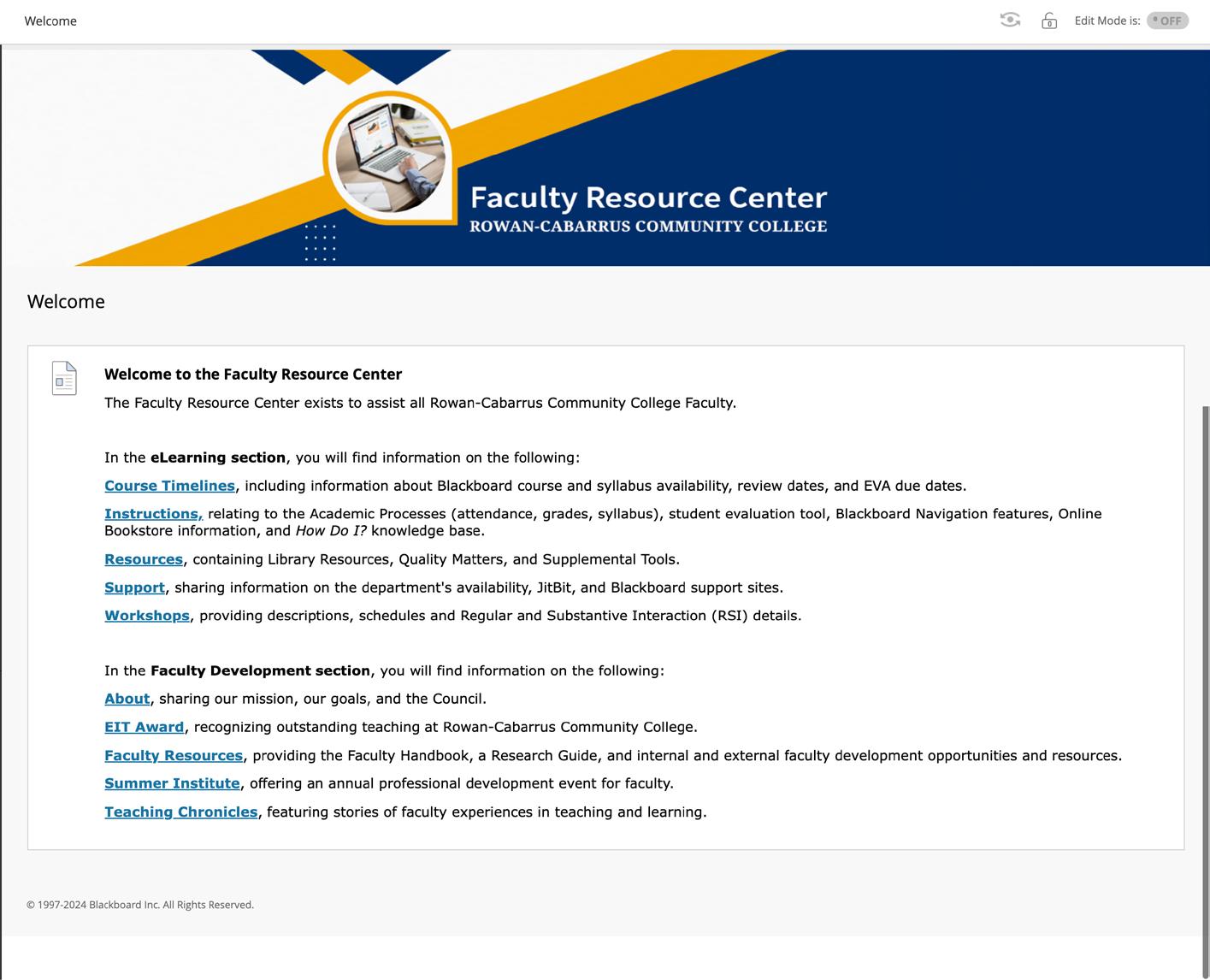
Faculty Absence Reporting Document
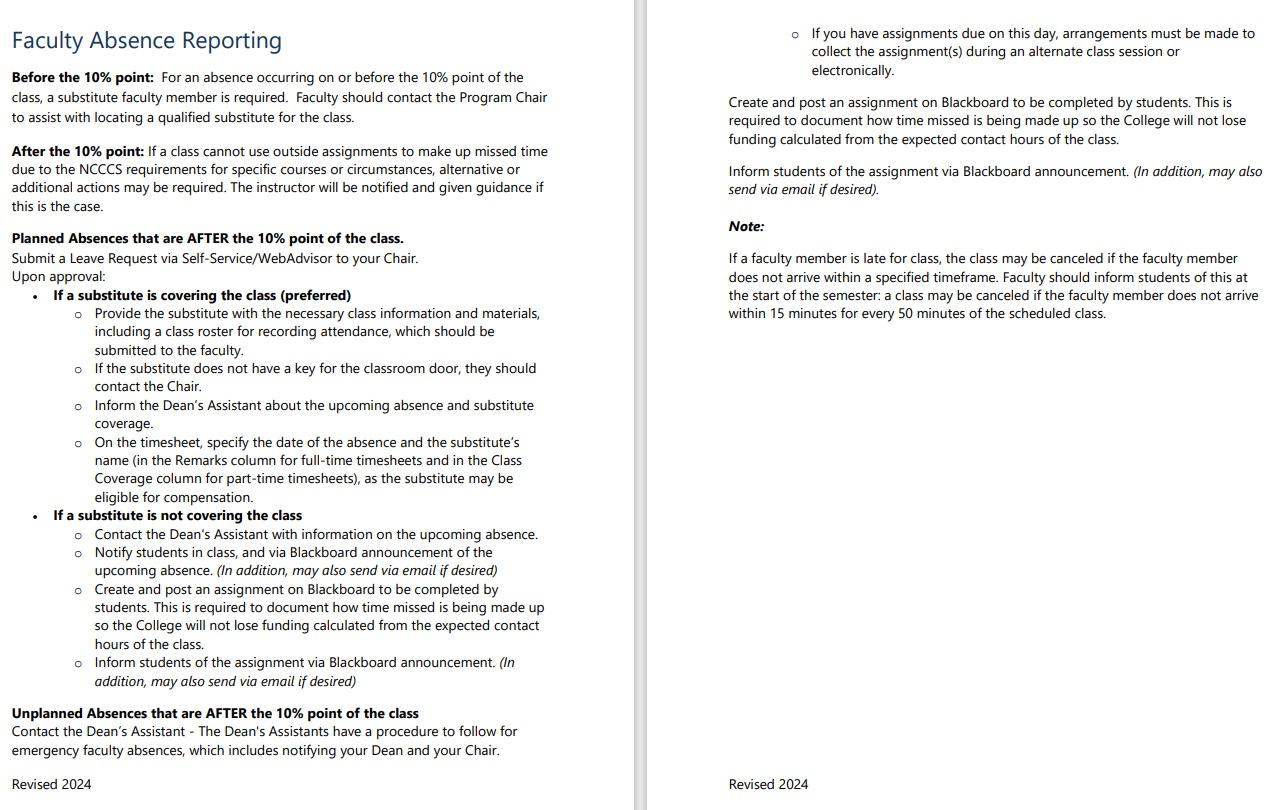

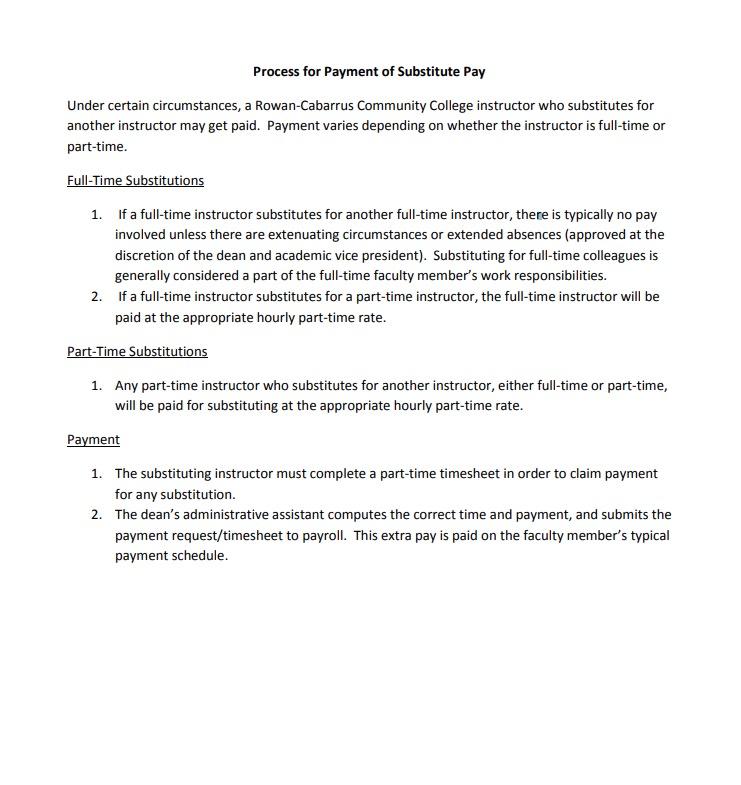
Appendix I
Request For Field Trip and Other Off-Campus College-Sponsored Activities Procedure
Procedure Number: B600.00.70.01.Z
Date Adopted: April 1979
Date Revised: December 2000
Date Revised: November 2004
Date Revised: March 2005
Date Revised: August 2007
FIELD TRIPS AND OTHER OFF-CAMPUS COLLEGESPONSORED ACTIVITIES
PURPOSE
To provide procedures and processes for the approval and conduct of field trips and other offcampus activities to ensure they are well-planned, safe, meaningful and appropriate instructional experiences.
Field Trips and other off-campus activities provide a valuable “tool” for the conduct of instruction. All field trips and off-campus college-sponsored activities must have educational objectives which relate directly to stated program and/or course objectives listed in the course syllabus. Faculty are encouraged to take advantage of the field trip/off-campus activity “tool” when course objectives clearly can be furthered through the activity. Students and field trip sponsors are “ambassadors” of RCCC while on college-sponsored field trips and other offcampus activities and must conduct themselves professionally at all times.
RESPONSIBILITIES
All off-campus field trips and/or other off-campus college-sponsored activities will have a faculty member or college staff as sponsor for the event. The sponsor will plan the event, obtain approval for the event, be present for and supervise the event, and be accountable for ensuring that all processes and procedures outlined in this RCCC procedure are followed.
PROCEDURES
1. Before finalizing plans for a field trip, the faculty or staff member responsible for the field trip will complete the Request for Field Trip and Other Off-Campus CollegeSponsored Activities form (Appendix 5.18a) for approval by the program head/director, dean, and vice president. The academic vice president will approve requests for academic areas and the vice president, student services will approve requests for SGA and club activities.
2. Unless a school vehicle is being used for the trip, students will take responsibility for transporting themselves to and from the field trip site. Classes will convene and dismiss at the site. If the college van is used, the faculty/staff member sponsor must complete a Request for Use of School Van (Appendix 5.18b) and submit it with the Request for Field Trip and Other Off-Campus College Sponsored Activities form.
3. Field trip and/or other off-campus activity sponsors must carefully plan the event, to include initiating contact with responsible personnel at the site being visited. Such contact will include notifying the visited site of planned activities there, the duration of stay, and the number of individuals (students, faculty, staff, etc.) from RCCC involved.
4. Students will behave in a professional manner consistent with the behavior standards outlined in the college catalog and in Appendix 5.18c. The Behavior Standards for Field Trips and Other Off-Campus College-Sponsored Activities (Appendix 5.18c) form must be completed by each student participating in the field trip and submitted with the field trip request to the academic vice president or vice president, student services prior to the trip.
5. Proposals that students pay all or part of the cost for a field trip or other college related activity must be discussed with the appropriate vice president as early as possible and prior to discussion with students. Approval of the president is required. All money collected from students must be deposited with the college business office within 24 hours of the trip.
6. Students unable to participate in a college-sponsored field trip or activity will be given an alternative assignment.
HISTORICAL NOTE
Former Procedure Number: 5.16, 5.18
Original (signed) procedure is on file in the President’s Office. R. L. Brownell, President
Request For Field Trip and Other Off-Campus College-Sponsored Activities
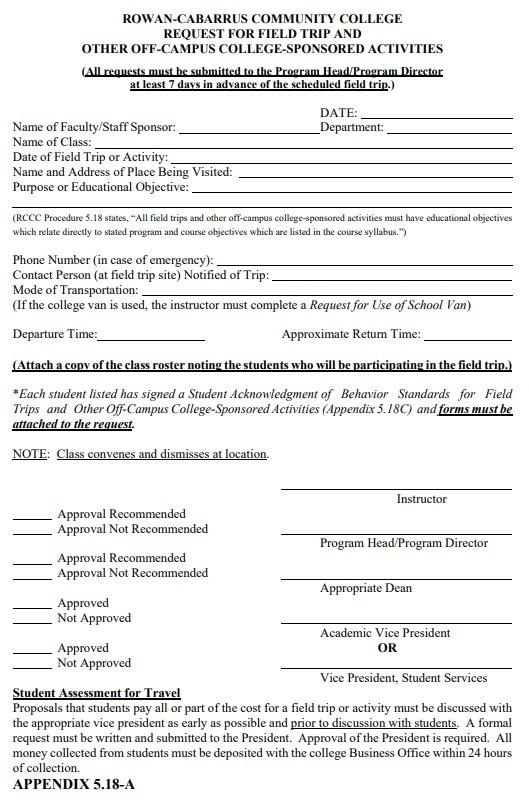
Appendix K
Withdrawal Procedure
Procedure Number: B600.00.50.01.O
Date Adopted: April 1979
Date Revised: August 2019
Date Revised: June 2024
Attendance and Withdrawal Procedure for Curriculum Courses
PURPOSE
To establish the requirements and expectations for student attendance and withdrawal.
RESPONSIBILITIES
Students are responsible for meeting the attendance requirements for each course in which they are enrolled. Should a student deem it necessary to withdraw from a course, the student is responsible for initiating the withdrawal and completing the process as established by the College.
Faculty are responsible for informing students of attendance requirements, as stated in the course syllabus at the beginning of the academic term. Faculty should submit accurate attendance records. Faculty are expected to utilize available communication and support tools to alert students and appropriate College staff of attendance and academic performance concerns.
The Vice President of Student Success Services will administratively withdraw students for purposes related to Student Conduct and Title IX.
All critical attendance and withdrawal dates are noted in the Academic Calendar.
PROCEDURE
The following procedures pertain to attendance and withdrawal, and will be followed by Rowan-Cabarrus students, faculty and staff, as applicable.
Course Entry:
Students are expected to enter each credit course in which they are registered by the 10% (census) date of the course. Students registered in fully online courses must complete the required entry assignment by the 10% date to remain enrolled. Students registered in partially-
online courses must attend a scheduled, on-campus class session or complete the required entry assignment to maintain enrollment. If a student does not enter a course as required, the faculty member will report the student as a “No Show”, as mandated by the North Carolina Community College System. In such cases, the student will be dropped from the course and will be issued a refund for the cost of the course. Students receiving financial aid should consult with Financial Aid staff to determine the impact on financial aid eligibility and obligations.
Course Attendance:
Regular class attendance is a student responsibility and essential to receiving maximum benefit from the educational experience. Students are expected to attend and be on time for all classes and lab, shop, and/or clinic sessions.
Some programs may have outside regulatory bodies that require a minimum of course attendance hours. The attendance requirements will be stated within the course syllabus. Students are responsible for course content when absent, including tests and assignments, and for coming prepared to the class following the absence.
Excused Absences:
Students will be permitted excused absences in specific circumstances (described below). In such cases, the student will be provided reasonable opportunity to make up any tests or other work missed or will not be penalized for the missed work. It is the responsibility of the student to communicate with the faculty member about absences, obtain necessary approvals, and complete the required work within the timeframe agreed upon.
• Bereavement
In the event of the death of an immediate family member (such as parent, sibling, offspring, spouse or significant other), students should notify their faculty member(s) of the death and impending absence prior to the absence or shortly thereafter. Appropriate documentation may be required.
• Hospitalization or Medical Incapacitation
In cases of illness or medical conditions which impact a student's ability to attend or participate in courses, faculty may request that students provide a note from a physician or documentation indicating that the absence from class is warranted. Students with extended hospitalization or medical incapacitation should refer to the “Medical Withdrawal” section of this procedure.
• Jury Duty
The College respects the need for all citizens to serve on a jury when called to duty. For students serving as jurors, class absences will be considered excused when the students provide advance notice to each of their faculty members, each faculty member acknowledges the request, and the students provide written verification of jury selection and proof of service.
• Military Service
Any student who is in the United States Armed Forces who has received temporary or permanent reassignment as a result of military operations, or any student who is a National Guard service member placed into State active-duty status during an academic term, will be granted an excused absence for the period of time the student is on active duty. In addition to making the faculty member(s) aware, students should contact the Records Office to complete the process. Students with extended military duty should refer to the “Military Withdrawal” section of this procedure.
• Religious Observance
Students are allowed two days of excused absences each academic year for religious observances, as required by law. Students must notify faculty in writing of expected religious absence and receive confirmation prior to being absent.
• Title IX
The College recognizes the rights of students to be tardy or absent due to conditions covered under Title IX of the Education Amendments of 1972, which prohibits a school from discriminating against a student based on “student’s pregnancy, childbirth, false pregnancy, termination of pregnancy, or recovery from any of these conditions” (pursuant to 34 C.F.R. § 106.40(b)(1) of the Federal Government). Requests for accommodations are the responsibility of the student and must be submitted through the College’s Title IX Coordinator.
Extended excused absences may significantly impede the student’s ability to make satisfactory progress and achieve the course learning objectives. In such cases, the College will work with the student to determine the best options for course completion or discontinuance.
Withdrawal:
Students are responsible for withdrawing from any class Students may withdraw from a course up until the 75% point of the term. The Vice President of Student Success Services will administratively withdraw students for purposes related to Student Conduct and Title IX
Requests for withdrawal are processed by staff within the Records Office. Faculty and students will be notified that a withdrawal has been processed.
Financial aid recipients should be aware that withdrawals will impact their “Financial Aid Satisfactory Academic Progress Requirements” and may require a portion of unearned aid to be repaid. Students receiving financial aid should consult with Financial Aid staff to determine the impact on financial aid eligibility and obligations.
Veterans need to check with the Veteran’s Coordinator for specific VA regulations concerning withdrawals and course repeats.
Types of withdrawals:
• Student Withdrawals
The decision and responsibility for a Student Withdrawal rests with the student. The request for withdrawal is submitted using an online form through the College’s document imaging system.
o Timeframes:
• If a student withdraws from a course prior to the course start date or during the schedule adjustment period neither the course registration nor withdrawal is recorded on the student’s transcript.
• If a student withdraws from a course after the census date of the course but before the withdrawal deadline has concluded, the student will receive a grade of “W”, which will appear on the transcript. This will not be considered as hours attempted in the student’s accumulated Grade-Point Average (GPA).
• Withdrawals after the withdrawal deadline are not permitted. The final grade earned based on coursework completed will be awarded and recorded on the student’s transcript.
o Medical Withdrawal:
Students may request a medical withdrawal based on injury, illness, or psychological/psychiatric disorder.
• A medical withdrawal can be granted for all courses in the enrolled semester or individual courses. Students are allowed one medical withdrawal request per semester. The medical withdrawal can only be requested when the withdrawal period has ended.
• Students should submit a Request for Medical Withdrawal along with supporting medical documentation within 30 days of the last attended
class, unless medical documentation supports a longer period. Should a longer period be necessary, a medical withdrawal request must be made prior to future enrollment. These requests must be submitted to the Office of Accessibility.
• If the Request for Medical Withdrawal is approved, the student will receive a grade of “W”. If a grade has already been recorded in the student’s permanent record, and the student was unable (due to unusual circumstances) to request a medical withdrawal prior to the recording of a grade, the written request must specify the circumstances causing the delay.
• Students granted a medical withdrawal will not receive a refund for the semester.
• Students receiving financial aid should consult with Financial Aid staff to determine the impact on financial aid eligibility and obligations. Veterans need to check with the Veteran’s Coordinator for specific VA regulations concerning withdrawals and course repeats.
o Military Duty Withdrawal:
A student may withdraw from courses due to being called to active duty or training for military purposes.
• The student may provide credible documentation before reporting to or upon their return from service to the Records Office to update their academic record.
• The student will receive a grade of “W”. If a grade has already been recorded in the student’s permanent record, and the student was unable (due to unusual circumstances) to request the withdrawal prior to the recording of a grade, the written request must specify the circumstances causing the delay.
• Administrative Withdrawals
o Designated agents of the College may initiate an administrative withdrawal as part of a mediated resolution to violation of the “Campus Code of Conduct”.
o The Vice President of Student Success Services will administratively withdraw students for purposes related to Student Conduct and Title IX.
o An administrative withdrawal will result in appropriate documentation in the student’s record or transcript.
Original (signed) procedure is on file in the Rowan-Cabarrus Community College President’s Office Carol S. Spalding, Ed.D, President
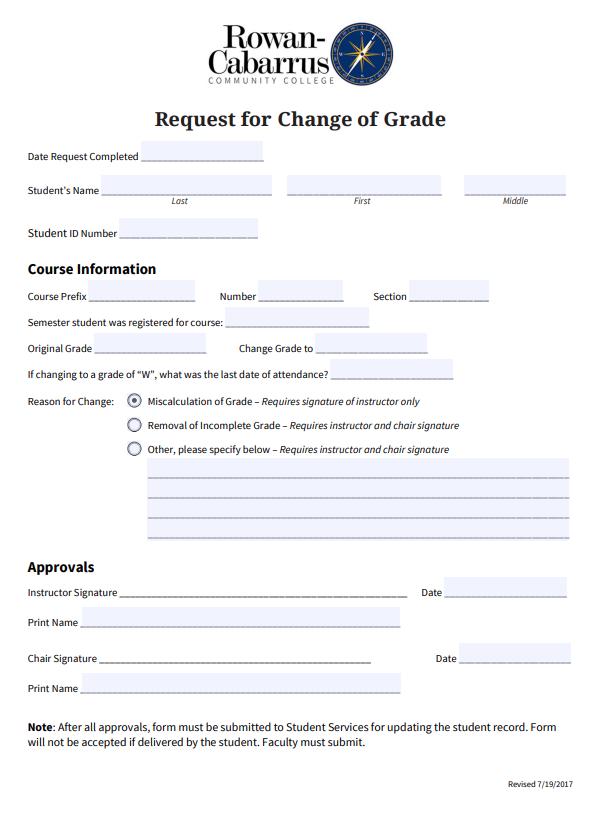
Incomplete Grade Agreement

Schedule of Courses
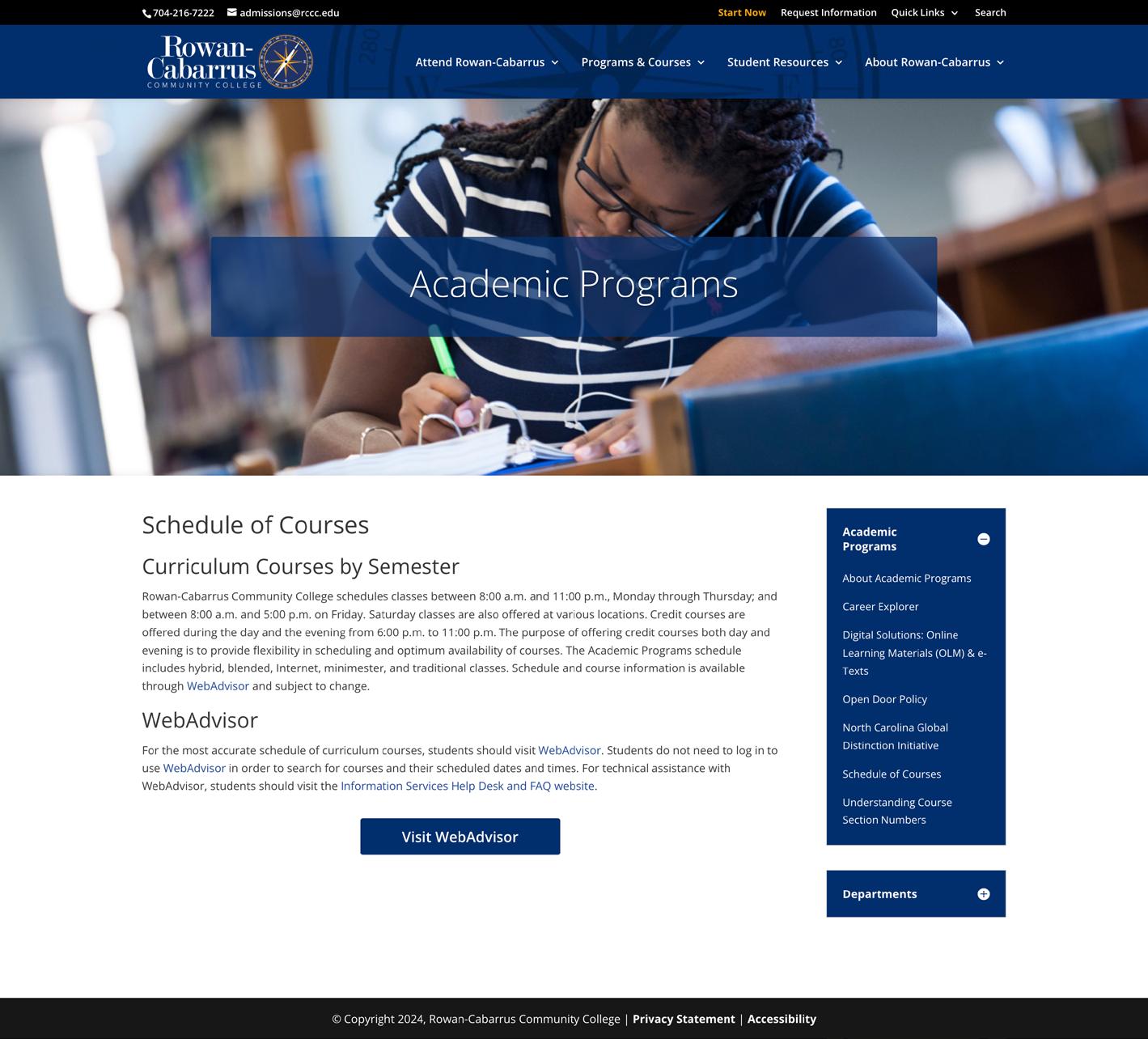
Understanding Course Section Numbers

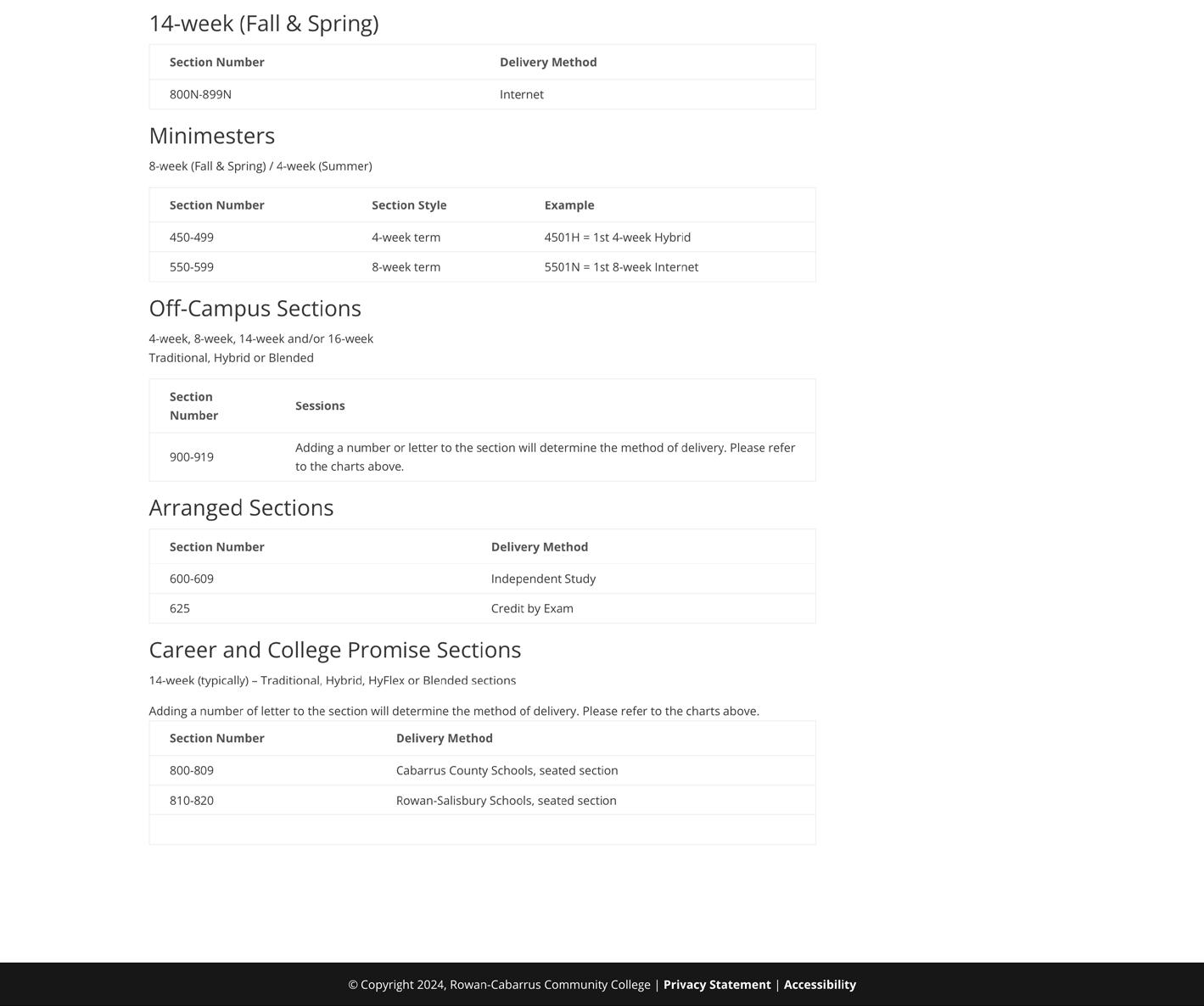
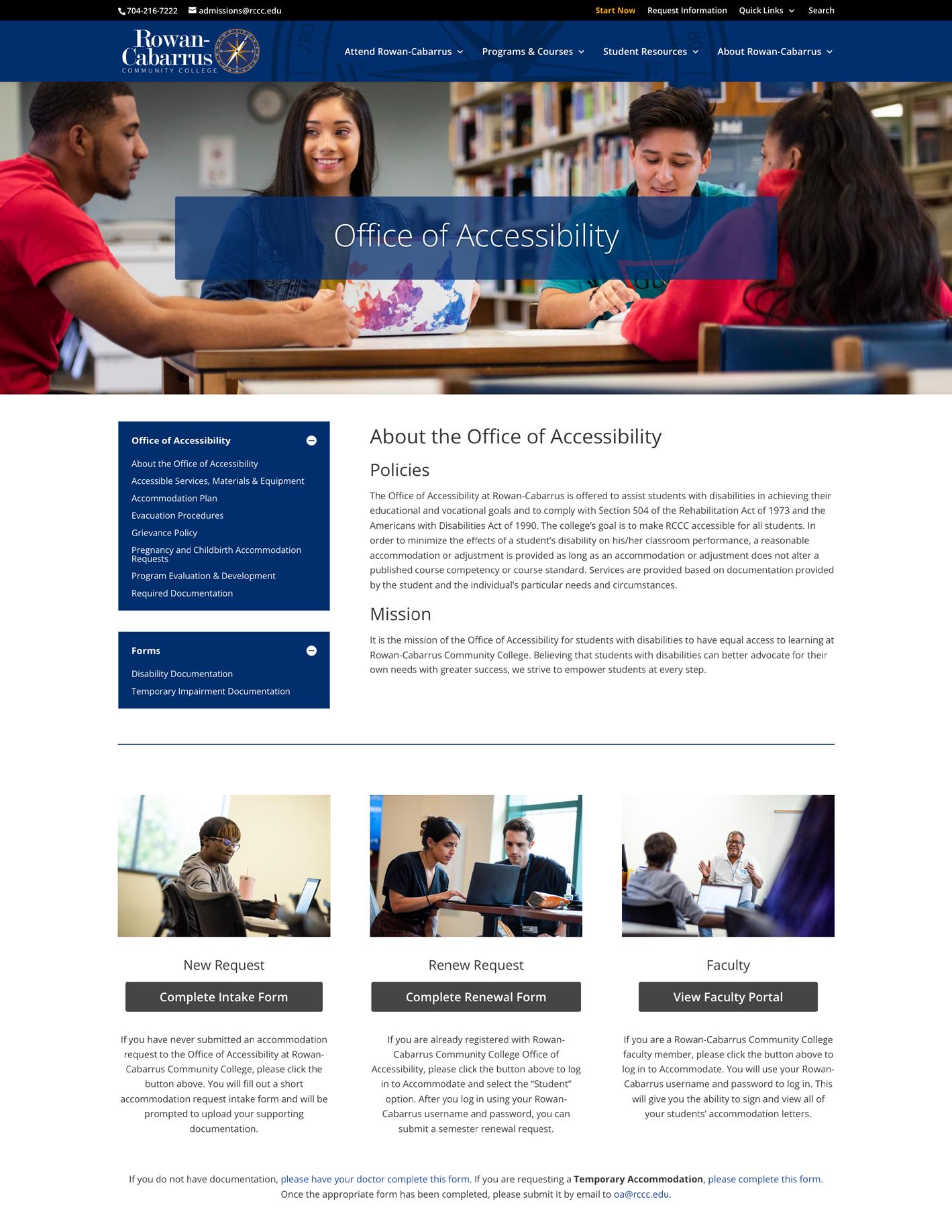
Appendix Q
Office of Accessibility – Services for Students
Procedure Number: B600.00.50.01.WWW
Date Adopted: November 2016
Date Revised: May 2019
Date Revised June 2021
Office of Accessibility – Services for Students
PURPOSE
Rowan-Cabarrus Community College complies with Section 504 of the Rehabilitation Act of 1973 and the Americans with Disabilities Act of 1990 by prohibiting discrimination or exclusion based on disability. These laws state that “no otherwise qualified individual with a disability shall, solely by reason of his/her disability, be excluded from the participation in, be denied the benefits of, or be subjected to discrimination under any program or activity of a public entity.” The college practice, procedure and implementation is based on guidance from federal law, the United States Department of Education Office of Civil Rights.
In a post-secondary education setting, the term "otherwise qualified” means "a person who meets the academic and technical standards requisite to admission or participation in the education program or activity, with or without reasonable modifications to rules, policies or practices; the removal of architectural, communication or transportation barriers; or the provision of auxiliary aids and services."
A "person with a disability" is defined as "any person who 1) has a physical or mental impairment which substantially limits one or more major life activities [including walking, seeing, hearing, speaking, breathing, learning, and working], 2) has a record of such an impairment, or 3) is regarded as having such an impairment."
PROCEDURE
The Office of Accessibility is responsible for working with students with disabilities to determine and implement accommodations based on supporting documentation provided by student.
It is the responsibility of the Office of Accessibility staff to:
• Maintain a caseload of students
• Determine student eligibility for services in accordance with ADA law
• Assist with accommodation planning
• Collaborate with students, faculty, staff and outside agencies contracted by the
college to ensure accommodations are provided in a timely and effective manner
• Maintain student documentation and ensure processes comply with FERPA guidelines
It is the students’ responsibility to:
• Make a disability known to the Office of Accessibility either via email or intake form
• Submit supporting disability documentation
• Request accommodations each semester and with as much advance notice as possible
• Maintain communication with instructors and the Office of Accessibility staff as to the implementation and effectiveness of an accommodation
• Report any concern regarding their accommodation plan to the Office of Accessibility immediately
Students must adhere to the RCCC Students Behavior Standard (described in the RCCC Catalog and Student Handbook) regardless of ability or disability.
DOCUMENTATION GUIDELINES
Supporting disability documentation can include medical records, psycho-educational testing and school records. Students with disabilities requesting accommodations or special assistance are required by the Americans with Disabilities Act (ADA) and Section 504 of the Rehabilitation Act to provide documentation describing a specific disability. Documentation must be provided by an appropriate professional (psychologist, medical doctor, audiologist, ophthalmologist, etc.) and should include the following six elements (appropriate to the disability):
1. A diagnostic statement identifying the disability, a date for the current evaluation, and the date of the original evaluation (whenever possible).
2. A description of the diagnostic tests, methods and criteria used in the evaluation. Standard scores should be included for specific learning disabilities.
3. A description of the functional impact of the disability (that is, the effect on learning and classroom performance or participation) including specific test results and the evaluator’s narrative interpretation.
4. A description of any relevant treatment and/or assistive devices currently prescribed or in use.
5. A recommendation for classroom accommodations or services.
6. The name and signature of the professional who completed the evaluation along with their credentials and contact information.
Documentation may also include suggestions for compensatory strategies, adaptive devices, or other support services that would benefit the student.
Documentation will remain confidential and will be maintained by the Office of Accessibility. This information will be considered confidential and is to be shared within the institution on a need- to-know basis only. Disability records may be destroyed five years after the student’s last enrollment. These documents are exempt of the Public Information Law.
ACCOMMODATIONS
Upon a student’s request for accommodation and a review of appropriate documentation, the student and an Office of Accessibility advisor will develop an accommodation plan in consultation with faculty as appropriate or necessary. The plan will outline specific accommodations or adjustments. These may include physical, testing, instructional, academic support and/or equipment accommodations.
• The accommodation plan must be reviewed and/or updated with each semester registration.
• Accommodations are not automatic and must be requested in advance. Accommodations will not be granted retroactively.
• Accommodations must be reasonable; they cannot alter a fundamental standard or objective of a course.
• RCCC does not provide services of a personal nature outside of the classroom. Arrangements for personal services are the student’s responsibility.
• All students are expected to comply with college policies and regulations as outlined in the RCCC Catalog/Student Handbook.
INSTRUCTOR NOTIFICATION
Instructor notification is not automatic and must be initiated by the student every semester in a meeting with the Office of Accessibility. Following class registration, the student must request an accommodation notification through the Office of Accessibility. The accommodation notification will include all accommodations that the student has been approved for through the Office of Accessibility.
ACCESSIBLE
SERVICES, MATERIALS, AND EQUIPMENT
Notetaking:
Students with specific functional limitations may request assistance with classroom notes. A determination of the method for obtaining classroom notes is based on disability documentation, course format and the course instructor’s recommendation. Classroom notes will generally be obtained by the utilization of a digital recorder or a volunteer classmate.
Carbonless duplication paper is available upon request through The Office of Accessibility as well as a photocopy machine. Students are generally responsible for providing and operating the digital recorder along with the batteries. The Office of Accessibility does have a limited number of digital recorders available in case of emergency.
When presenting an Accommodation Notification form, the student informs the instructor that notes will be needed and asks for assistance to identify a volunteer. In the event that either the volunteer system or digital recorder is not successful, immediately contact The Office of Accessibility. A volunteer note-taker or digital recorder does not excuse poor class attendance. Students receiving class notes accommodation should not expect notes for days missed.
Alternative Testing:
Testing accommodations, based on disability documentation, may include extended time, reduced distraction environment, test scribe, test reader, computer use for written exams, enlarged print or use of a calculator. The student is expected to make arrangements, at least two class days in advance, through the course instructor and the Office of Accessibility if utilizing read aloud, scribe, or single testing room. Actual test accommodations may be provided through the Office of Accessibility, or the Testing Center based on the specific arrangements made by the student and course instructor. Use of the Testing Center requires the student to schedule online via the Testing Center webpage. The instructor will be notified if the student is absent at the scheduled time.
Accessible Textbooks:
Students whose documentation supports an accommodation for textbooks in an alternate format should contact the Office of Accessibility as soon as possible following registration as availability of alternate format material may be limited. The student must submit a copy of their course schedule and list of textbooks with ISBN numbers to the Office of Accessibility. In converting printed text into alternate form, the Office of Accessibility will try to honor the students’ preference. However, depending on the time of the request, the availability of materials, the volume of materials, and the expected time for return, adjustments may be necessary. Such adjustment may include the student using appropriate technology to assist him or her (CCTV or screen reading software).
Requests for accessible materials will be processed in the order in which they are received. Receipts of textbook purchase must be submitted for materials to be released to the student.
Interpreters:
Interpretation and transliteration services will be arranged for qualifying deaf and hearingimpaired students for scheduled classes, labs, scheduled student activities, and appointments. Every attempt will be made to honor a students’ communication preference; however, other
arrangements may be made depending on the time of advanced notice and availability of interpreters.
Student Responsibilities:
• Submit request so services can be arranged as soon as possible. Last minute requests (those submitted less than 72 business hours in advance) cannot be guaranteed.
• Requests must be in writing and include the date, start and end time of class/activity, and room number/location.
• If a student plans to be absent, makes any schedule changes, or finds that services are not needed, they must cancel arrangements within 24 hours through The Office of Accessibility.
• Inform The Office of Accessibility of any difficulty or inconsistencies in Interpreter or CART services as soon as they occur.
In the event of an unreported absence, the interpreter will wait 15 minutes following the scheduled class start time. The interpreter will not remain in the classroom when the student is absent. If the student fails to arrive by the second class period in the same day, the interpreter may leave campus. After three unreported absences, interpreter services will be temporarily suspended. If this occurs, students should refer to the no-show policy and will be notified in writing. Students will be expected to obtain materials in the same manner as other students following an absence.
“No-Show” for Interpreting Services:
If an interpreter or speech-to-text services have been requested and the student knows they will be unable to attend class, the student should provide at least 24 hours advanced notice so that the interpreter can be informed. In some situations, students may not be able to provide 24 hours’ notice; however, any advanced notice is considered sufficient. Failure to provide any advanced notice is considered a “no- show”. To give advance notice a student may call or email the Office of Accessibility.
Failure to provide notice will result in the following actions:
• First “No-show”: An email will be sent to remind the student of the policy and appropriate procedures.
• Second “No-show”: An email will be sent to the student informing the student that they have two “No-Shows”. In addition, the letter will remind the student of the policy and the appropriate procedures.
• Third “No-show”: Services will automatically be temporarily suspended, and an email will be sent to the student informing the student of the policy and the appropriate procedure. Services will remain suspended until the student makes an appointment and meets with an Advisor in the Office of Accessibility to reinstate services.
Adaptive Equipment:
Various adaptive equipment or software for on-campus use can be made available to qualified students as a part of a specific classroom accommodation plan. However, any prescriptive or personal devices, including those for home use, are the responsibility of the student.
As a part of the accommodation plan, the qualified student will be able to sign out equipment from the Office of Accessibility, via a check-in and check-out sheet at the Navigation Station on a daily basis, for use on campus. Other equipment, such as software or computer and technical equipment, will be available in the assigned classroom or LRC as requested by student.
An eligible student with a disability has the option to loan equipment for use at home, per semester enrolled, with the understanding that they are responsible for the equipment/materials signed out on the loan agreement signed in office with The Office of Accessibility.
Equipment/materials must be relevant and consistent with what is required for use in the specific course. It is the student’s responsibility to take care of all equipment/material and to return it in good condition to The Office of Accessibility at the end of each semester as soon as course work is completed.
In the event the loaned equipment/material is lost, stolen, or damaged the student will be billed replacement costs at the end of each semester. In addition, a hold will be placed on the students’ record preventing registering for classes and requesting transcripts until equipment is returned or replaced.
Personal Attendants/Personal Care Providers (PCP’s):
Students are responsible for providing their own personal health and hygiene needs along with their mobility needs within the classroom and around campus.
Due to regulations and space limitations, personal attendants generally may not attend class with the registered student unless the accommodation is supported by disability documentation and is included in the student accommodation plan.
Emotional Support Animal:
Students requesting the use an Emotional Support Animal as an accommodation for disability must provide appropriate documentation from a licensed healthcare professional to the Office of Accessibility. Notice in advance is required to allow review and verification of student documentation along with verification of all vaccinations and the health of the animal including all the necessary licensing. Any potential impact on others or the activity will be
evaluated including possible effect on persons with allergies to animal hair or dander. For additional information, please refer to the B600.00.50.01.YYY procedure for Service/Support Animals on Campus.
Attendance Accommodation Request:
Flexibility with attendance is determined on a case by case basis and cannot alter the essential requirements of the course. If attendance was not in the original accommodation request, a new accommodation will have to be issued for this section of the procedure to be relevant.
Determination of the essential requirements require the following questions to be answered by the course instructor in collaboration with the program chair and dean. These questions are provided by the Office of Civil Rights to guide an objective and thoughtful decision making process which will withstand scrutiny of DOE and OCR.
• Is there regular interaction between students and instructor as well as among the students themselves?
• Do student contributions in class constitute a significant component of learning process?
• Does the fundamental nature of the course rely upon student participation as an essential method of learning?
• To what degree does a student’s failure to attend class constitute a significant loss of the educational experience of other students in the class?
• What does the course description and syllabus say regarding attendance?
• What is the method by which the final course grade is calculated?
If determined to be reasonable, students are responsible for contacting instructor as soon as possible when a disability-related absence has occurred.
Parking:
Accessible parking is available in accordance with the state and federal regulations. Students are required to follow all appropriate regulations and to have North Carolina-issued permit visible when parked in an accessible or handicapped space.
Accessible parking is accessed on a first come, first served basis. Any student wishing to address accessible parking issues should contact the Office of Accessibility.
Grievances:
Students who believe they have been discriminated against on the basis of a disability should attempt to resolve the problem informally with The Office of Accessibility. Concerns regarding a specific accommodation will be resolved with the involvement of the student and
the appropriate instructor, Program Head, Academic Dean, Academic Vice President, and Vice President of Student Success Services. If a concern cannot be resolved to the student’s satisfaction, the student should utilize the Student Grievance process as outlined in the RCCC College Catalog/Student Handbook.
Program Evaluation:
The Office of Accessibility will consult with faculty and staff with regard to evaluating services at RCCC for students with disabilities and recommending changes in policies, procedures and services as appropriate. The Office of Accessibility will provide guidance and support to both faculty and staff in providing services for students with disabilities and will provide in-service training and information to RCCC faculty and staff as appropriate.
Professional consultants in the area of services for students with disabilities may be utilized in specific cases and in staff development efforts.
AUTHORITY
United States Department of Education, Office of Civil Rights. Section 504 of the Rehabilitation Act of 1973 Americans with Disabilities Act of 1990.
Original (signed) procedure is on files in the Rowan-Cabarrus Community College President’s Office Dr. Carol S. Spalding, President
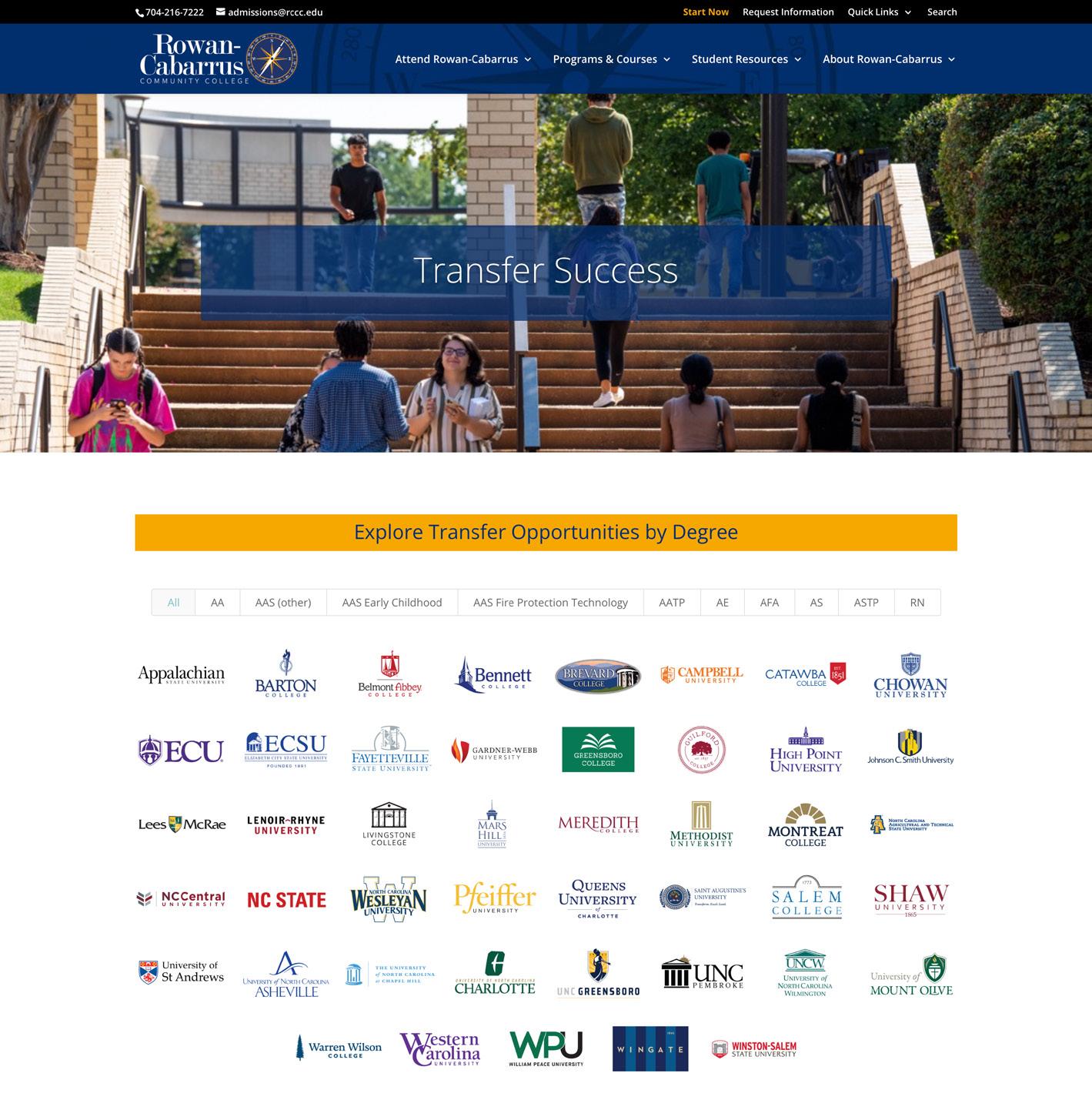

Appendix S
High School Programs
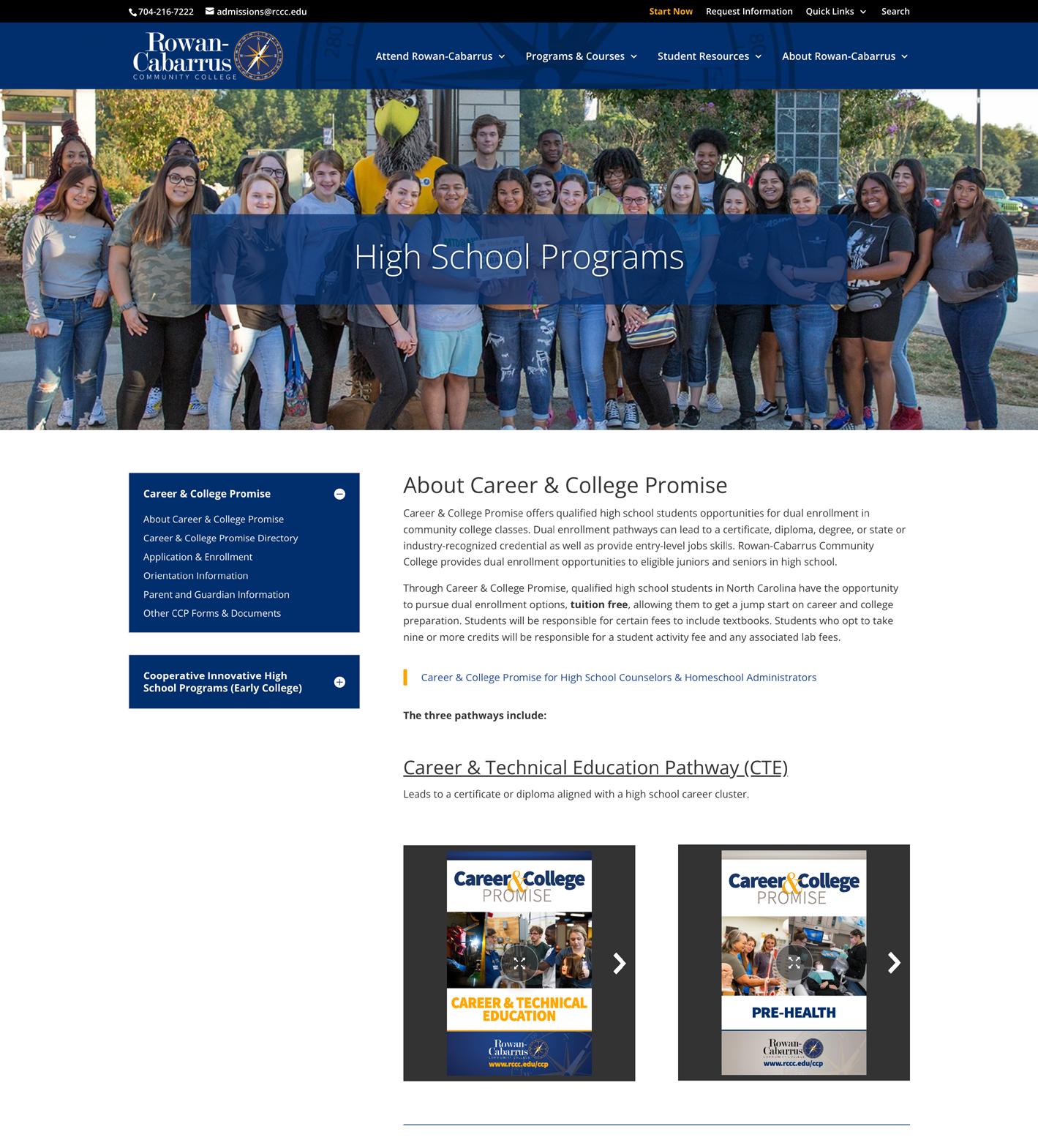
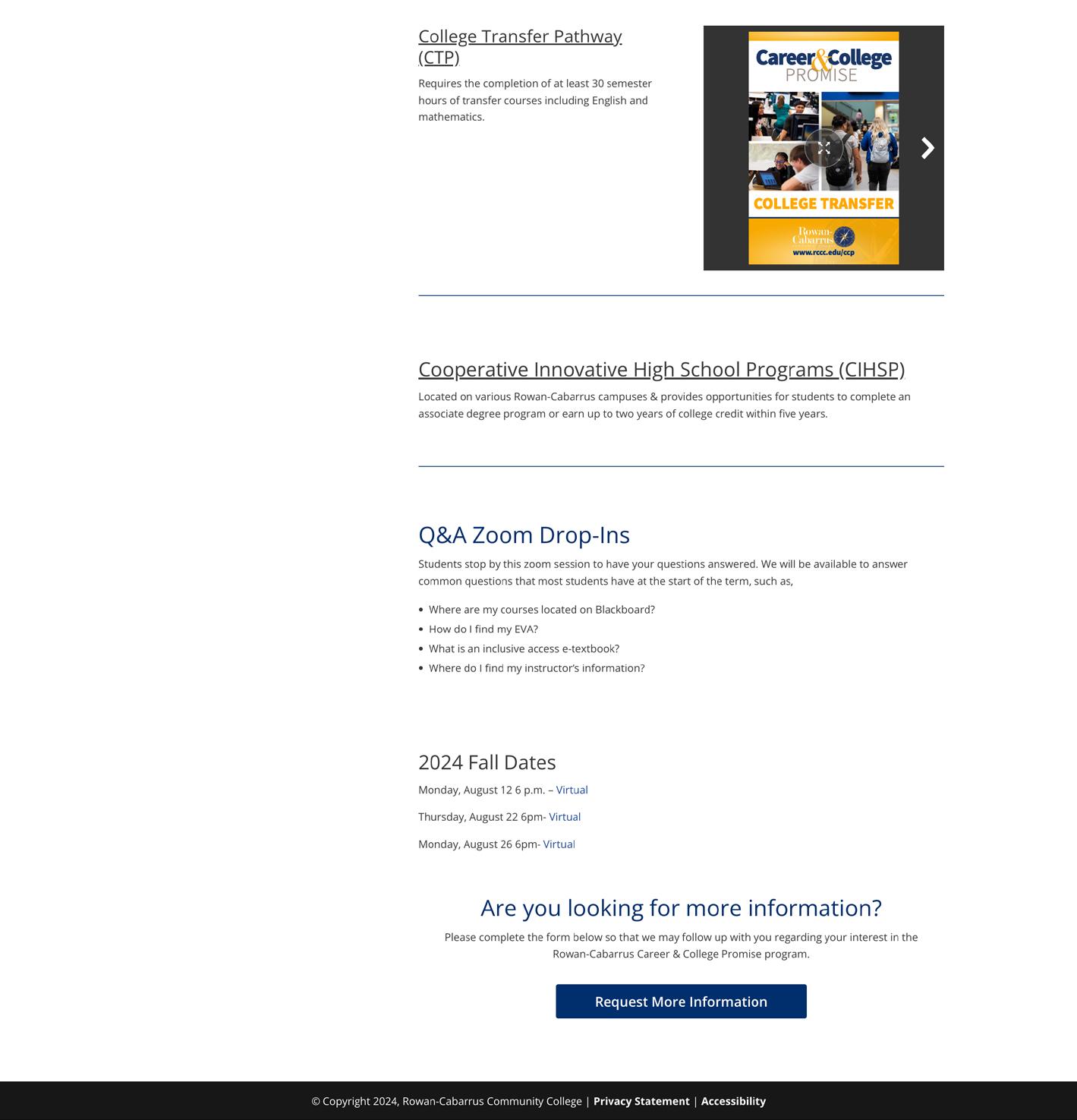

Appendix U
Classroom Observation Form




Appendix W
Faculty Classroom Observation Process
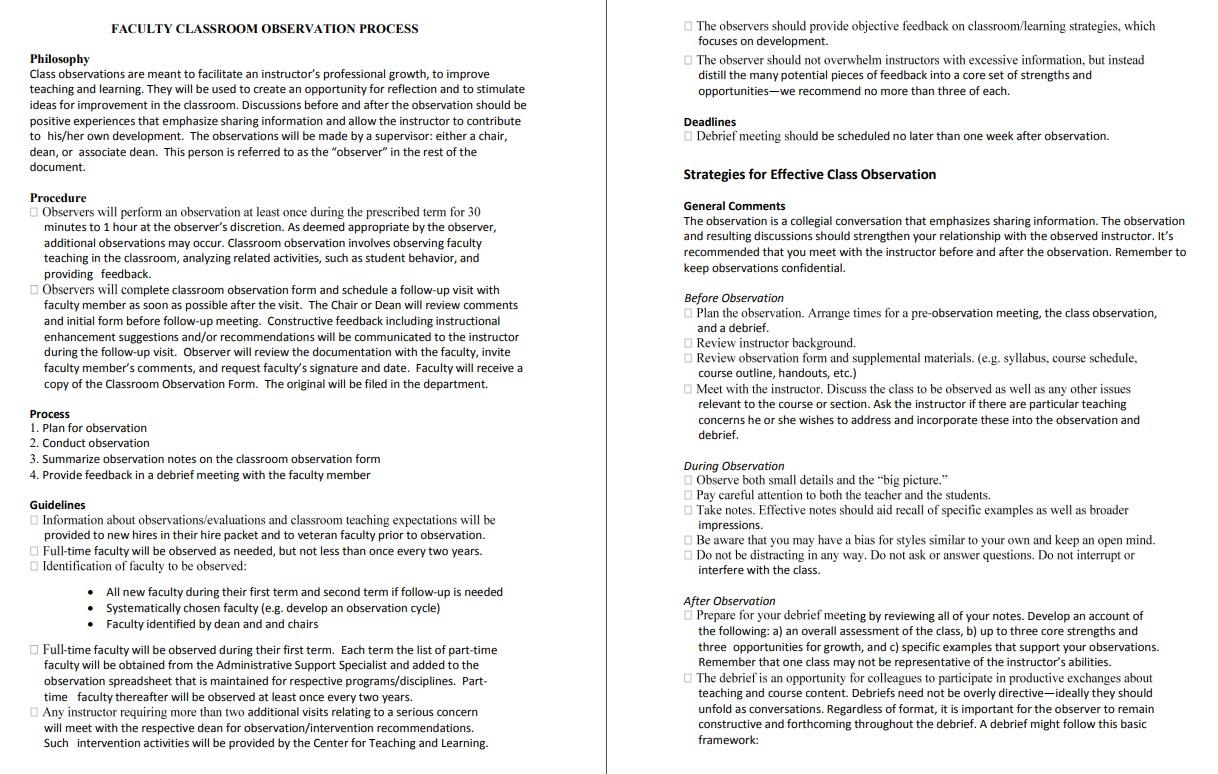

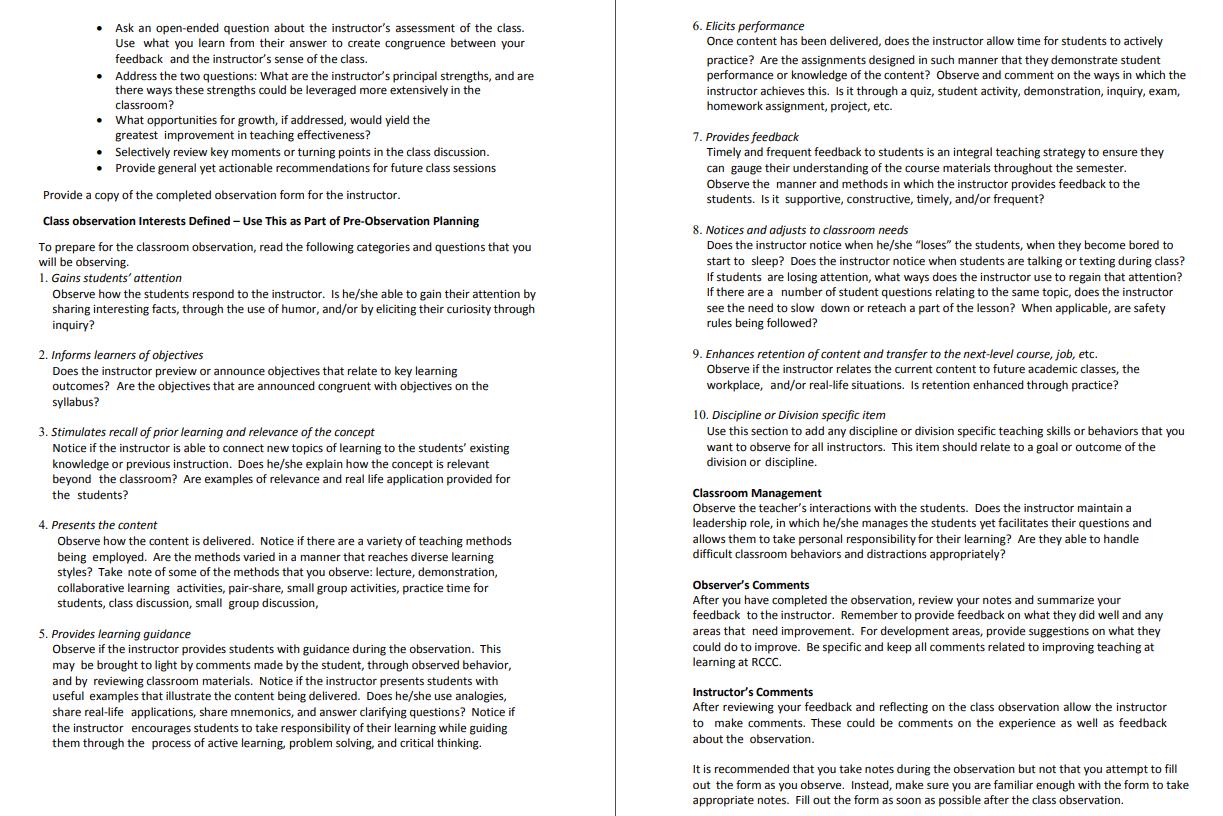

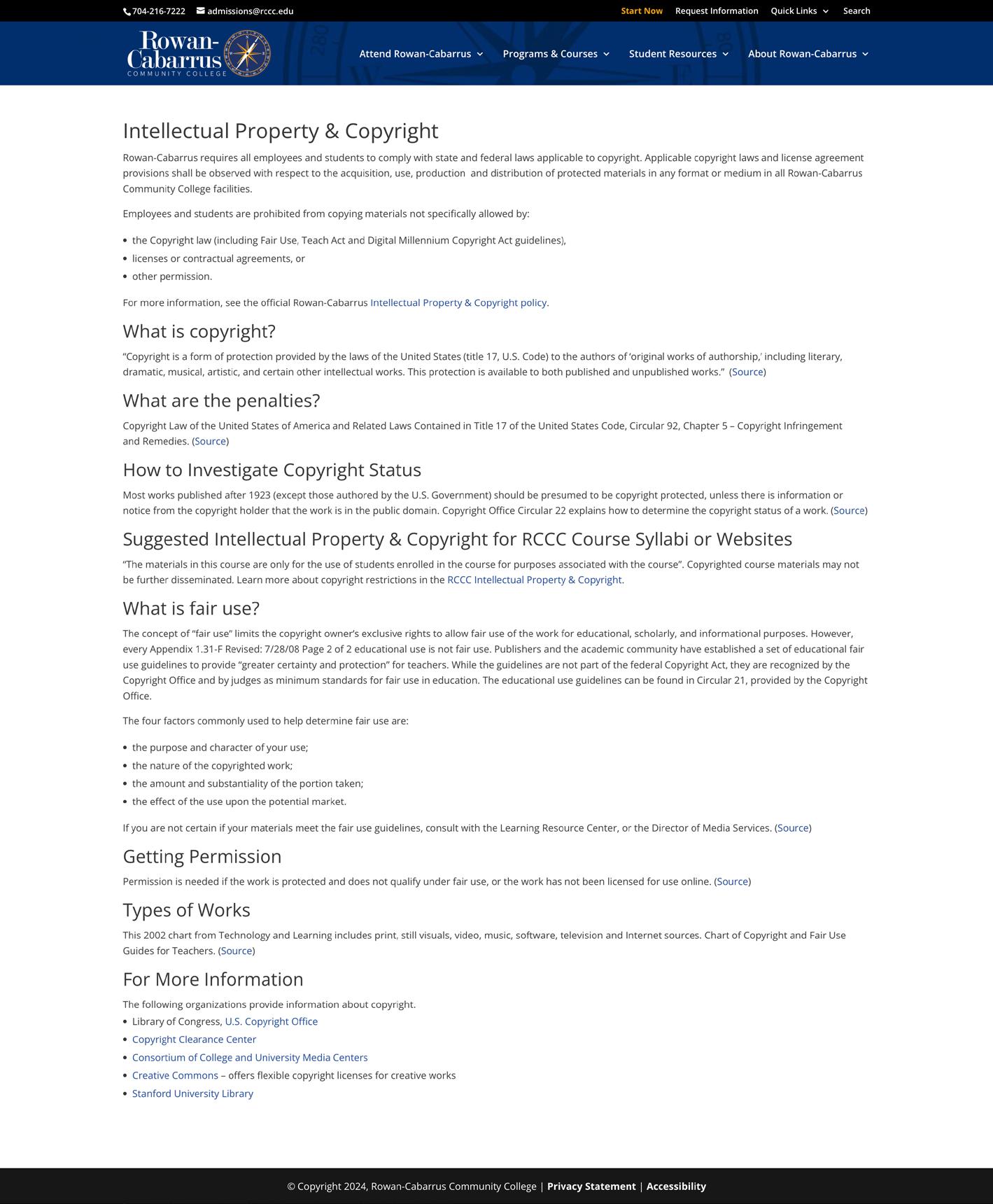
Appendix Y Intellectual Property and Copyright Policy
Policy Number: D700.00.70.05
Date Adopted: September 2014
Date Revised: June 2015
INTELLECTUAL PROPERTY & COPYRIGHT
PURPOSE
To set forth the policy governing the acceptable use and ownership of intellectual property as well as copyright materials created, utilized, disseminated, and stored at Rowan-Cabarrus Community College (RCCC).
POLICY
The administrative leaders of RCCC define intellectual property as the following: “That which is representative of any creative work which qualifies for protection under copyright, trademark, or patent laws as established and enforced by the United States of America or the State of North Carolina.” Any and all intellectual property created, formulated, or designed by any person employed or contracted by the College, whether part-time, full-time or anyone else acting in the scope of employment or engagement shall be owned by the College. Any and all intellectual property created, formulated, or designed by any person using resources, facilities, equipment or other assets owned by the College acting in the scope of employment or engagement with the College shall also be owned by the College. Exceptions to intellectual property ownership and any monetary agreements must be established in writing, approved by the President, and signed by both parties.
Any intellectual property designed, created, or formulated by a student, outside of any role as an employee, of RCCC during the scope or time of his/her instruction, assignment, or other given duties with the College shall be property of the student. However, a perpetual license to utilize, disseminate, and promote said property will be granted to RCCC at no cost.
Further, employees are prohibited from copying, reproducing, or disseminating materials not specifically allowed by the copyright law, fair use guidelines, licenses, contractual agreements, or other specifically identified permission. Employees who willfully disregard the “Use of Copyright Materials” procedure for the College do so at their own risk, assuming all liability for their actions, and may be subject to disciplinary action as specified in the College employee disciplinary procedures.
The Board of Trustees of RCCC authorizes the President to develop and administer procedures which set forth the process to be followed.
ESTABLISHED ADMINISTRATIVE PROCEDURES
B600.00.40.01.A Intellectual Property and Copyright
HISTORICAL NOTE
Text for this policy was reviewed and approved by legal counsel at the North Carolina Community College System office in 2014. Detailed information regarding this review may be obtained from the Office of the President.

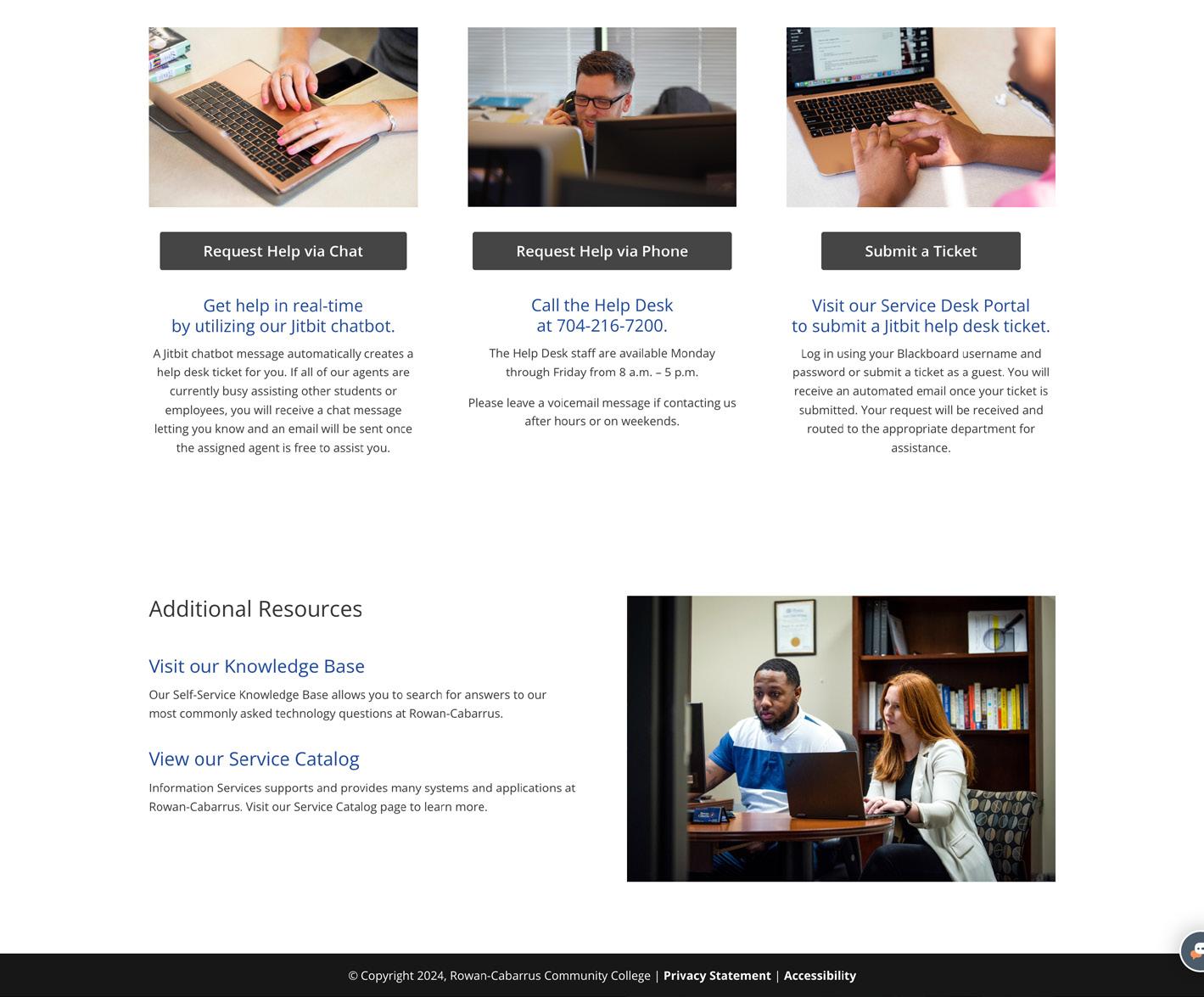
Appendix AA
Student Evaluation of Instruction
Procedure Number: B600.00.70.01.AA
Date Adopted: May 1994
Date Revised: November 2000
Date Revised: August 2014
Date Revised:
Date Revised: August 2020 July 2024
STUDENT EVALUATION OF INSTRUCTION
PURPOSE
To describe the process for conducting the student evaluation of instruction. The ongoing implementation of the evaluation process and use of the information collected is ensured by the Chief Academic Officer and Chief Officer of Corporate and Continuing Education.
BACKGROUND
Curriculum Course Sections:
The Student Evaluation of Instruction is conducted electronically during the fall and spring semesters for each curriculum course section the College offers with the exception of arranged sections. The evaluation instrument contains questions concerning the quality of instruction, grading, testing, and course materials, and provides a comment section for qualitative feedback from the respondents
Corporate and Continuing Education Course Sections:
Corporate and Continuing Education distributes the student evaluation of instruction for randomly selected courses offered. The evaluation instrument contains questions concerning the quality of instruction, grading, testing, and course materials, and provides a comment section for qualitative feedback from the respondents.
RESPONSIBILITIES:
Curriculum Course Sections:
1. The College’s designated system administrator deploys the evaluation during each term of the fall and spring semesters in an appropriately confidential manner, and ensures that students are notified
2. The Chief Academic Officer (CAO) ensures that Academic Deans, Program/Discipline Chairs, and individual faculty members are notified of evaluation deployment.
3. Information Services ensures Academic Deans, Program/Discipline Chairs, and individual faculty members have access to their respective composites of the evaluations
4. The Academic Deans and/or Program/Discipline Chairs provide appropriate feedback to the faculty, and conduct follow-up sessions with individual faculty members as needed.
Corporate and Continuing Education Course Sections:
1. Corporate and Continuing Education deploys the student evaluation of instruction in an appropriately confidential manner.
2. Corporate and Continuing Education provides appropriate Program Managers, corporate clients and individual instructors with respective composites of the evaluation.
3. The Program Managers conduct follow-up sessions with individual instructors and provide appropriate feedback documentation.
PROCEDURES:
Curriculum Course Sections:
1. The evaluations are deployed within the last ten days of each term during fall and spring semesters
2. Students and faculty will receive an email when the evaluations open and reminders prior to the last day of availability to encourage student participation to complete the evaluations
3. Completed evaluations are made available to the Academic Deans, Program Chairs and faculty for review following the end of the term. The evaluations should be reviewed and utilized as an effective tool for providing feedback to faculty and/or to help improve instruction.
4. Follow-up with each faculty member is provided by the Dean and/or Program/Discipline Chair.
5. The student evaluation of instruction becomes a part of the individual faculty member’s documented performance evaluation (per College Procedure C200.00.22.01.E Performance Evaluations), as deemed appropriate by the supervisor and in accordance with expectations or guidance set forth by the Chief Academic Officer.
6. In addition to the review and communication processes detailed in this procedure, the administrators responsible for the support of instructional delivery modes will review evaluation results related to delivery technology and support. As needed, follow-up is initiated with the appropriate department or program management.
Corporate and Continuing Education Course Sections:
1. Evaluation of a representative sample of Corporate and Continuing Education courses are conducted at random throughout the academic year.
2. Program Managers are responsible for distribution and collection of the evaluations Evaluation may be conducted at the end of class or mid-point depending upon the length of the class.
3. Completed evaluations are submitted to the appropriate Program Manager for review.
4. Follow-up with the instructor is provided as needed by the Program Manager.
5. The appropriate Program Manager maintains files of documented responses to student evaluations for the purpose of improving programs and services.
Original (signed) procedure is on file in the Rowan-Cabarrus Community College President’s Office Dr. Carol S. Spalding, President
Policy Manual
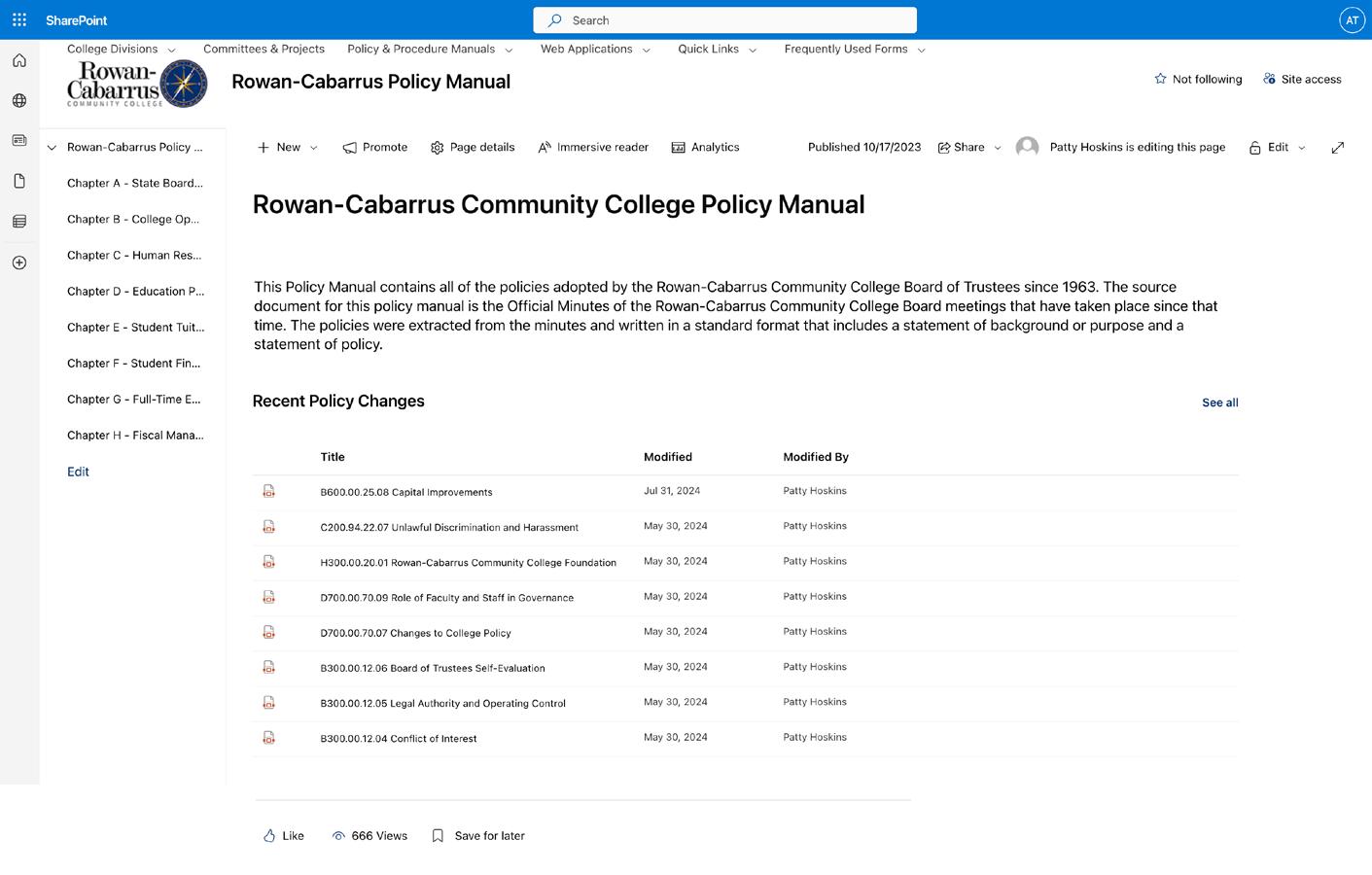
Procedure Manual
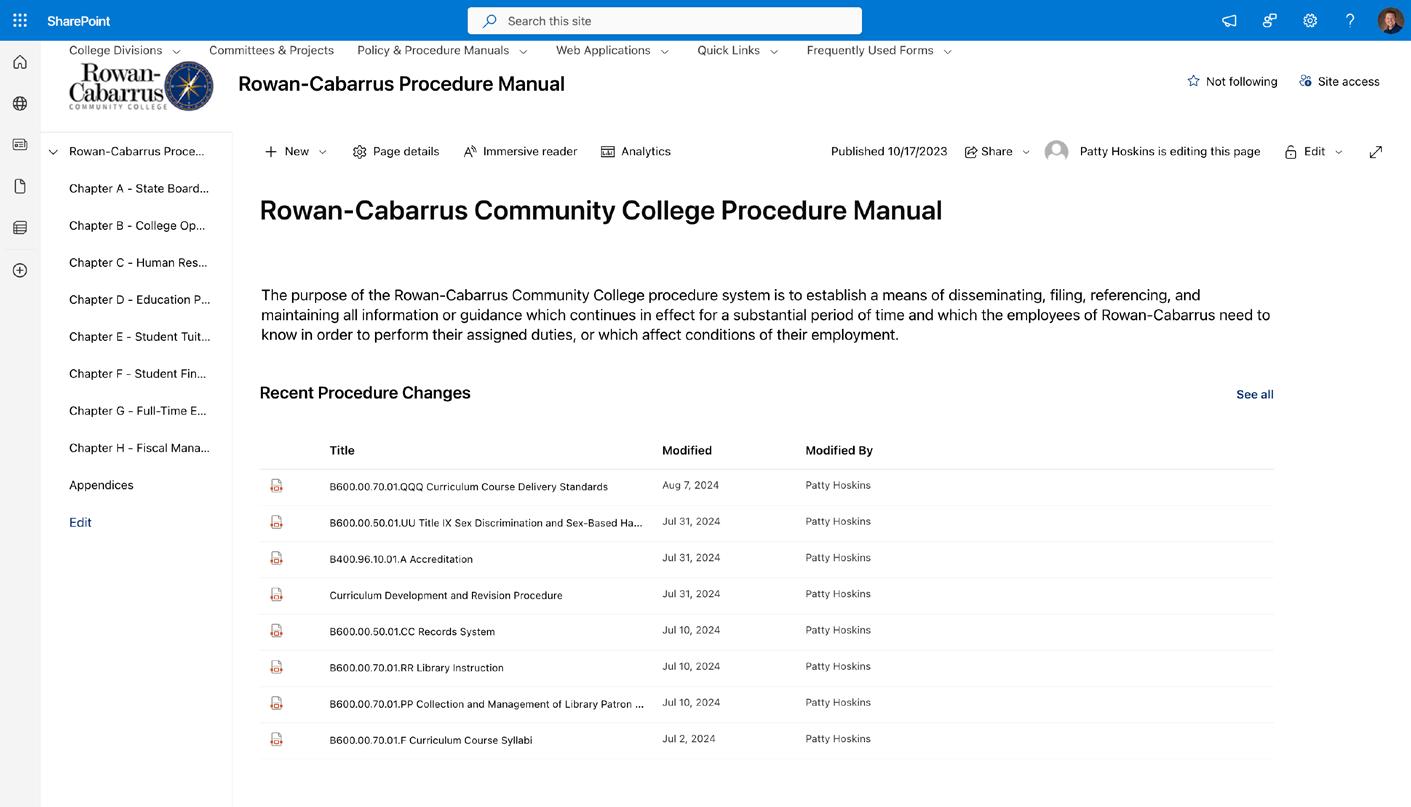
Department of eLearning and Faculty Development Services (Formerly Distance Education)
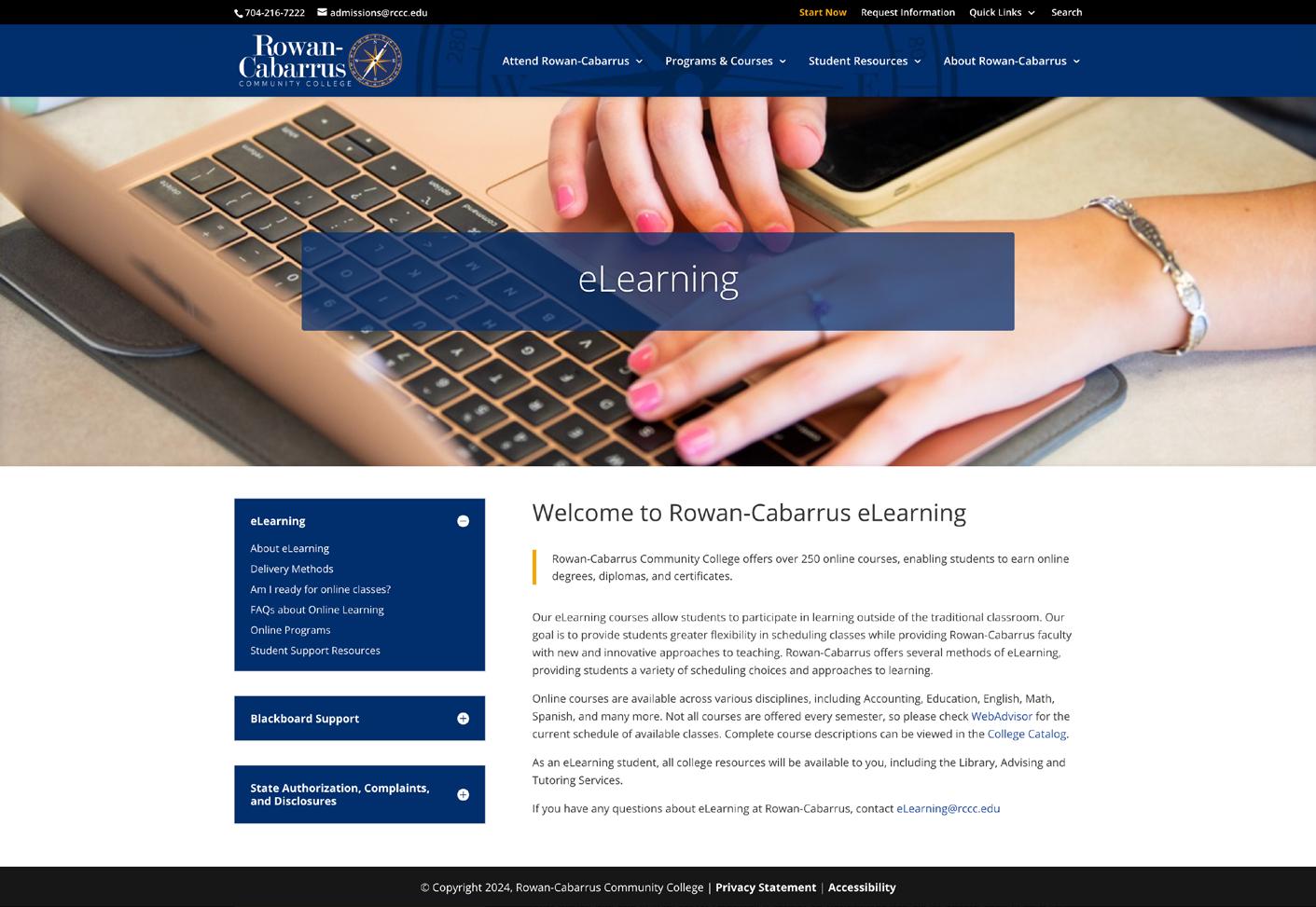
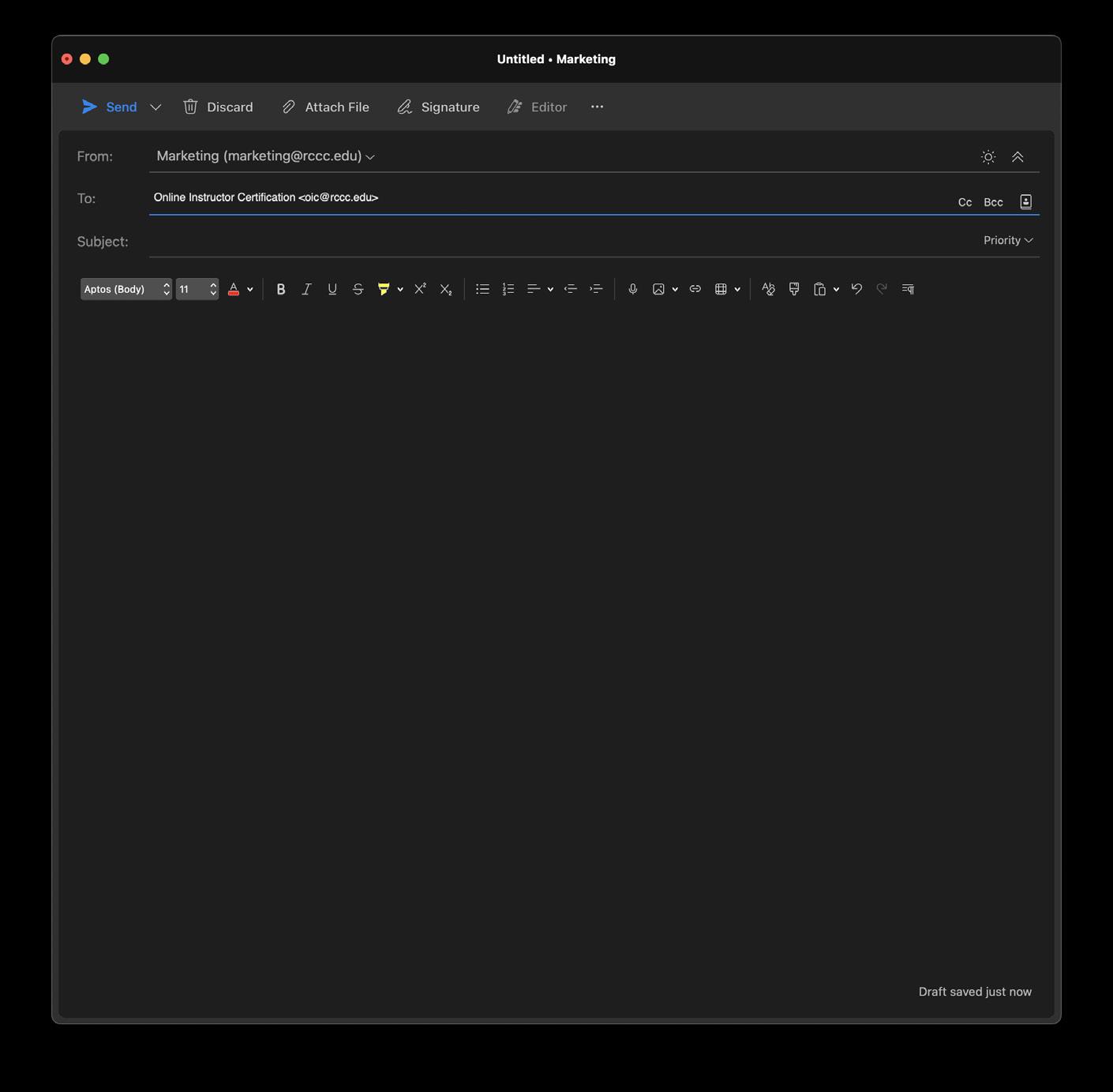
Department of eLearning <elearning@rccc.edu>

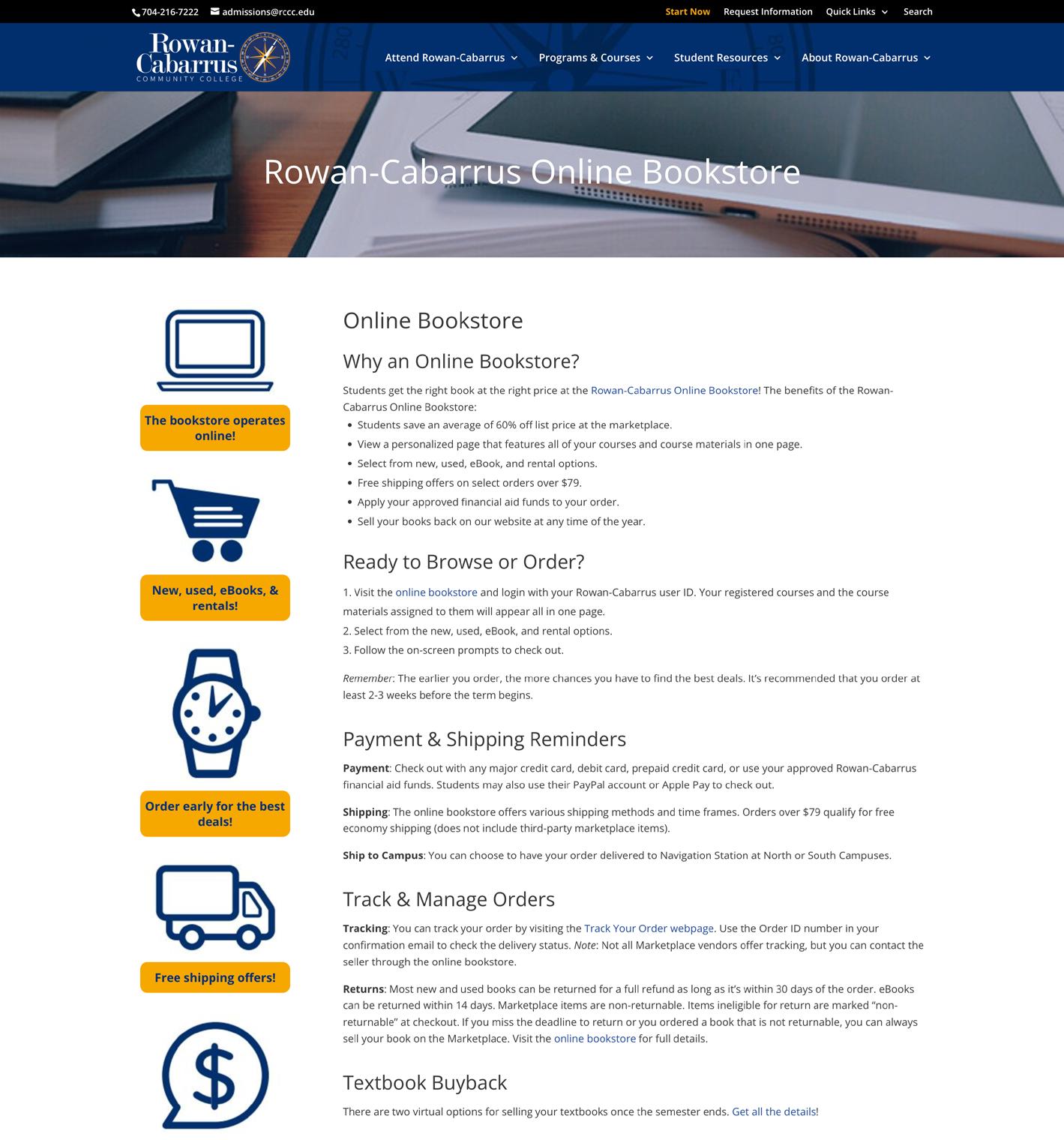
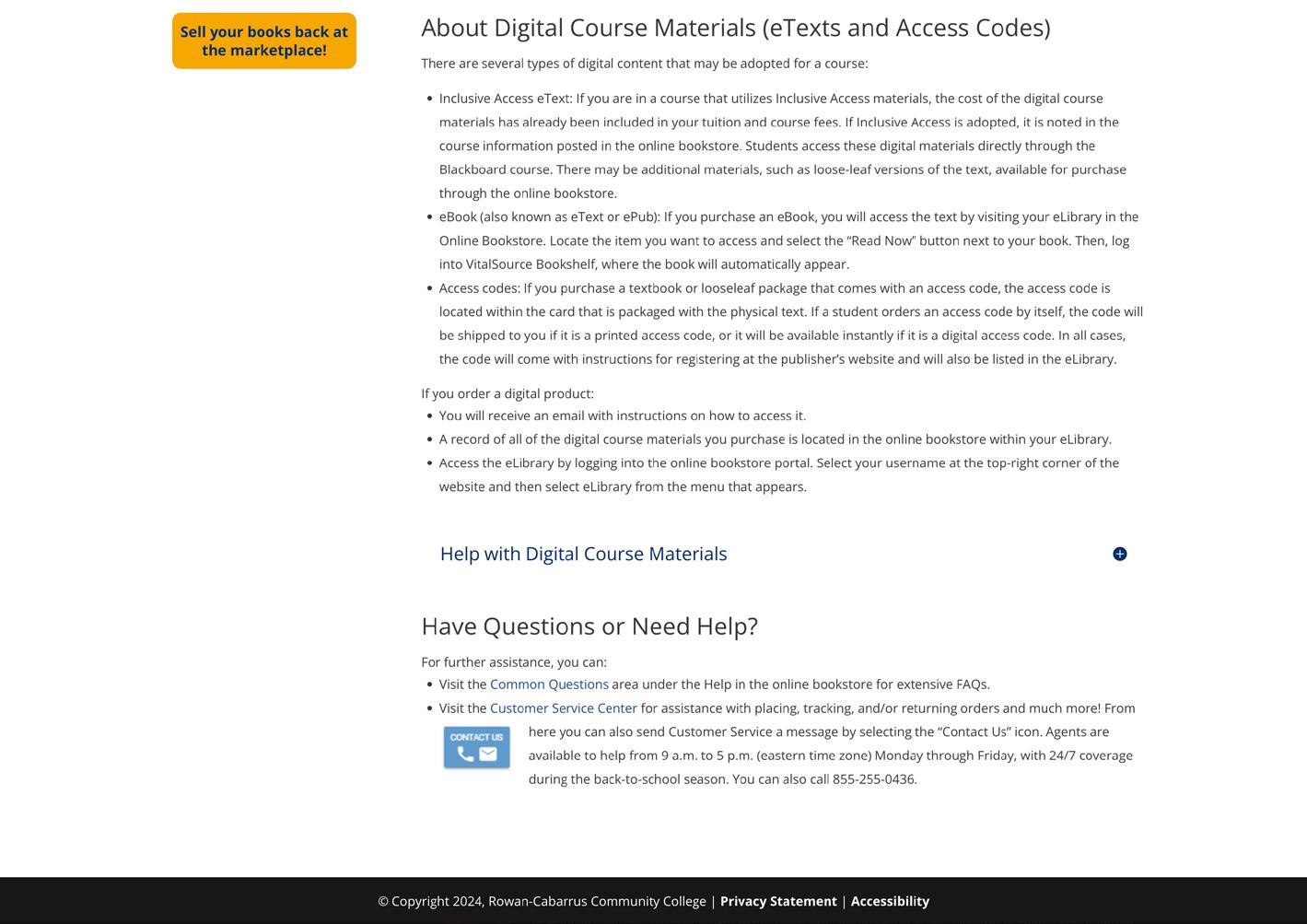

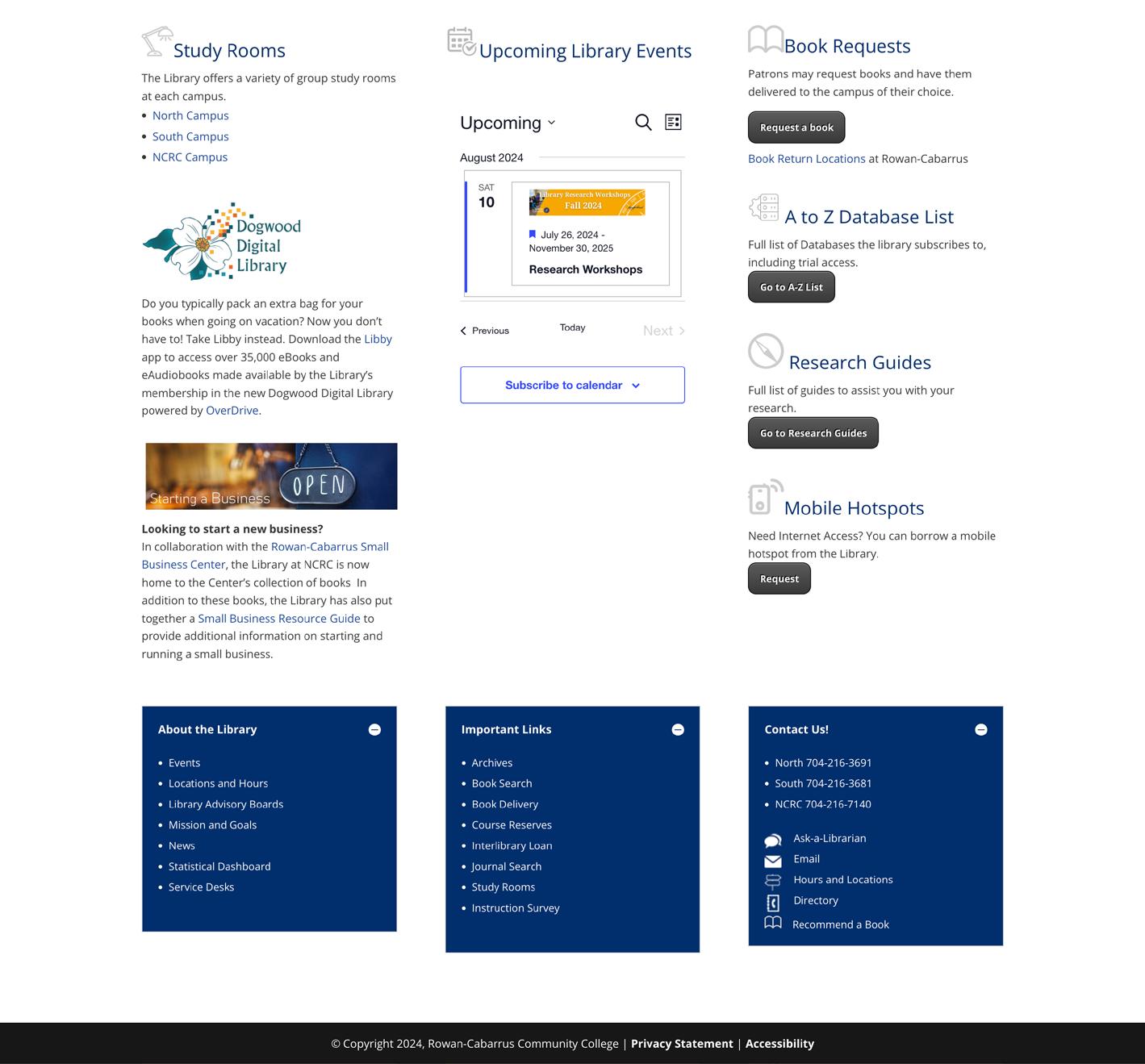
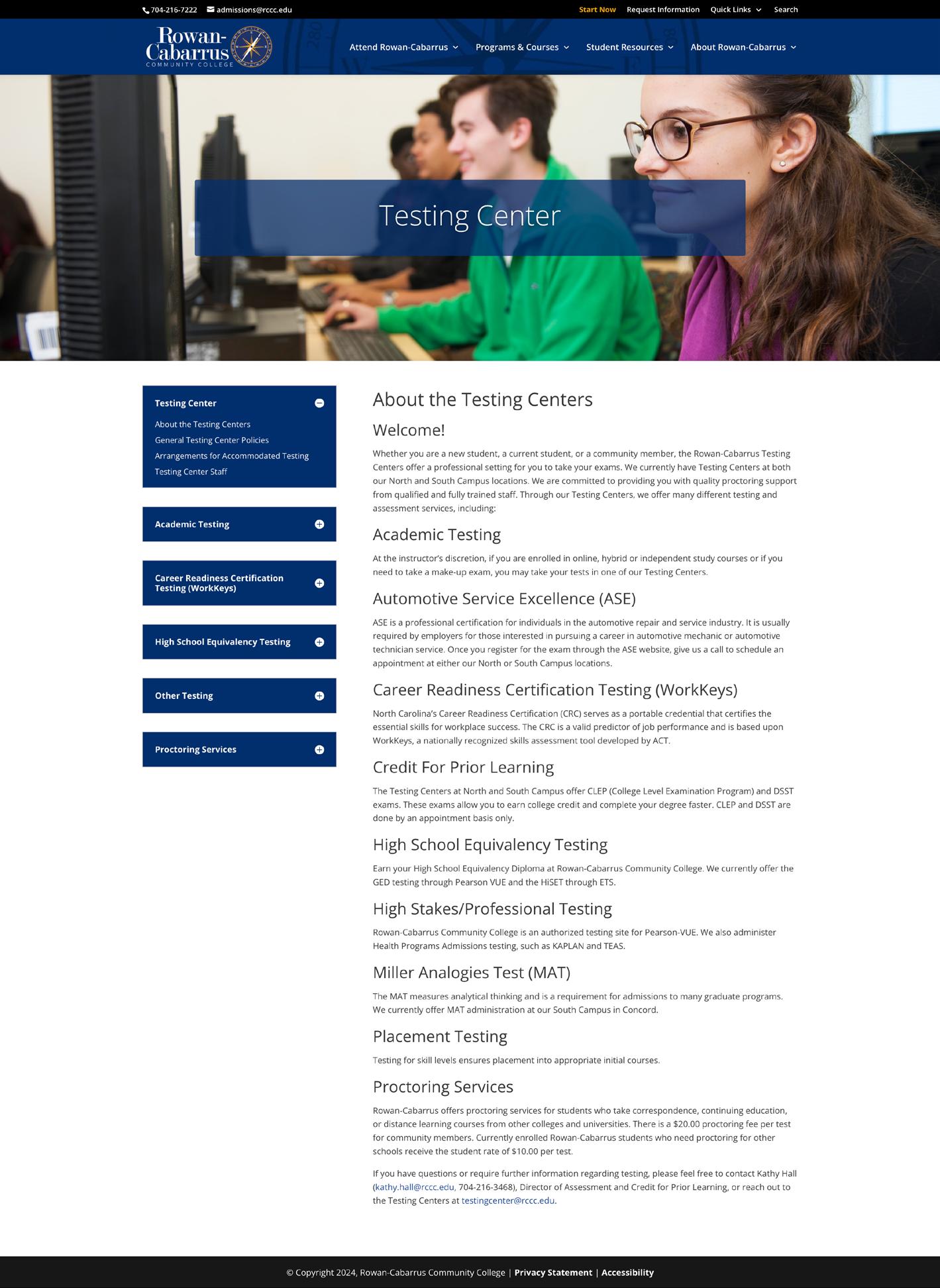
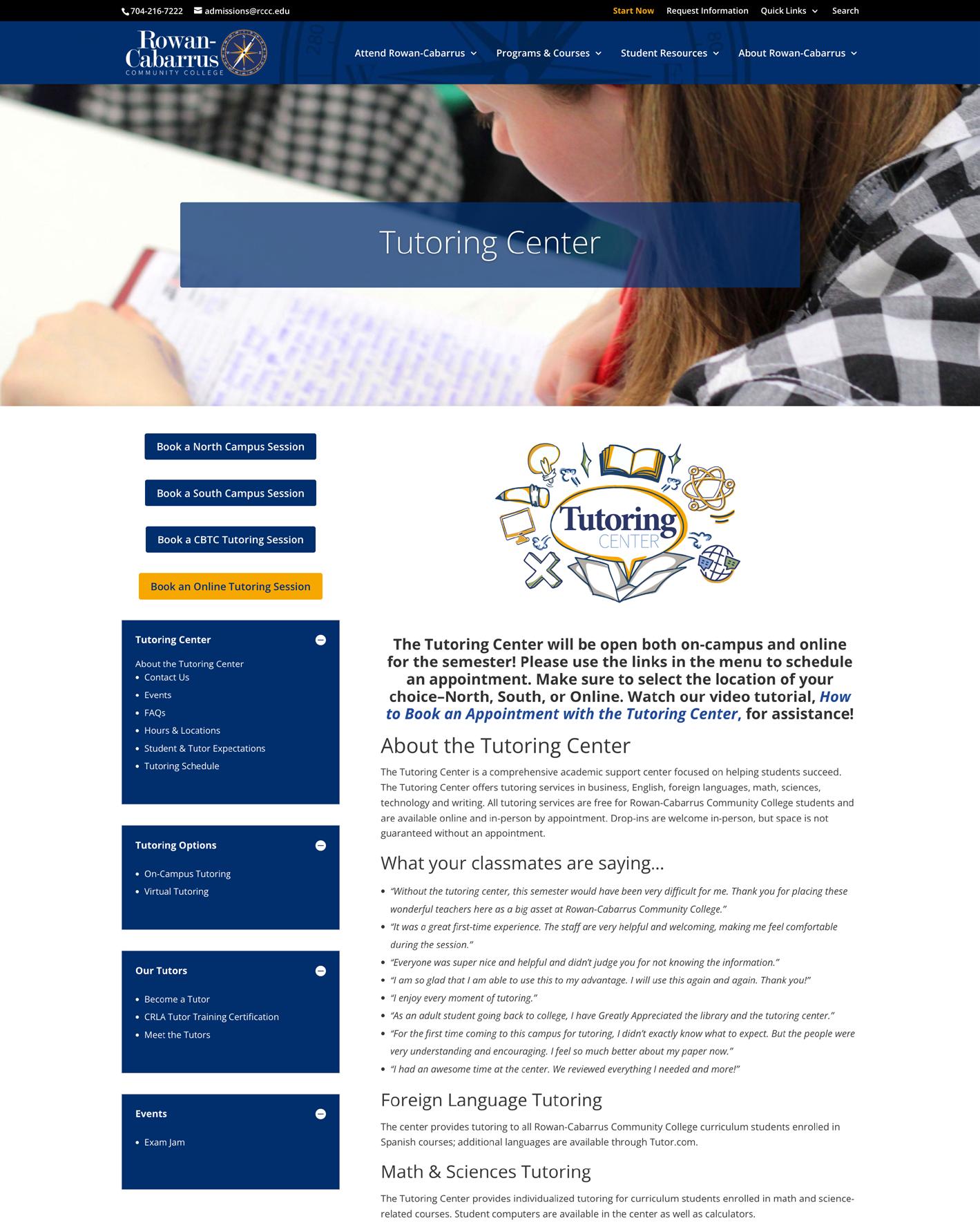
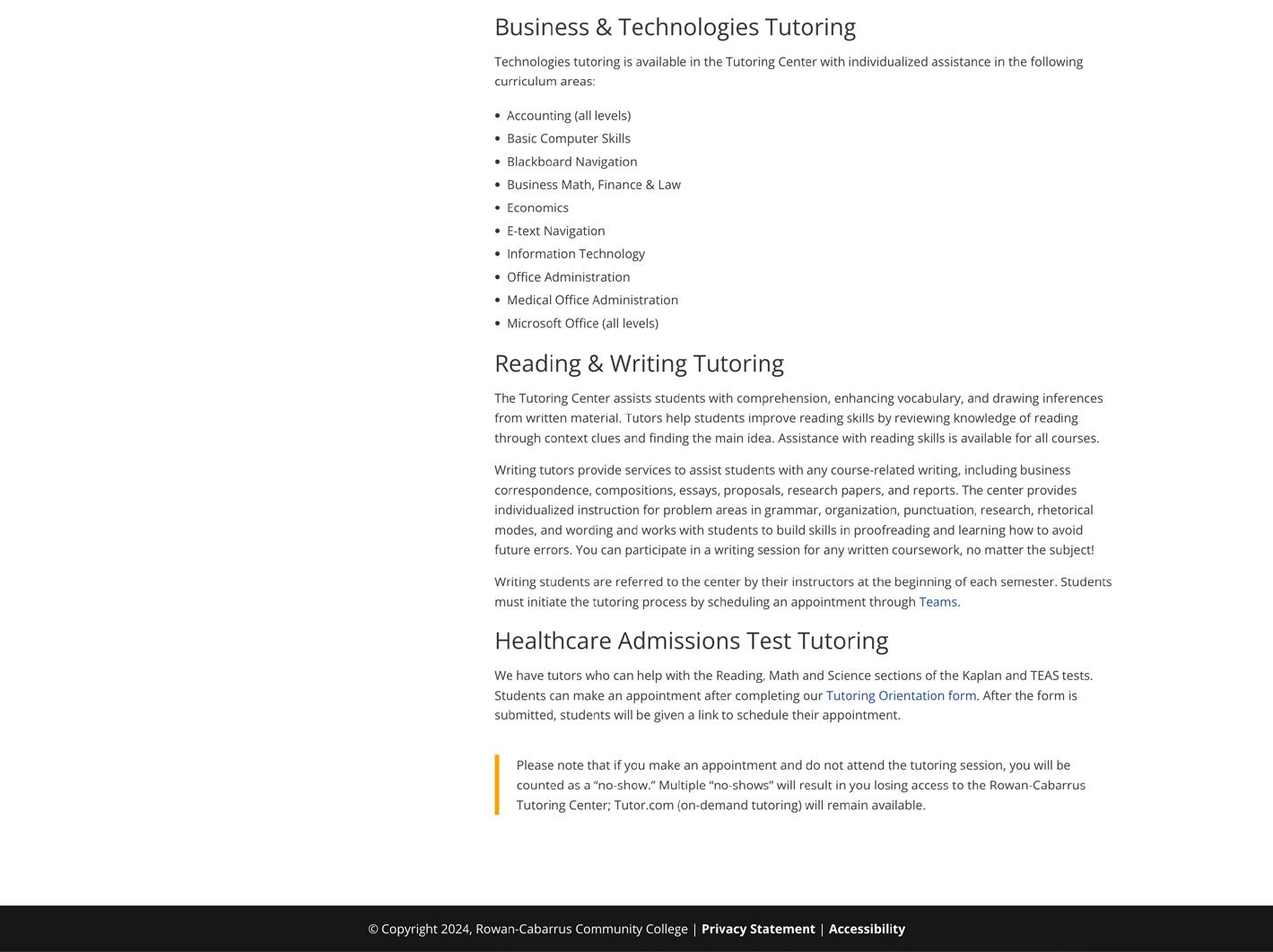

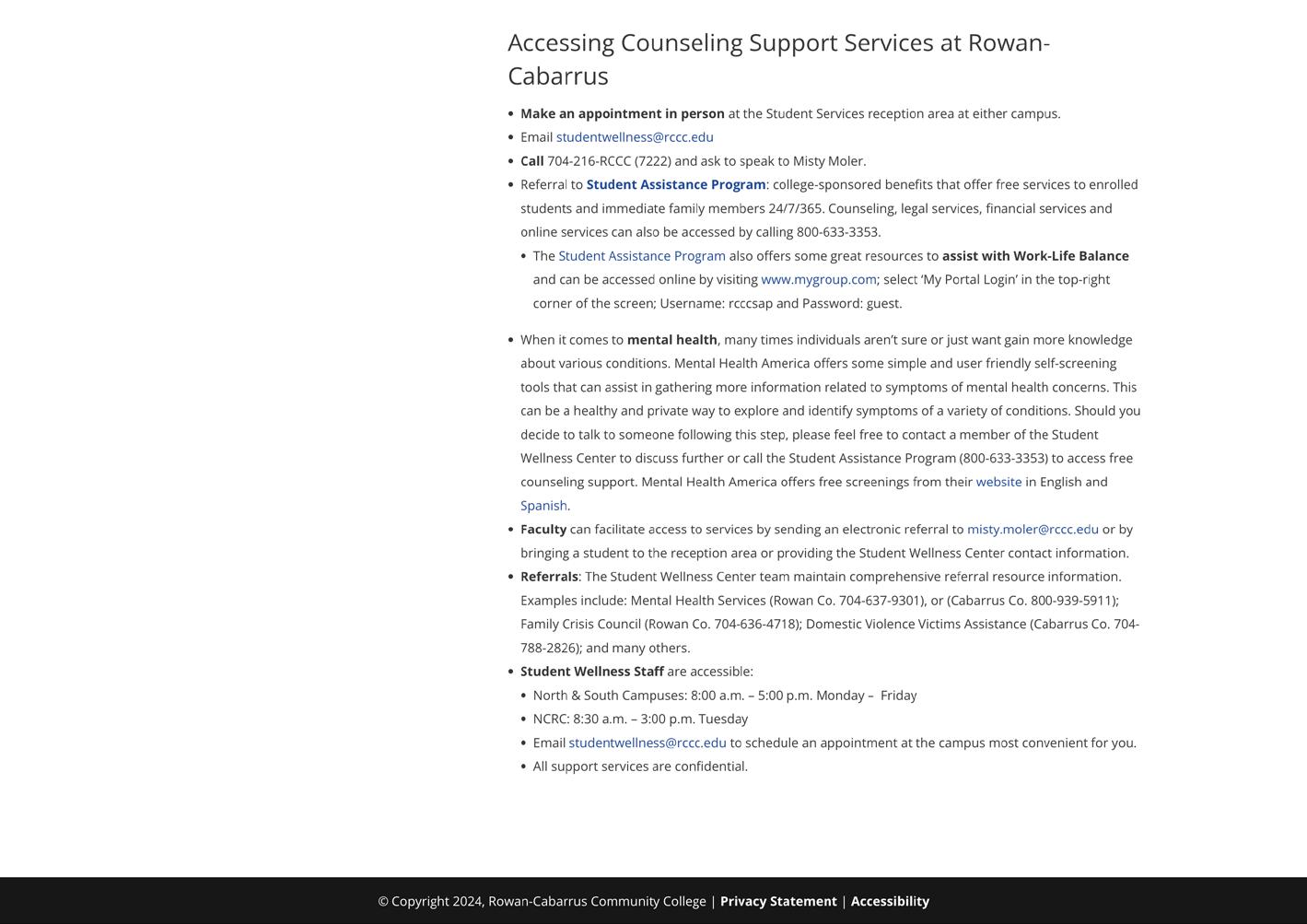

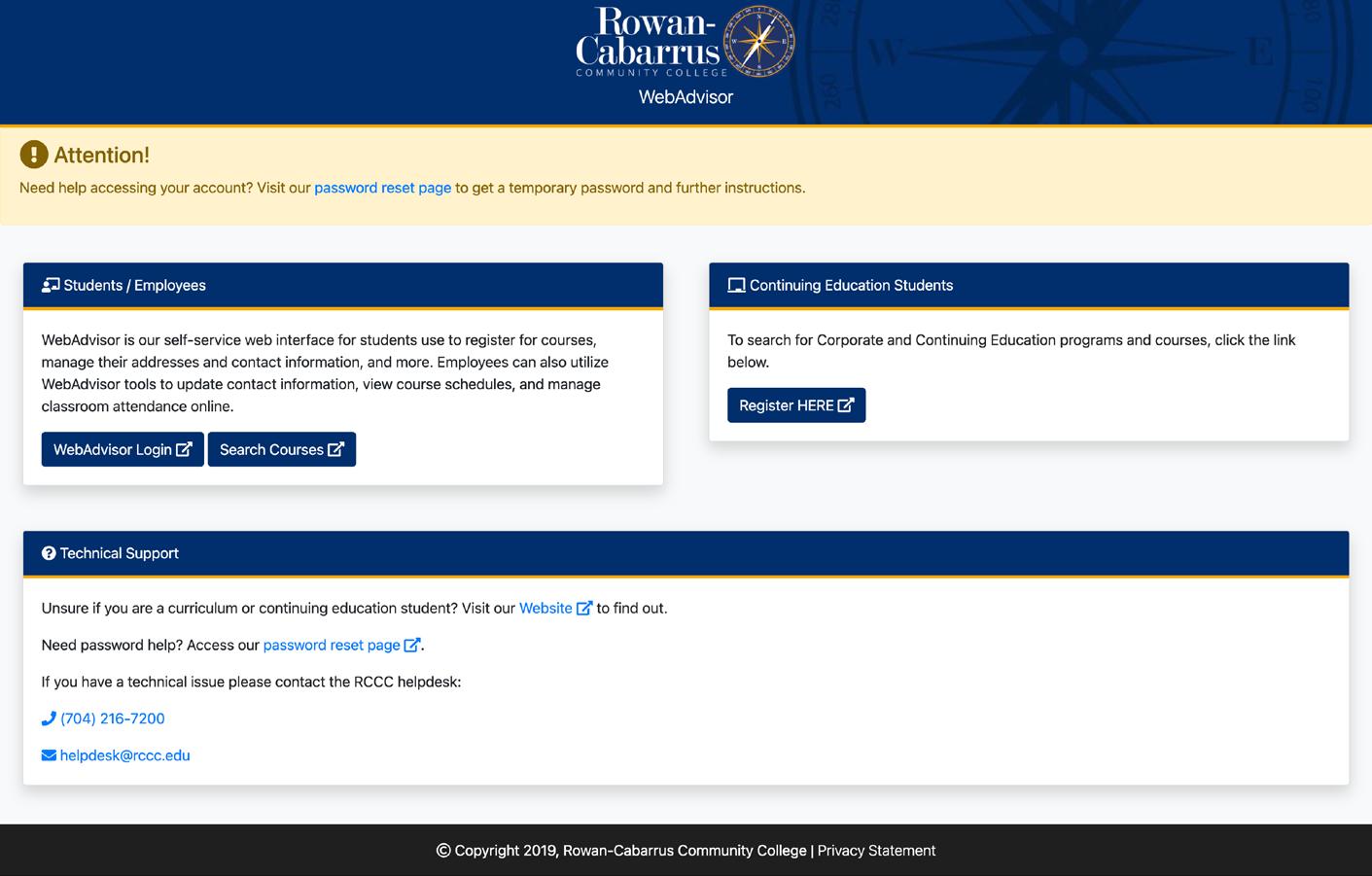
Appendix
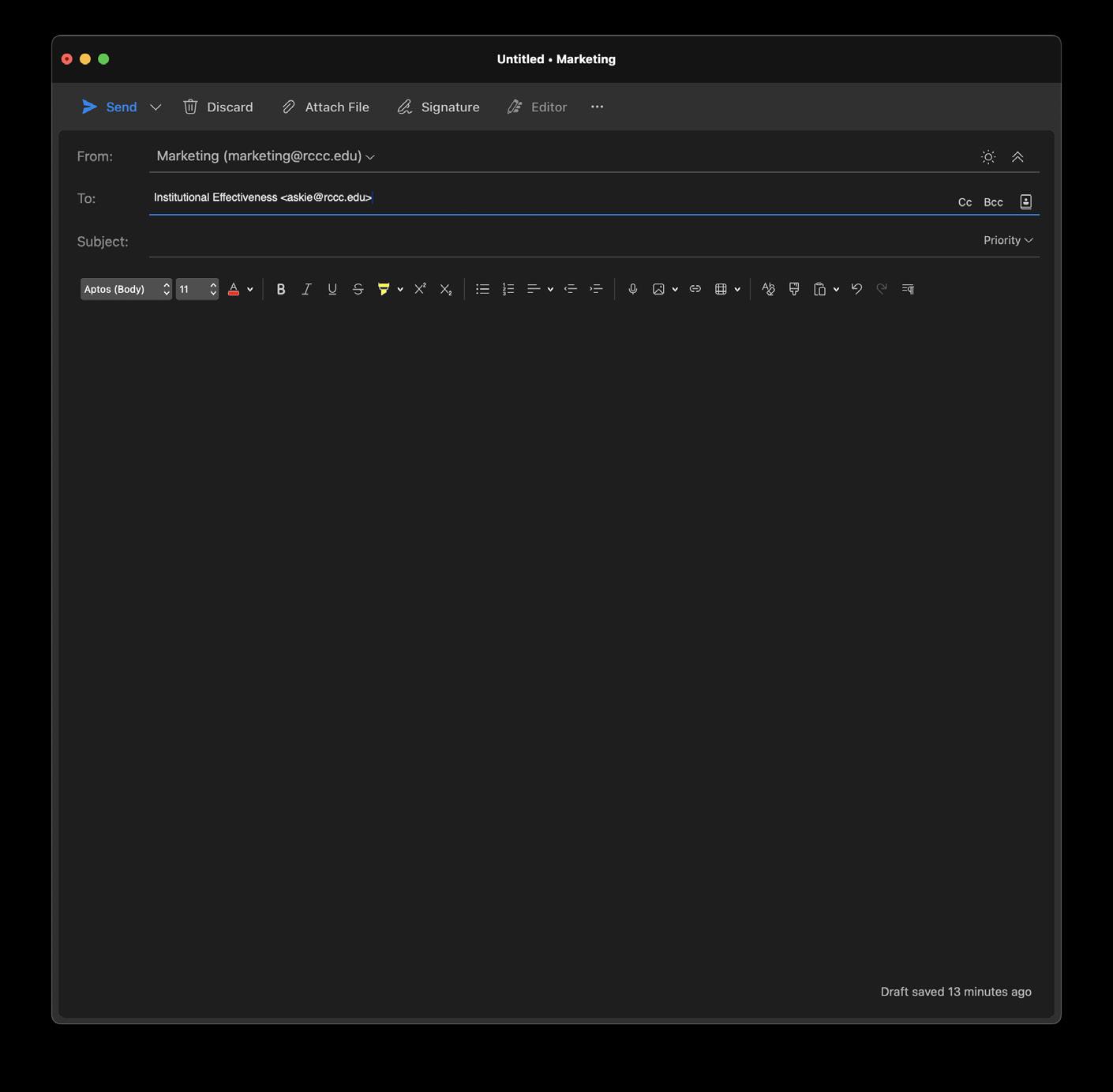
Emergency Management Handbook for Faculty and Staff
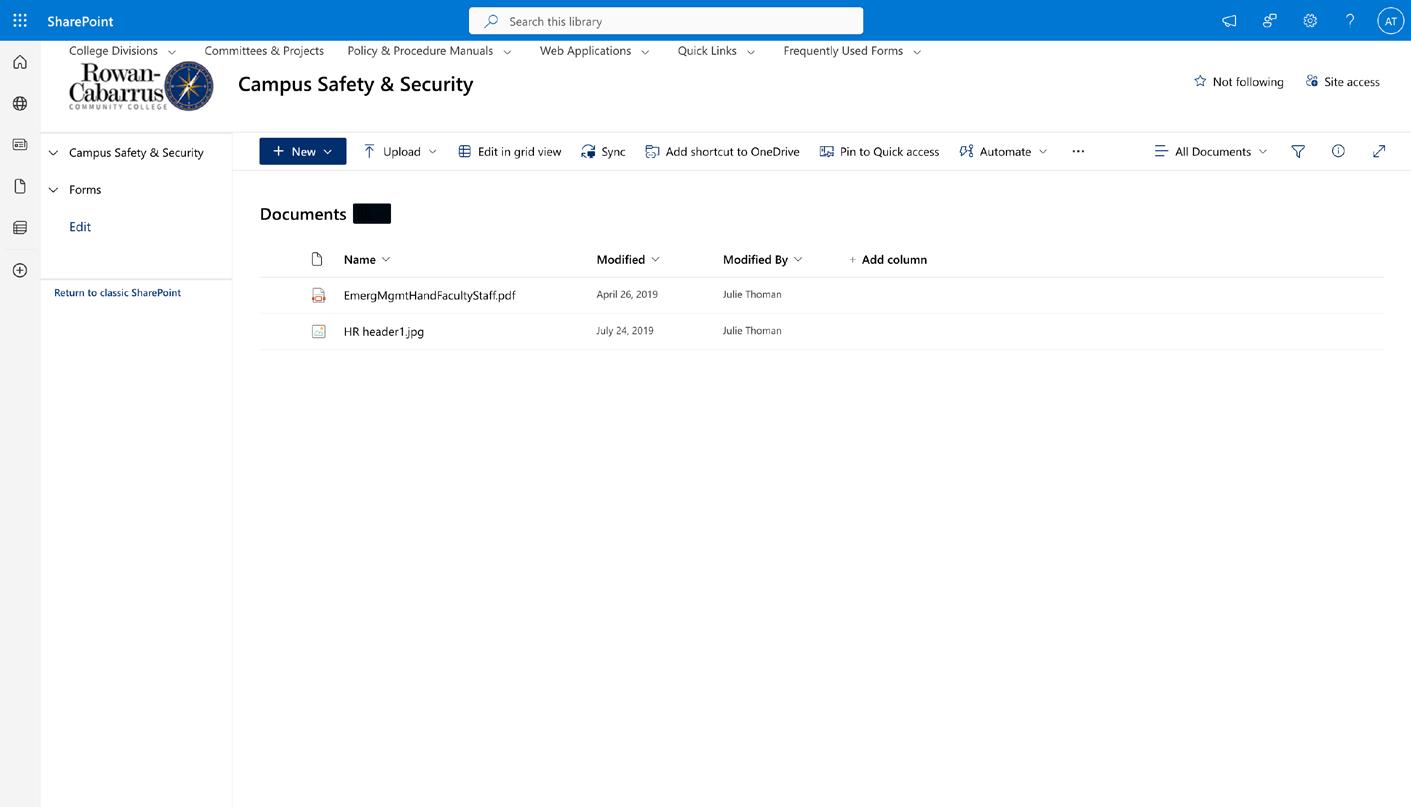
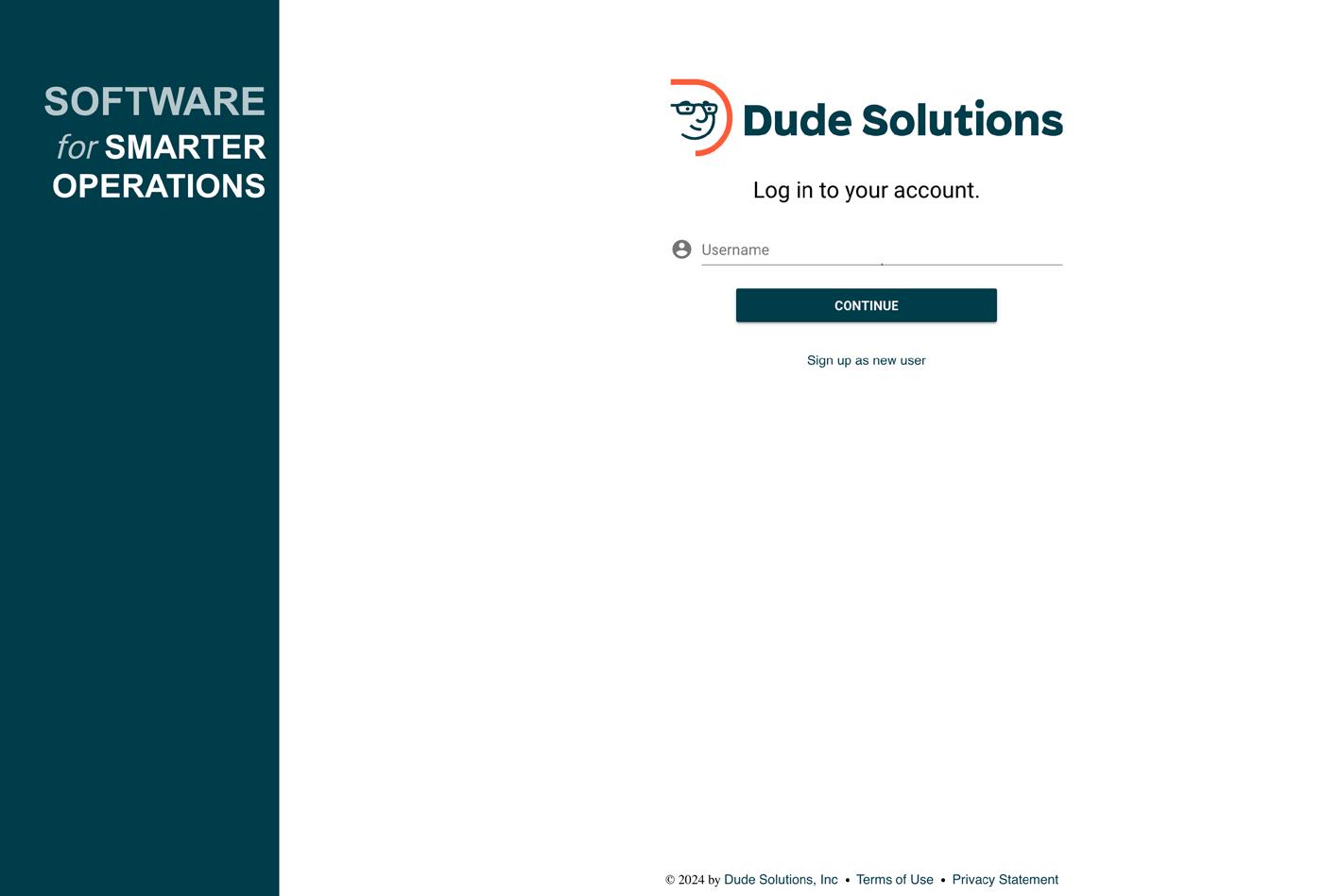
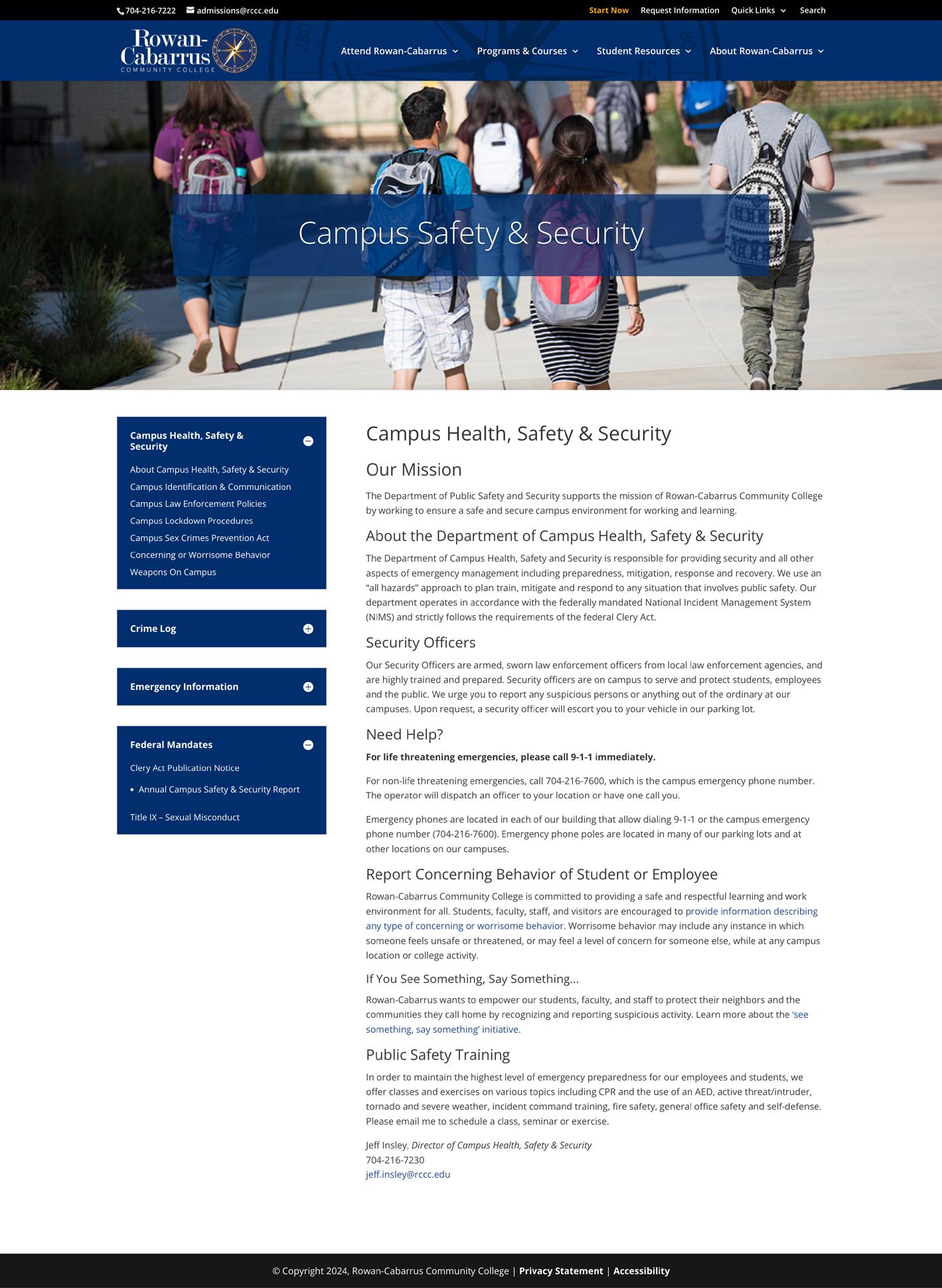
Student Life Webpage

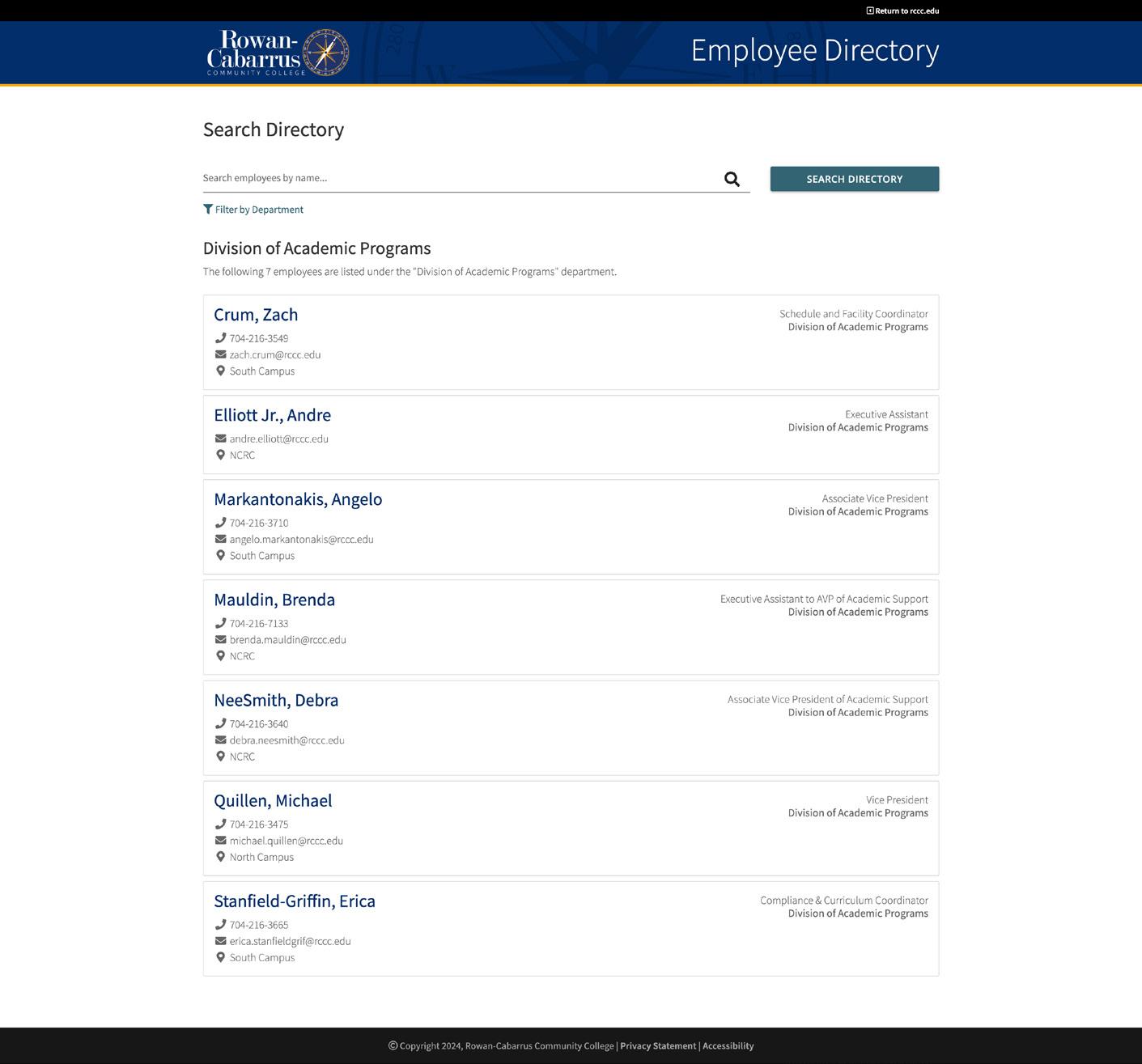
Academic Programs SharePoint - Forms
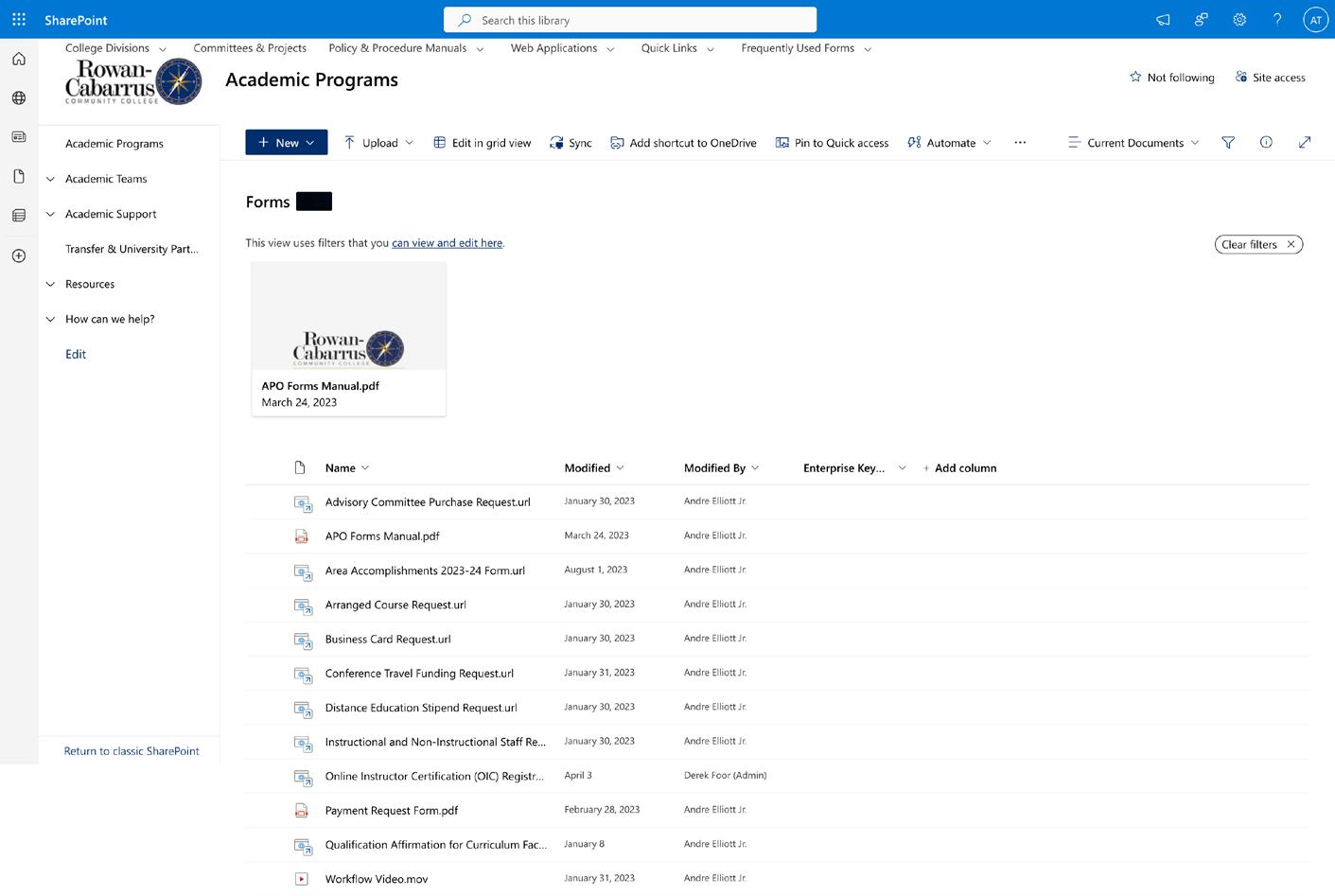
Academic Programs SharePoint - Advising Guide
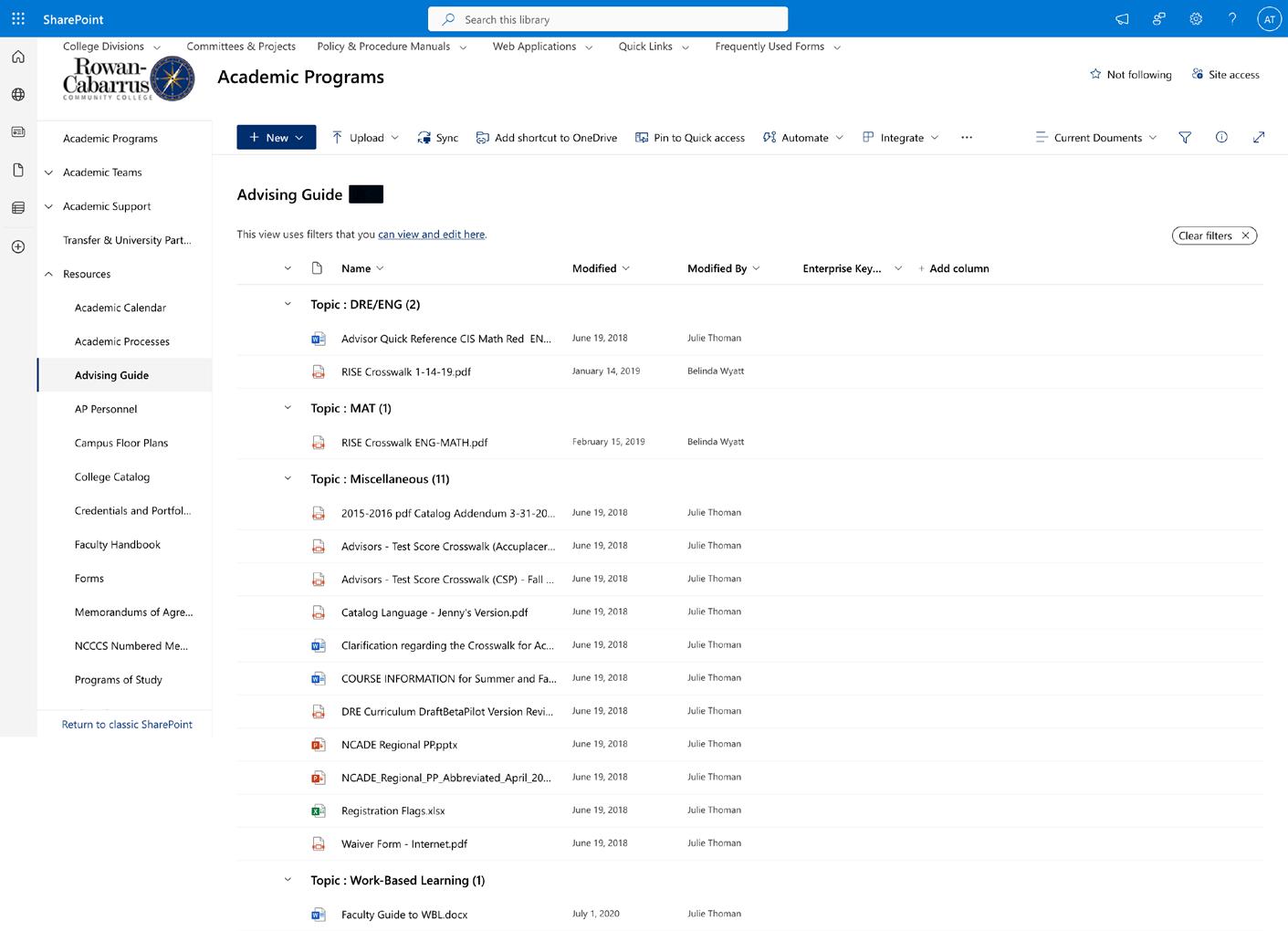
Office of the Registrar SharePoint - Faculty Forms
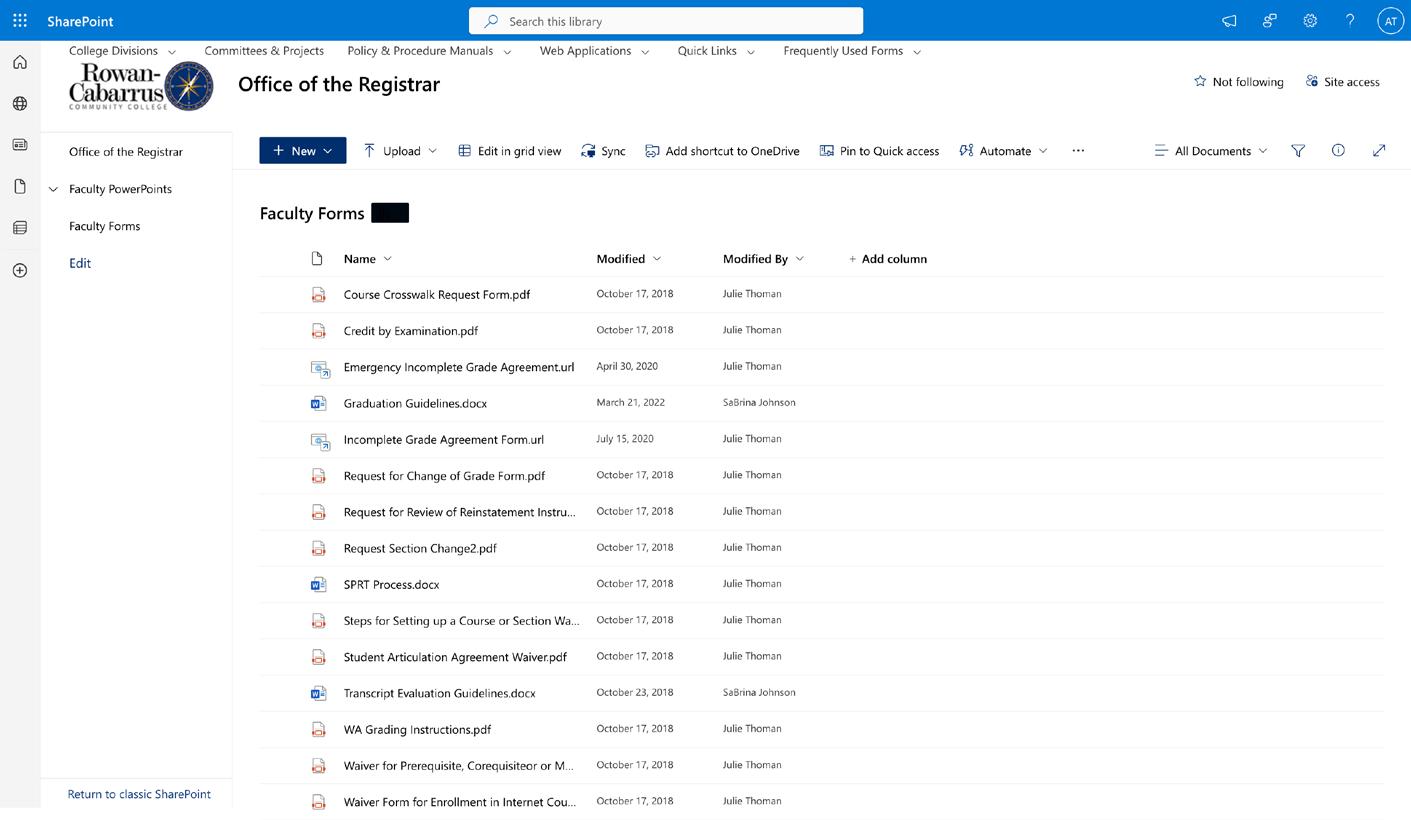
Finance and Business Office SharePoint Site to Frequently Used Faculty Forms
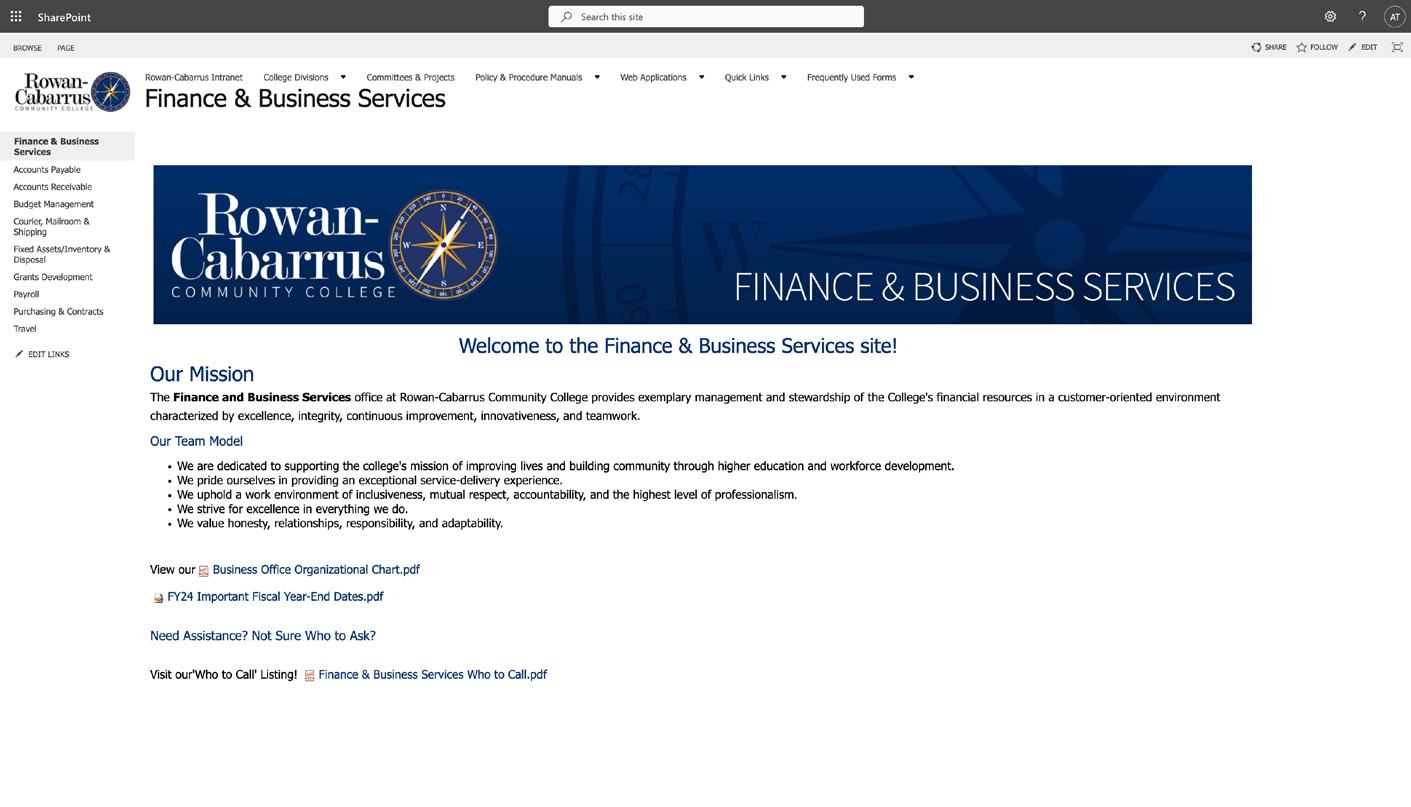
Academic Programs SharePoint site to Classroom Observation Forms
